The rules for Americans visiting Cuba in 2022

May 20, 2022 • 5 min read
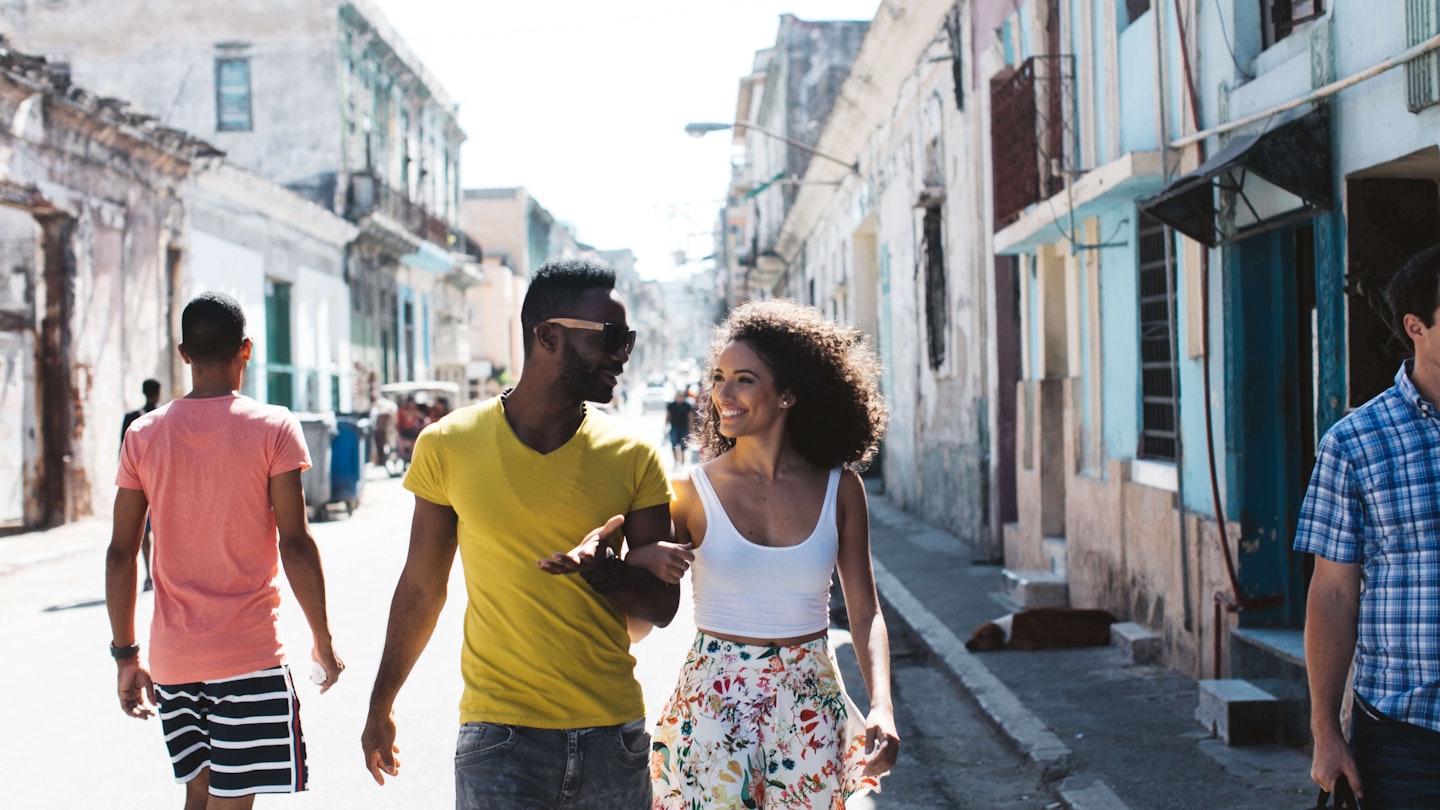
It may soon be easier for Americans to visit Cuba © Matt Porteous / Getty Images
The Biden Administration took several steps toward thawing US-Cuba relations on May 16, 2022, after five years of tightened restrictions. While the measures don’t fully restore the openings of the Obama era, they mark an encouraging start for struggling Cubans and aspiring US travelers.

What has changed?
Of direct interest to US travelers is the Biden Administration’s promise to expand authorized travel in support of the Cuban people. This includes opening up flights to airports beyond Havana (which were closed to US aircraft during the Trump era) and reinstating group people-to-people travel and other categories of group educational travel. Both measures will be good news to US travel agencies who have battled with increased red tape since 2017.
As yet, there is no word that the US will reinstate individual people-to-people travel, the category that led to a huge influx of US visitors to Cuba between 2016 and 2017. Nor have any Cuban state entities been removed from the US’s restricted list, meaning it’s still difficult for Americans to legally stay in Cuban hotels.
The directives have also lifted limits on family remittances (previously capped at $1,000 a quarter) to provide help in facilitating family reunions and supporting independent Cuban entrepreneurs.
Getting to Cuba from the US
Flying to Havana is one of the easier parts of the Cuba conundrum. As of May 2022, there are approximately a dozen flights a day between the US and Havana departing from the Florida cities of Miami, Tampa, and Fort Lauderdale. Operating airlines include American Airlines , Southwest Airlines , and JetBlue .
More Cuban airports will likely open up to US flights in the coming months.
The 12 categories of travel licenses for US citizens
US law states that US citizens can only travel to Cuba on a ‘general license’ based on one of 12 different approved categories , which include family visits, educational and religious activities, public performances and exhibitions, and the vague sounding 'support for the Cuban people.' Licenses are self-qualifying (there’s no long-winded paperwork), but you’ll be asked to state your category of choice in a signed travel affidavit when booking travel to Cuba. More details are available online from the US Treasury .
The vast majority of current visitors are Cuban Americans entering under the ‘family travel’ category. Independent travelers with no affiliations can qualify under the conveniently vague ‘support for the Cuban people’ category, which is the easiest option for people looking to explore the island. However, bear in mind that before you travel, you’ll need to draw up a detailed itinerary of your plans. Additionally, on your return, you’ll be required to keep all your travel receipts for five years.

The Cuba tourist card
To enter Cuba, all visitors need to present a completed Tourist Card — which serves a similar function to a tourist visa. These are usually available through your airline (ask when booking). Alternatively, you can purchase one through a Cuban travel agency. Costs range from US$50 to US$85, including processing fees.
Health protocols for travel to Cuba
Pre-travel COVID-19 tests and vaccination certificates are no longer required to enter Cuba from the US. Random COVID-19 tests may still be administered at the airport but there’s no mandatory quarantine unless you test positive. Departing US passengers will need a negative rapid-antigen test to re-enter the US. Tests can be procured at Havana’s José Martí International Airport before departure.
All arriving travelers must fill out an online D’Viajeros form containing information relating to public health and immigration. You’re also required to take out medical insurance that includes cover for COVID-19; this may be included in the cost of your air ticket from the US. Health officials make spot checks at the airport.

Booking travel to Cuba through a travel agency
If it’s your first time traveling to Cuba, it is highly recommended that you enlist the services of a specialist US-Cuba travel agency. Both Cuban Travel Services and Marazul offer comprehensive on-the-ground information and can help organize flights and accommodation.
Alternatively, you can join an organized trip, which takes a lot of the hassle out of traveling to Cuba. Long-time US-Cuba specialists, Insight Cuba are offering a three-night ‘Weekend in Havana’ and a seven-night ‘Classic Cuba Tour’ in 2022.
Where to stay in Cuba
American citizens are not currently allowed to stay in Cuba’s government-run hotels or use most state-owned enterprises. Instead, it’s best to opt for private accommodation such as apartments, B&Bs and homestays (known in Cuba as casas particulares ). Airbnb has lots of listings of accommodations that are open to US citizens.
For restaurants, stick to private paladares (family-run restaurants, often in the owner's home) where the food quality is better. To get around, use private guides and taxis. In doing so, you’ll be enthusiastically ‘supporting the Cuban people.’
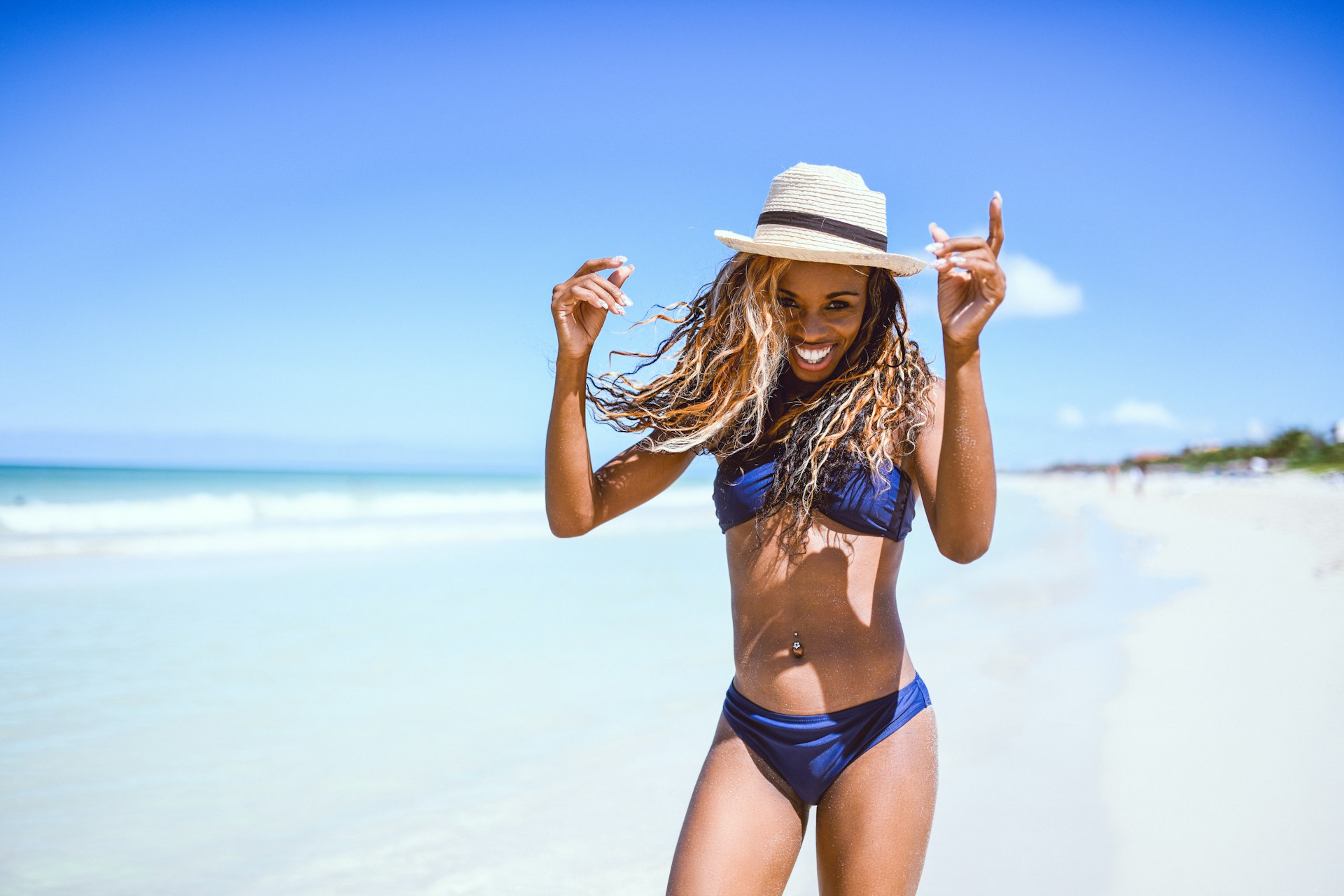
Money tips for Cuba in 2022
Credit cards linked to US banks don’t work in Cuba and the US dollar was taken out of circulation in June 2021. American travelers are best off arriving with plenty of cash in a non-US currency – the euro is the most favored foreign currency and is accepted by most private businesses, from casa particulares to restaurants and taxi drivers, meaning you won’t have to buy many Cuban pesos (which are worthless outside Cuba).
Beware: The Cuban economy is in a state of extreme flux. The current euro-peso black market exchange rate is over four times that of the banks.
In November 2021, Cuba introduced a tarjeta prepago (prepaid card) designed primarily to aid US travelers with American credit cards. You can purchase and pre-load a tarjeta prepago at a bank in Cuba or at the airport and use it to buy goods that can otherwise only be paid for with a credit card, such as medical services, cigars, and bus tickets. Cards can be loaded with amounts equivalent to US$1000, US$500 or US$200. However, you can only pay for the card in a non-US currency. Euros, Canadian dollars, and pounds sterling are all accepted, cash only.
This article was first published December 2020 and updated May 2022
Explore related stories
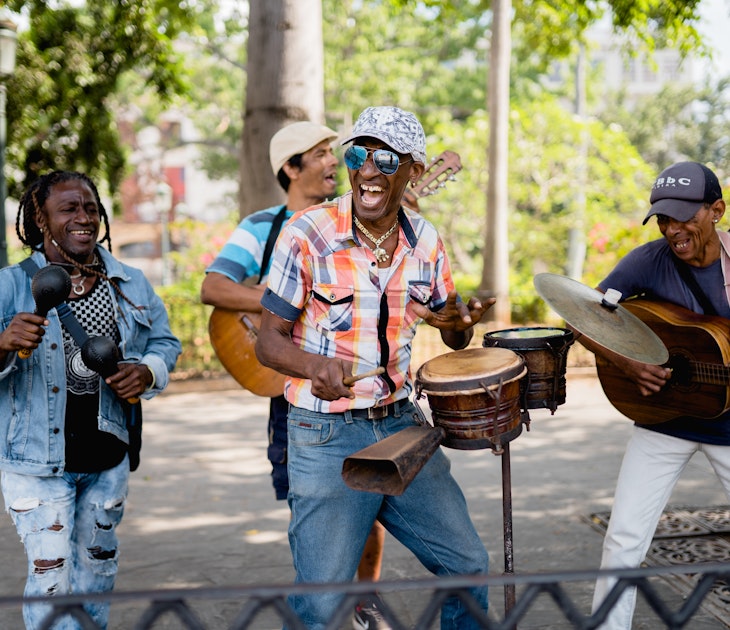
Destination Practicalities
Jan 9, 2024 • 4 min read
Choose the best time for your visit to Cuba with this seasonal guide to lively festivals, top beach weather and budget prices.
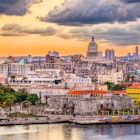
Jan 9, 2024 • 6 min read

Jan 7, 2024 • 10 min read
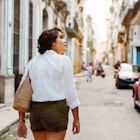
Jan 6, 2024 • 7 min read
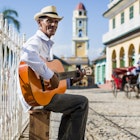
Jan 5, 2024 • 8 min read

Jan 5, 2024 • 4 min read
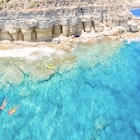
Nov 24, 2023 • 7 min read

Jan 6, 2023 • 7 min read

Jan 5, 2023 • 8 min read
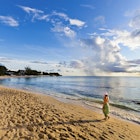
Oct 5, 2020 • 15 min read
Choose your language

Welcome to Cuba
More than you imagined
Plan your holiday to Cuba
Cuba Up-Close
Six Essential Tips for Your Trip to Cuba 2022
From alternative accommodation to bypassing the restrictive internet in Cuba, check out these six essential tips for your trip to Cuba.
Cuba up-close
When is the best time to visit Cuba?
Planning a visit to Cuba? The island offers sunny skies and activities year-round. Learn more about its seasons, weather, and cultural calendar.
Is it safe to travel to Cuba?
Here are some of the best safety tips to follow as you enjoy your trip, and use public transportation in Cuba.
Greatest Waterfalls in Cuba
Imagine finding yourself in Cuba, surrounded by an exuberant natural environment - where the vivacious green mountains stretch out into a splendid blue sky - while the fresh Caribbean seabreeze brightens your face. And on this tropical voyage, you discover a land of waterfalls on every corner of the island.
El Nicho waterfall, Sierra de Escambray
Photo: Shutterstock
Looking for some cool things to do?
Visit chinatown in havana.
Visit the only Chinatown in Cuba, right in Central Havana,
Dance to Your Own Beat at Havana World Music 2022
Havana World Music: Are you ready to break beyond the
Explore Varahicacos Reserve in Varadero
Indulge in the landscape of Cuba at Varahicacos Ecological Reserve,
Fábrica de Arte Cubano: A Unique Experience for Art Lovers
Havana houses one of Time Magazine’s Best 100 experiences: the
Cayo Coco: The Ideal Cuban Paradise
Of all the Cuban islands, Cayo Coco has some of
Where to Drink in Havana: Our Essential List of the Best Bars
Explore our essential list of the best bars in Cuba,
Sip and Dance Your Way Through Trinidad’s Nightlife
Things To DoSip and Dance Your Way Through Trinidad's Nightlife
Explore the Glittering Caves of Bellamar
Dive into one of Cuba's most dazzling adventures in the
Tarará Beach – Havana’s Best Kept Secret
Tired of typical tourist spots? Get to know Tarará beach,
LGBTQ+ Nightlife: Six Gay-Friendly Venues to Visit in Havana
Havana's LGBTQ+ scene is livelier than ever! Check out these
Top Four Jazz Clubs in Havana
Cuba’s capital has always enjoyed a lively jazz scene, and has produced legendary musicians. It’s time to visit Havana’s best jazz clubs!
La Zorra Y El Cuervo jazz club, Vedado, Havana
Photo: Alamy
Winter activities and tips!
History & Heritage
Visit the Museo de la Revolución
Wildlife & Nature
Ciénaga de Zapata
Castillo del Morro
Beaches & Islands
Hit the Beach at Tarará
Castillo del Morro: A Historical Fortress in Havana
Learn about the History of Cuba in the bay of
Ciénaga de Zapata: A Natural Cuban Treasure
Encounter the endemic flora and fauna of Matanzas Cuba, and
Visit the Museo de la Revolución, and Relive the Fight for Cuba
Havana’s Museo de la Revolución offers a thorough look at
The Cuban Cigar: Everything You’ll need to know
Learn about the curious and mysterious history of the Cuban cigar, how a Habano is made, and where you can buy quality tobacco like Cohiba cigars.
A Cuban woman with a cigar, Havana
Check Us out on Instagram
@govisitcuba, subscribe to our newsletter.
Get more travel inspiration, tips and exclusive offers sent straight to your inbox
I would like to get Visit Cuba newsletters in my inbox
Paradise for Your Inbox


Cuba Travel Guide for U.S. Citizens: What to Know Before You Go (Updated 2023)
Feb 3, 2023 | Caribbean , Destinations | 0 comments

Planning this trip to Cuba was the most challenging thing I’ve done to date in the name of travel. Out of all 26 countries, thousands of miles, from 5 years of traveling the world.
Once we landed in Havana, I knew that this place was unlike any I’d visited before.
Had I allowed the logistical challenge of traveling to Cuba as a US citizen deter me from visiting this country, it would have been my greatest mistake.
This Cuba travel guide for US citizens is up to date as of early 2023, based on my experience traveling to Cuba in December 2022.
In this post, I will cover Cuba travel FAQ and share how to visit Cuba legally as a US citizen or from a US airport.
Before you read, please note that there are sanctions from the U.S. government that restrict travel to Cuba.
It is the responsibility of each visitor to follow all laws and regulations, at home and abroad.
This website has a limitation of liability policy that applies to all posts, which you can read here .
This post contains affiliate links. See more in the disclaimer .
Can Americans Travel to Cuba?
Yes. And you can even do so independently.
The key is to visit legally, within the confines of OFAC (Office of Foreign Asset Control) regulations due to the embargo and sanctions.
IMPORTANT: These regulations also apply to non-US citizens that are departing from a US airport.

How to Travel to Cuba Legally
There are 12 categories of legal travel to Cuba under OFAC:
- Family visits
- Official business of the U.S. government, foreign governments, and certain intergovernmental organizations
- Journalistic activity
- Professional research and professional meetings
- Educational activities
- Religious activities
- Athletic competitions by amateur or semi-professional athletes or athletic teams
- Support for the Cuban People
- Humanitarian projects
- Activities of private foundations or research or educational institutes
- Exportation, importation, or transmission of information or information materials
- Certain authorized export transactions
Source: U.S. Department of the Treasury
The most common is Support for the Cuban People, which requires the following:
§ 515.574 Support for the Cuban People. (a) General license. The travel-related transactions set forth in § 515.560(c) and other transactions that are intended to provide support for the Cuban people are authorized, provided that: (1) The activities are of: (i) Recognized human rights organizations; (ii) Independent organizations designed to promote a rapid, peaceful transition to democracy; or (iii) Individuals and non-governmental organizations that promote independent activity intended to strengthen civil society in Cuba; and (2) Each traveler engages in a full-time schedule of activities that: (i) Enhance contact with the Cuban people, support civil society in Cuba, or promote the Cuban people’s independence from Cuban authorities; and (ii) Result in meaningful interaction with individuals in Cuba. (3) The traveler’s schedule of activities does not include free time or recreation in excess of that consistent with a full-time schedule. Source: Code of Federal Regulations
It will not be a vacation where you go to the beach and prop your feet up, buy things wherever you want, and stay wherever you want.
You must have a full-time schedule of activities that result in meaningful engagement with Cubans.
For us, that looked like many, many art tours and private gallery visits where we connected with local artists and had countless meaningful, deep conversations.
No topic was off-limits.
Everyone opened up (including us) and shared our passions, life experiences, opinions, and learned about one another. And yes, we talked about politics.
We were on the go, all day, every day.
And we didn’t really spend time with other foreigners. We crossed paths with foreigners a couple times, but everyone else we spoke to and spent time with was Cuban.

Casas particulares and paladares
Aside from your full-time schedule, you should also stay in casas particulares and eat at paladares.
A casa particular is a room in someone’s house. It’s been a normal way to travel in Cuba for years. There’s an infrastructure around it. You can find them on Airbnb.
We highly recommend this casa particular in Havana and this casa particular in Viñales.
Paladares are privately-owned small restaurants. Download A La Mesa for a list of restaurants all over the country. Each listing shows if it’s privately-owned.
The app also works offline, which will make your life much easier in Cuba.
Pro tip: If you’re also a vegetarian, make sure you try Camino al Sol ! It’s an all-vegetarian paladar in Havana.

What you are banned from doing in Cuba
You cannot spend money in OR interact with any of the places on this list from the US Treasury Department.
Many are hotels, so pay attention!
I copied and pasted these into a list to have on my phone, then accessed it offline while in Cuba to ensure there wouldn’t be any issues.
Is Cuba safe to visit?
Absolutely.
As a young woman who visited 25 countries before going to Cuba, I’ve been in a few…sticky situations. Cuba was amazing.
I never worried about being robbed and just felt at ease the entire time I was there. I tend to be a more anxious person, so that’s new for me.
This is my personal experience and I was not in Cuba as a solo female traveler, so yours could be different.
Is Cuba open for travel right now?
As of late 2022, visitors no longer need to show proof of Covid-19 vaccination or testing before entering Cuba. We brought our vaccine cards just in case, but no one asked to see them.
Please refer to this government site for updated information before your visit.
On our way back to the United States, we did have to share contact tracing information with our airlines using a form before we could check in. It was quick and easy.
Although many online sources claim masks are mandatory in certain settings, we did not see any places where masks were required in December 2022.

Accessing Money in Cuba: 2023 Updates
Everything you need to spend in Cuba must be in cash.
Because of the sanctions, your credit and debit cards will not work in Cuba.
If you try to use them, your bank will probably lock your account and it will take a lot of effort to get it unlocked.
In prior years, you would need to convert money to Cuban pesos before using it. Euros were the best to have because CADECA (the government exchange houses) charged a higher fee on USD exchanges.
As of late 2022, everywhere we went accepted U.S. dollars as payment. This was highly unexpected and deviated from every piece of advice I read online before leaving for Cuba.
However, it is still good to have some pesos for a fairer exchange rate. Some menu exchange rates were awful.
When we were in Cuba, we typically got 150 CUP for 1 USD. The CADECA rate was 110.40 CUP for 1 USD.
We exchanged money at our first casa particular and spent USD on activities, private taxis, and one of our casas. We usually spent pesos on art, food, and coffee.
Make sure you get cash in plenty of small bills. Twenties, tens, fives, and ones were useful. Anything larger than that will be annoying to deal with.
If your bank will only give you large bills, go to Publix and ask the customer service to break them when they’re not busy. Works like a charm!

Is it safe to exchange money on the street in Cuba?
You will be offered money exchange on the street wherever you go in Cuba. Just say “No, gracias,” and move on.
As a general rule of thumb, it is not safe or advised to exchange money on the street. This goes for wherever you are in the world.
The main reason it’s unwise to do this is forged currency. If it came from some random person, it may be counterfeit.
A local friend taught us how to know your Cuban pesos are real. Hold the bill up to the sun, and check the watermark.
The watermark will have a number on it, and that number must match the value of the bill.
If it’s a 100-peso bill, the number in the watermark should say 100.
Again, I do not recommend exchanging money in the street. We didn’t on this trip because we were able to get pesos from the front desk of our casa particular.
If you’re ever concerned about any bills you were given as change, use the tip from our friend for some peace of mind.
I also want to make it clear that we were never given counterfeit bills as change while in Cuba, but these things can happen anywhere.
You’re more vulnerable as a foreigner, because you don’t know exactly how the money is supposed to look.

Getting WiFi in Cuba
If a travel guide says there are only one-hour WiFi cards, it is outdated.
Now, you can access WiFi on a one-hour or a five-hour card.
WiFi is now cheaper in Cuba—it was $5 USD per hour; now, it’s $1 USD per hour.
We only needed one 5-hour card per person for the whole week.
Instead of waiting in the ETECSA line, we bought them from our first casa particular .
Overall, our Cuba WiFi experience was much easier than what we expected.
Don’t expect to be online all the time, but WiFi access is not as difficult as prior years.
Pro tip: The two main apps I highly recommend to download BEFORE you leave for Cuba are A La Mesa and Maps.me . Both work well offline and will save you such a headache.
On Maps.me specifically, also download the maps of each city/town you will visit in Cuba. In our case, I downloaded the maps for Havana and Viñales. When you have Internet access, put your casa particular addresses in a Note on your phone, so you copy and paste them into Maps.me whenever you need to. Same goes for any attractions you know you want to see.
If you want (and if your phone is unlocked), you could get a Cuba sim card, which comes with data. I don’t see the point for a one-week trip, but to each their own.
You can reserve those online in advance from Suena and pick them up at the José Martí airport (in Havana). If you go this route, you want the Tourist SIM Card from the top menu.

Can you drink the water in Cuba?
In short, no.
There was bottled water for sale everywhere on our trip in December 2022, but I read online before leaving that you can’t bank on that.
Instead, I bought this LifeStraw to have filtered water and it was the best travel purchase I’ve made. Ever.
Our Viñales casa particular hostess took one look at that bottle and pointed me to her giant drinking water spigot for us to have freely.
She was already familiar with the water situation for foreigners and told me it was smart to bring a reusable filtered bottle.
Highly recommend one of these !

Can you check in online for flights to Cuba?
There are too many documents the airlines must verify before they can issue a boarding pass.
You will also need a paper boarding pass for your Cuban health insurance, often included in your departure airfare.
Do you need to speak Spanish to visit Cuba?
Out of all Spanish-speaking countries I’ve visited, Cuba is the main one you need at least some language skills to visit.
There are people who speak English, especially young people, but it is not the norm.
If you don’t speak Spanish and you’re not traveling with a friend who does, download Google Translate for offline use before you arrive.
It won’t be ideal, but it will work when you need language help.
The best advice I can give is to travel with someone who speaks Spanish fluently. My best friend said many times while we were in Cuba that she would be toast without my language skills.

Can I bring Cuban cigars and rum back into the USA as souvenirs?
The answer used to be yes, as long as you purchased them from a private shop instead of a stated-owned one.
That answer is no longer the case, as of late 2022.
Now, you cannot bring any rum or cigars into the USA from Cuba, no matter how small the amount is or where they were purchased within Cuba.
When you arrive back into the USA, Customs and Border Patrol will ask if you have any rum or cigars. If you do, assume they will be confiscated.
What to Pack for Your Cuba Trip
I pack carry-on only and found Cuba to be one of the easier countries to pack for. The climate in December was perfect, with 80s in the day and 60s-70s at night.
Here is a short packing list of the things you need before going to Cuba:
- Mosquito repellent, because the insects in Cuba will eat you alive (I use these .)
- Comfortable shoes for lots of walking
- Cardigan or light sweatshirt
- Flowy/comfortable clothes (You can see one of the outfits I packed below.)
- One active wear outfit for hiking/horseback or bike riding (if you’re going to Viñales)

I hope this Cuba travel FAQ was helpful for you. I know how stressful it can be to figure out what to do when planning. If you have any questions, comment below and I’ll do what I can to help!
Read more Cuba travel guides:
- Cuba Pre-Departure Checklist
- What to See and Do in Cuba (Havana and Viñales)
- At Dusk in Havana, I Fell in Love
- Havana, the Art Sanctuary
- When It Destroys, It Starts with Us
- The Elephant in the Room: Socialism in Cuba
Save on Pinterest

Share this:
- Click to share on Facebook (Opens in new window)
- Click to share on Twitter (Opens in new window)
- Click to share on Pinterest (Opens in new window)
- Click to share on Reddit (Opens in new window)
Leave a Reply Cancel reply
Hi, I'm Sarah

Welcome to my oasis! I am a writer and budding entrepreneur with a love for caffeine, capital gains, and seeing the world. If I'm not writing, you can find me reading a good book, trying out a new vegan recipe, or adding to my coffee mug collection. My goal in life? To see every country in the world. Come along for the ride!
clock This article was published more than 1 year ago
Biden’s revised Cuba policy creates more options for U.S. travelers
The united states just approved flights to airports beyond havana and will restore the group tours banned under trump.

Americans who want to travel legally to Cuba will have more options after the Biden administration announced it was undoing some of the restrictions President Donald Trump imposed before the pandemic.
While a timeline for all of the changes is not yet clear, travelers should eventually be able to choose from flights to more destinations and take the kind of group-based educational trips that have been off-limits for nearly three years.
Under an order issued Wednesday by the U.S. Transportation Department, airlines will again be allowed to fly to Cuban destinations beyond Havana, an avenue that was cut off in late 2019. Public charter flights will also be permitted to go to airports outside Havana after being suspended in early 2020.
The Transportation Department issued the order rescinding the Trump-era restrictions after a request this week from Secretary of State Antony Blinken. He wrote that scheduled and charter air services could resume “effective immediately” once the department took action.
That formal request followed a May 16 announcement that the Biden administration was taking measures, including allowing the additional flights, to “increase support for the Cuban people in line with our national security interests.”
As Biden eases Trump’s sanctions, Cubans hope for an economic lift
Peggy Goldman, president and co-owner of two travel companies that bring visitors to Cuba — Friendly Planet and Insight Cuba — called the permission to add flights “wonderful news.”
“It makes it possible to enjoy much more of the island, and having these additional flights is a hallelujah moment for us,” she said. She added that her companies have been “badgering” airlines on a daily basis about increasing service.
U.S. carriers that offer scheduled flights to Havana, including American Airlines, JetBlue and Southwest, told The Washington Post this week — before the DOT’s order — that they did not have any additional services to announce. American Airlines flew to five destinations in addition to Havana until December 2019, and JetBlue once flew to three cities beyond the capital city.
“While we do not have any news to share at this time regarding changes to our operations in Cuba, we regularly evaluate new opportunities throughout our network,” JetBlue said in a statement.
Cuba reopened to visitors in November after closing its borders earlier in the pandemic.
Can Americans travel to Cuba? Yes, but it’s complicated.
U.S. officials have said that a popular authorized way for groups of travelers to visit Cuba — called “people-to-people” trips — will be back at some point. The Trump administration eliminated the option in mid-2019. The State Department said it would reinstate the option, along with other categories of group educational travel and some additional travel connected to professional meetings and research.
“We’ll certainly ensure travel is purposeful and in accordance with U.S. law. And we’ll note something that President Biden had said often, which is his belief that Americans are the best ambassadors for democratic values,” a senior administration official said on background during a press call last month. “And facilitating group people-to-people travel will allow for greater engagement between the American people and the promotion of their democratic values.”
The State Department did not release a timeline for reopening that category of travel, but it said in a statement that the administration is “working expeditiously to implement these changes, via regulatory amendments and other steps on an expedited basis.”
Collin Laverty, founder of Cuba Educational Travel, said people-to-people trips were a prominent way to visit Cuba before the Trump administration prohibited them. He described those trips as “having a full-time schedule that involves meaningful interaction with the Cuban people” — though independent tourism is not allowed.
Americans have been allowed to visit the island under categories that remain legal, including family visits, religious activities, competitions, educational activities and professional research, and meetings. After the Trump administration eliminated the “people to people” option, first for individuals and then for groups, most travelers opted to visit under the “support for the Cuban people” category.
Under that option, travelers need to have a full-time schedule of activities that enhance contact with locals, support civil society in Cuba, result in meaningful interaction with residents or promote independence from Cuban authorities, The Washington Post reported in 2019.
2019: Trump administration ends group travel to Cuba by Americans
The two categories were similar, but supporting the Cuban people required more direct aid to locals on the ground. Some tour operators told The Post when the changes were first announced a few years ago that they were skipping attractions such as Ernest Hemingway’s house and famous cemeteries. To keep their programming in compliance, they said, they would meet with craftspeople who make humidors instead of going to cigar factories, and they would visit artists in a studio cooperative instead of going to a museum.
David Lee, founder of Cultural Cuba, has always provided trips that meet the requirements of supporting the Cuban people and calls it “the best way to go by far.” But still, he and others said, the news about Trump restrictions being dropped had led to an increase in inquiries.
“Some of the changes that the Trump administration made definitely made people think they could not come to Cuba,” he said. “If this announcement has people believing, ‘Oh, it’s open again’ — even though it was always open ... and at least leads people to put Cuba back on their list as a destination, awesome.”
Laverty said he expects the return of U.S. travelers to Cuba to be slow, noting that he doesn’t see any regulatory changes that would lead to an “avalanche” in demand.
While the Biden administration’s goal is to expand authorized travel to Cuba, the State Department said the recently announced moves are not a return to the Obama-era policies that allowed cruise ships to visit the island and individual travelers to embark on people-to-people trips.
In Cuba, a desperate search for milk
Other Trump crackdowns prohibiting travelers from staying in military- or government-owned hotels remain in effect. They pose continued challenges to travelers and tour groups who have to find accommodations without those government or military ties.
“With new flights and group People to People programs being announced, more travelers will be able to visit Cuba safely but they will need more safe places to stay,” Michael Zuccato, CEO of Cuba Travel Services, said in an email.
Laverty said the last decade has brought “incredible development” in private-sector lodging, including privately owned apartments, rooms and boutique hotels. His company will sometimes split groups between multiple properties if needed.
“It definitely adds an extra logistical layer,” he said. “Trying to look at the positive side, it’s a really cool experience” where guests get to interact with their host and learn more about what it’s like to live in Cuba.
With economic hardships and severe shortages in Cuba that led to widespread protests last year, Laverty said he was concerned about what the travel experience would be like when his company started bringing Americans back earlier this year.
“What we’ve found over the last few months is U.S. travelers have really been exposed to shortcomings and challenges and also support Cubans through their travel and get an honest picture of the good and the bad in Cuba and still have a really great experience,” he said.
More travel news
How we travel now: More people are taking booze-free trips — and airlines and hotels are taking note. Some couples are ditching the traditional honeymoon for a “buddymoon” with their pals. Interested? Here are the best tools for making a group trip work.
Bad behavior: Entitled tourists are running amok, defacing the Colosseum , getting rowdy in Bali and messing with wild animals in national parks. Some destinations are fighting back with public awareness campaigns — or just by telling out-of-control visitors to stay away .
Safety concerns: A door blew off an Alaska Airlines Boeing 737 Max 9 jet, leaving passengers traumatized — but without serious injuries. The ordeal led to widespread flight cancellations after the jet was grounded, and some travelers have taken steps to avoid the plane in the future. The incident has also sparked a fresh discussion about whether it’s safe to fly with a baby on your lap .

No products in the basket.

21 things you need to know before travelling in Cuba
Updated On 14th January, 2022
Are you going to Cuba and looking for top tips for travelling in Cuba? Then look no further! In this blog post, I’m going to highlight all the best Cuba travel tips and everything you need to know before travelling to Cuba, one of the best places to visit in North America. We’re going to cover everything from what to pack before you go, currency when you arrive, what to expect from the food, and more!
Cuba is a fascinating country that is on many people’s bucket lists. A visit to this nation is guaranteed to feel like a time traveling experience, with countless, colourful old towns to visit, and vintage cars that go back to the 1930s to ride in.
On top of its rich and visible history, Cuba boasts a wide variety of natural beauty, from waterfalls to rainforests, mountains to wetlands and of course, the white sand beaches and turquoise waters typical of any Caribbean location. This, all combined with the endless music, mojitos and salsa dancing spilling onto the streets, easily makes this country one of my favourite destinations in the world.
However, travelling in Cuba tends to be slightly different to other places, so if you’re planning a trip to this beautiful Caribbean island, here are my Cuba travel tips including everything you need to know before you go…
- St Lucia: the Body Holiday
- The best things to do in Costa Rica
- The best outdoor adventures in Argentina
- 15 best USA National parks to visit
- A 2-day itinerary for Zion National Park
- Cenote diving on the Yucatan Peninsula in Mexico
- The best things to do in Argentina
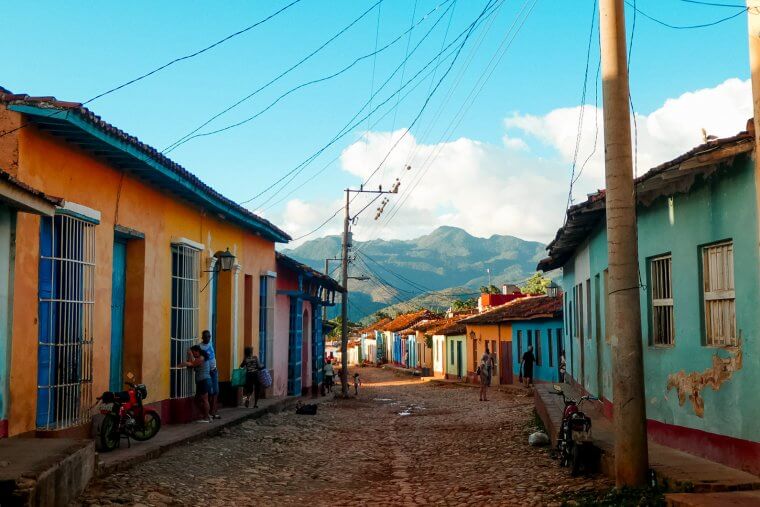
Cuba travel tips: 21 things you need to know...
1. visit cuba in shoulder season for the best balance of weather and prices.
If you’re wondering when to visit Cuba or when the best time to visit Cuba is, then I would say shoulder season, in March / April.
Cuba has a hot, sunny, tropical climate with dry and wet seasons: the dry season runs from November to April, the wet season from May to September. However, even during the wet season, you can still expect hot temperatures – people who travel at this time say the rain doesn’t last long!
Peak times to travel to Cuba are mid-December to mid-March, and all of July and August.
March & April are the best months to visit Cuba if you’re looking for a good balance of nice weather and reasonable prices without too many crowds!
2. Check visa requirements for Cuba
Anyone who does not have Cuban residence is required to have a visa to travel in Cuba. You can apply for the visa through the Cuban embassy, through your airline, or through several websites. Find out more details through your airline or your local government website.
Note that travel from the US to Cuba for solely touristic purposes is banned, and you need to travel for one of these 12 reasons .
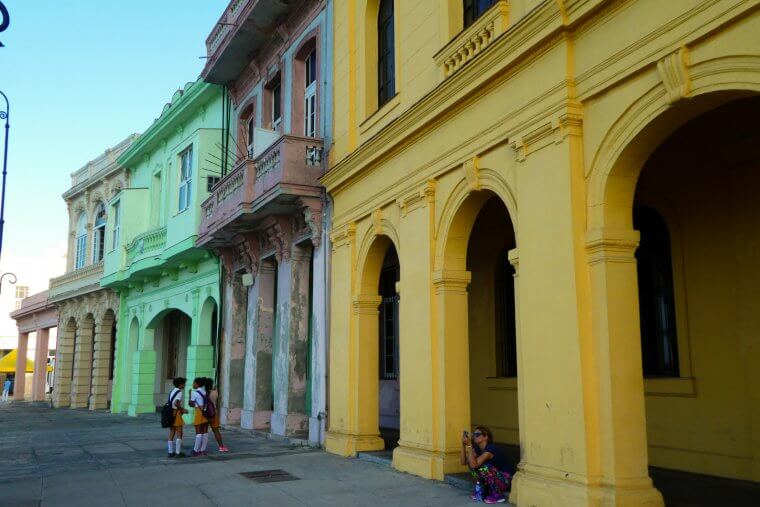
3. Bring print outs of all required documentation
With internet roaming charges being high, another of our Cuba travel tips is bringing print outs of all documentation you will need to show at the airport: boarding passes, vaccination certificates, visas, accommodation bookings, health insurance, and an onward flight booking.
Keep these documents safe in case you need them during your stay and you can’t get to them online!
4. Cuba is a communist state; be mindful of talking politics
Cuba is a communist state, and very different to what we are used to in the west. Seeing this can be fascinatiing, but you need to be mindful.
There is no advertising or branding, and the internet is censored. Even coca-cola is banned! Food and other items are bought using ration tokens and due to import sanctions, there isn’t a whole lot of it. You may also notice the little maintenance that has taken place in the country, with some buildings even left crumbling into the street.
You’ll likely be curious about the history and politics of the state, so maximise your experience by attending museums, but be aware that all the information put out is state-controlled. It is also important to remember that while politics may be interesting for you, many Cubans are not comfortable speaking openly about the government and these topics should be dealt with sensitivity.
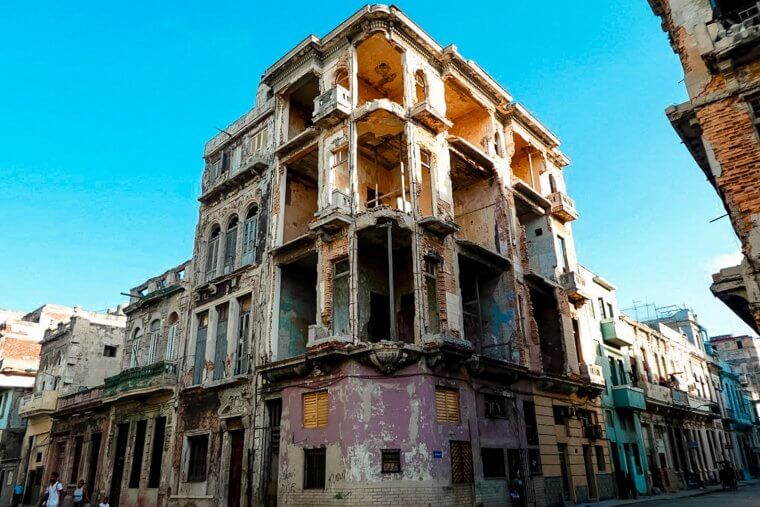
5. Pack everything you need: rationing and import sanctions can mean supplies are limited
Due to the import sanctions, stores in Cuba are different to what you’re probably used to. They might have very little stock, especially in terms of anything fresh, but are also extremely expensive where you might not expect it. To avoid paying upwards of £10 for one pack of toothpaste and some shampoo, one top tip for travelling in Cuba is to pack all the toiletries and goods you may need, including medication, before coming to Cuba.
Tap water is not clean enough to drink in most places and bottled water is wasteful and expensive, so bring a water steriliser if you have that too!
You might also want to pack some little toys or candy to ive to the local children as a gesture, as you may not always have the coins to give to those in need. You won’t have much luck finding these items in a store in Cuba, so pack some before you head off on your travels.
6. Don't bring a drone to Cuba
Drones are banned in Cuba, so to avoid having it taken away at customs and paying a holding fee to collect it on your way out, don’t bring yours!
7. Book your accommodation in advance
At least for the first few nights…! With the internet being expensive and not always easy to access, and there sometimes being problems with apps like Airbnb, Cuba is a destination where I’d suggest booking accommodation in advance. You usually need to show an accommodation booking at the airport customs.
Having said that, owners of casa particulares often know someone else in another town, so they can sort you out with a local recommendation if you dare to be more spontaneous!
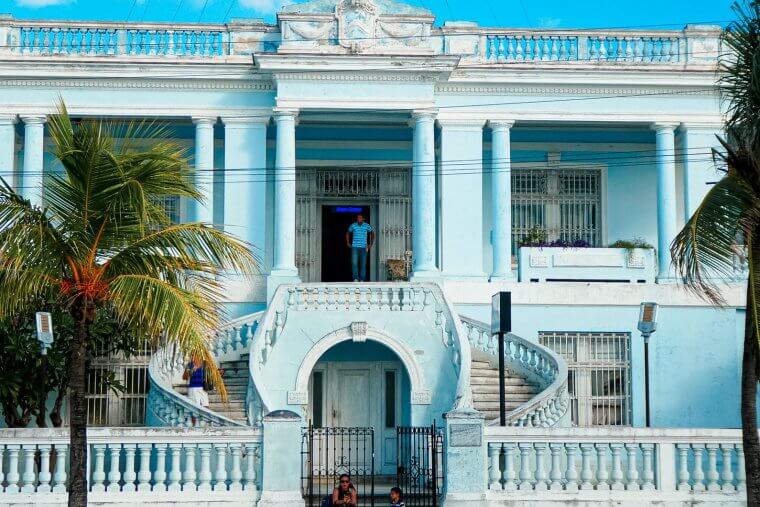
8. Live with locals in casa particulares
Despite some things separating tourists and local Cuban people, there are many ways to share experiences and get to know the country more authentically. While you’ll likely be more than welcomed to play dominoes with them, try your salsa moves with them or practice your Spanish over a mojito, the best experiences I had came from sitting around a dinner table together.
Under the system of casa particulares, host families are allowed to open up spare rooms in their homes as accommodation for tourists – like a B&B, but usually in the owner’s home. You are likely to come out of your stay with a new friendship and local knowledge, as Cubans are such welcoming, kind and friendly people. This was an absolute highlight of my trip and one of the best things to do in Cuba – I even remember shedding a few tears as I parted from my Havana host family because they were that amazing!
You can book casa particulares on booking.com , Airbnb , hostelworld , or turn up and see what you find! I’d recommend booking in advance where you can, at least for your first stay – you usually need to show an accommodation booking at the airport customs. If you use Airbnb to book a casa particular while you are in Cuba, use the browser because the app doesn’t work well.
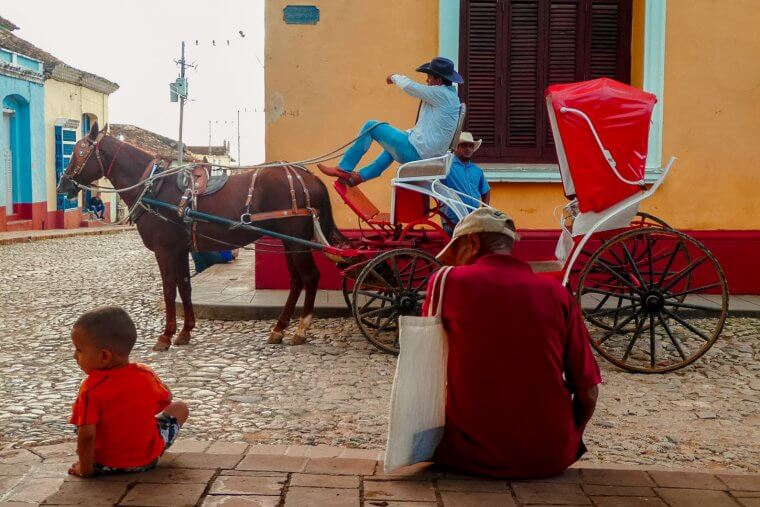
9. Plugs in Cuba are 110v.
Many hotels and other accommodation providers will have a plug converter, but one of my Cuba travel tips is to pack one just in case!
10. Currency in Cuba is the Cuban Peso (CUP) - bring all the cash you want to exchange
Cuba recently underwent an economic reform, so there is now only one currency in Cuba: the Cuban Peso (CUP). There are a few shops that will also only sell in “hard currency” (euros, GBP, dollars) or with credit cards in these currencies.
You cannot buy CUP outside of Cuba; the best way to get money is to bring cash with you in euros, GBP or Canadian dollars, and exchange at the airport. You’ll need to look for the CADECA office (you will also find these offices in larg towns like Havana).
While paying by bank card and using cash machines is becoming more common, ATMs can be far and few between and usually have significant surcharges so bring as much cash as you can (maybe bring a money belt or stash some in a suitcase pocket).
More Cuba travel tips in terms of money include…
- American owned cards are not accepted so bring a Visa or other card.
- Euros, GBP and Canadian dollars will get a better exchange rate than US dollars (there’s an extra 10% fee on US dollars).
- Don’t expect the same low prices as other neighbouring Central American and Caribbean countries – Cuba can be surprisingly expensive for this region.
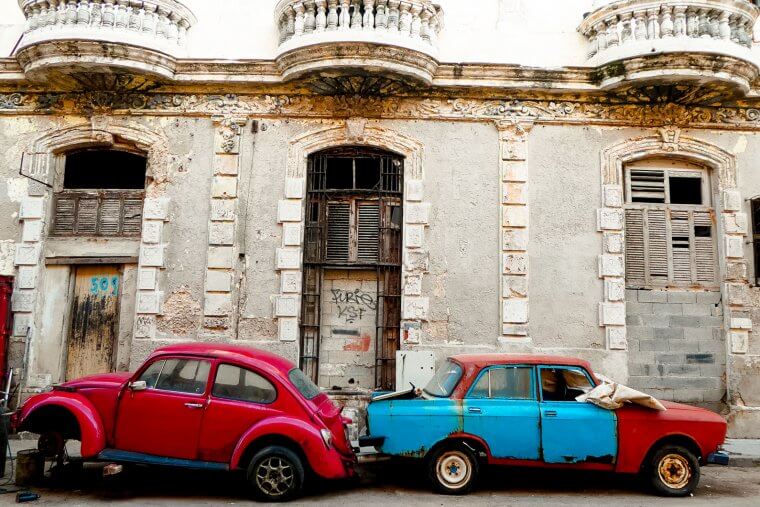
11. Internet access can be limited in Cuba
Internet is more accessible than it used to be, but still somewhat restricted in Cuba. Whilst it is not totally unavailable, you certainly won’t be able to access it at all times or without a steep price, so be prepared to spend some time off the socials and away from the work emails. Another of our top tips for travelling in Cuba is to check with your accommodation as to whether there will be wifi; it’s becoming more common, but don’t take it for granted that it will be there.
If you find yourself in a park and everyone is looking at their phone, you’ve likely hit a public wifi hotspot. Public internet hotspots in Cuba are mostly in parks or other gathering spots. This is the cheapest way to get access to the internet in Cuba (SIM cards and data roaming are expensive). You can see a complete list of all the public wifi spots in Cuba on the ETECSA website .
To access wifi at public hotspots, hotel bars or gathering places, you’ll need an internet card to connect to the internet. These Cuba internet cards, called NAUTA cards, can be purchased at ETECSA stores. You can also purchase them from people near public hotspots, but they are often more expensive. They have a password on the back which you enter on your internet browser, and will give you a certain time period in which to use the internet on your deveice’s browsers/apps.
Less frequent internet access also means less researching on the ground, or if you are like me, less scouring at reviews on Google Maps while you are strolling through a city. A travel guide, a printed/downloaded map and some research before you land will definitely stand you in great stead when visiting Cuba. I urge you to do all three of these things because as useful as the travel guides can be, their recommendations see price inflations over time and you will be totally lost if you misplace the one book you have to guide you around the country!
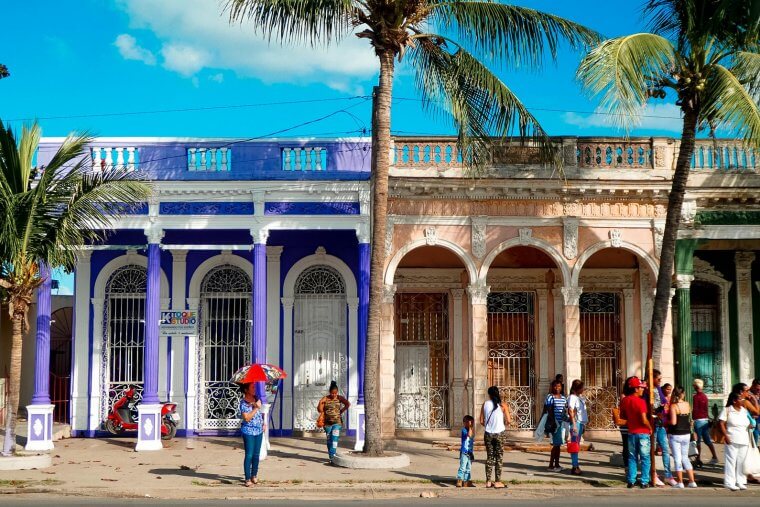
12. Cuba is an extremely safe country
Cuba is an extremely safe country. Not only are crime rates very low, but in my experience, Cubans were some of the kindest people I’ve ever met and there is a sense that people are more prepared to look out for you, than ever hurt or harm you.
On top of that, you can also feel extremely safe in terms of your health. With the health insurance that you purchase before travel you’re in safe hands with Cuban doctors if you get sick. (Note: bring over-the-counter medication with you for ease).
The only experience that took me by surprise at first, was the (quite relentless) catcalling. Yet, after some research, including listening to Chen Lizra’s TedX talk on the culture of seduction and flattery in Cuba, I came to realise that this country of Salsa and Rumba, has a different attitude towards catcalling.
In a place where there is no advertising and images of supermodels on every other building or product, beauty is recognised and appreciated in everybody. When I noticed how being called ‘linda’ and ‘preciosa’ was occurring to women of all ages, shapes and sizes, I began to recognise it for it’s more innocent meaning, which is flattery or ‘piropos bonitos’.
Obviously, this is a very different culture to what many are used to. It’s not to say you must agree with it, but simply to highlight the general harmlessness of catcalling in Cuba. I can confidently say that despite all the attention, I never felt threatened or in any danger in these situations, unlike how I feel about catcalling elsewhere in the world, where it can be more rude, sexually threatening and certainly have more malicious intent.
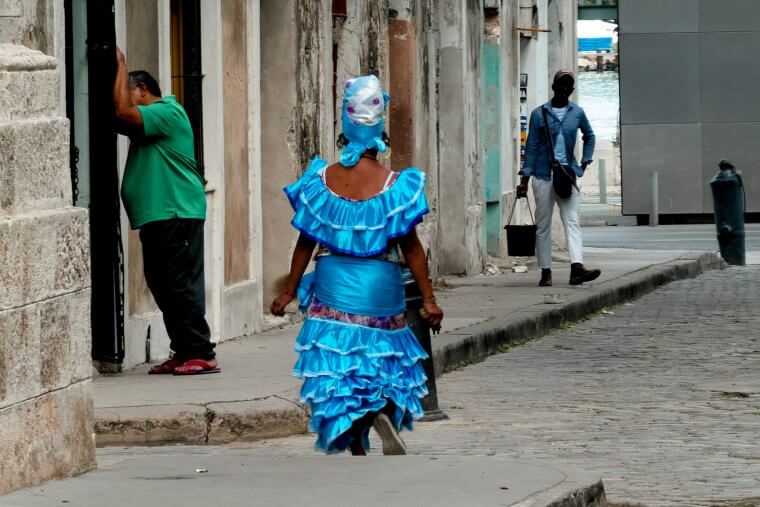
13. Travelling around Cuba by bus is easiest
Travelling in Cuba is really easy by public trasnport; the tourist buses are run by a company called Viazel. The roads in Cuba are good, the bus fares are reasonable, and the drivers are sensible.
A top tip for travelling in Cuba by bus is to bring some layers with you – they often blast the air con and it can get chilly!
14. Use the Cuba-Taxis in Havana
These nifty, little cabs are the Cuban’s take on the tuktuk. They are the most bizarre, but worthwhile mode of transport to take you through Havana, as they whiz through the crowded streets with unrivalled navigation and speed. Not only will they fulfill your thrill-seeking needs, but they cost half as much as the vintage taxi! Definitely a money-saving Cuba travel tip you need to know!
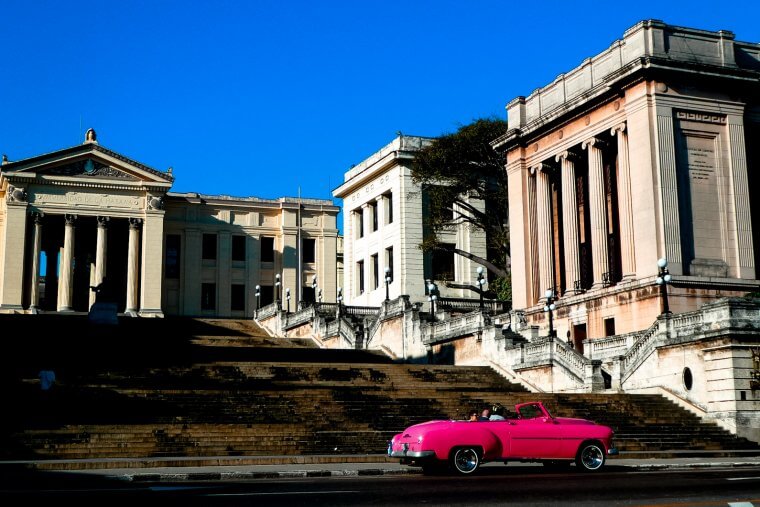
15. Tourists and locals have different experiences
You may notice a difference in where and what tourists and locals can go and do. Since the monthly Cuban salaries are around $25 a month, a $10 meal in a restaurant won’t be bought by many locals. In the same vein, transport and certain areas can often be separated so don’t be shocked if you are rejected for a local bus or area for being a tourist; it is just the way things function in Cuba. In part, this can make travelling feel less free, especially as travelling ‘off the beaten path’ can be more difficult and expensive.
However, as long as you avoid all-inclusive resort destinations such as Varadero you are bound to have an authentic Cuban experience.
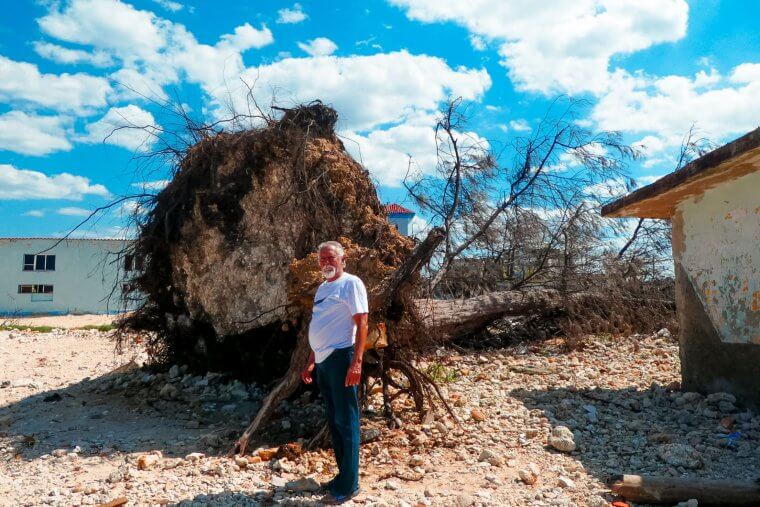
16. The food and coffee are different to what you might expect... and don't drink tap water in Cuba.
Don’t go to Cuba expecting the type of street food you’d get in Mexico, regardless of how close the two are. Due to import sanctions and rationing, food is quite limited and often pretty simple – get used to rice and beans!
Also, coffee always seems to be on the weak side – ask for a double shot or extra strong if you rely on your coffee like I do.
Remember that you cannot drink the tap water in Cuba, so either drink bottled water (which can be expensive and hard to find – check petrol station shops if the local supermarket doesn’t have any) or, to save on plastic, one of our Cuba travel tips is to bring a water steriliser with you.
You might be able to cook in your casa particular but it’s more likely that the family will offer to cook for you. In my experience, this was mainly a breakfast service which was a great way of trying local, homemade cuisine, plus the portions were always extremely generous and fuelled us well for our long days out in Cuba.
Having said that the food is plain in many places, more restaurants are opening up and we did eat some great food at the following places:
- Lamparilla 361, Havana – amazing tacos.
- Cafe Real, Trinidad – great food and live music.
- Cafe Arcángel, Havana – cutest interior!
- Lo de Monik, Havana – best Cuban sandwiches.
- Cafe Laurent, Havana – great fish.
- Los Toneles, Holguin – Family run, lovely atmosphere.
17. Don't forget to tip
Many professions in Cuba such as waiters, taxi drivers, tour guides and cleaners rely on tips to support their income. One of our Cuba travel tips is to always carry some coins with you to tip local staff, e.g. waiters in restaurants, taxi drivers (the ones you have a meter – if they don’t they are private drivers, and you should negotiate the rate before you leave), and toilet attendants.
Just bear the exchange rate in mind before you tip – wages for these kind of jobs are often around 20-30 USD a month, so 1-3 USD tips are very generous without ruining your budget.
18. Bring mosquito repellent for the sandflies at the beaches
You might not think to bring mozzie repellent for the beach typically, but this is one of our top tips for travelling in Cuba. You’ll find sandflies at the beach and protecting yourself against them will stop them ruining a relaxing day in the sun!
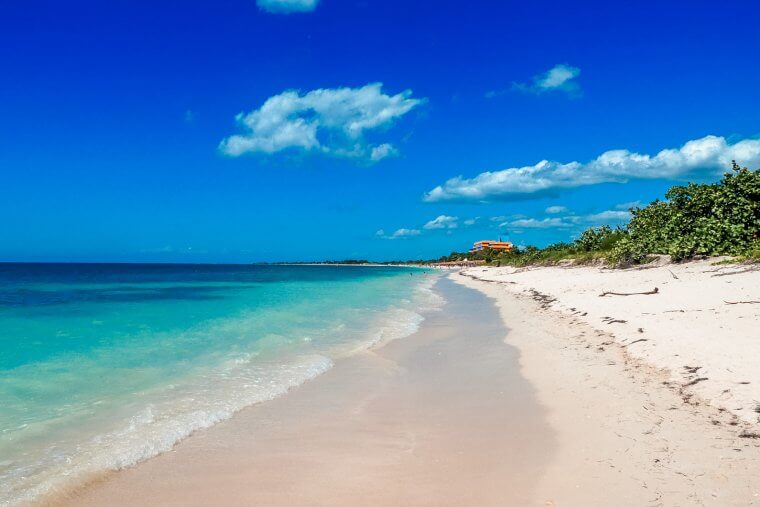
19. Go to El Nicho Waterfalls with a local tour guide
The incredible Cascate El Nicho is not the easiest and cheapest spot to get to in Cuba, but make it happen if you can, it’s worth it as it’s one of the best things to do in Cuba. I found the best option was to go with a group and a guide, which included the transport, food and access to the waterfalls for the whole day. There are several falls in this lush forest, and the guides are great at explaining all the flora and fauna around you. There are plenty of swimming and rock-jumping to enjoy in the emerald waters of el Nicho, so it’s the perfect addition for a bit of adventure in your Cuban itinerary.
20. Bring your dancing shoes!
Cuba is home to Salsa – one of the most beautiful, sexy and exciting dances in the world, and you can tell this nation is its origin… On practically every street corner of Havana there will be some music playing and people dancing and singing. So bringing your dancing shoes / outfits or confidence – whatever is necessary, and start twisting those hips! My favourite places to do this were:
- Disco Ayala el Cuevo, Trinidad – a nightclub inside a cave!!
- Bar restaurant 1838
- Club de la music, Trinidad
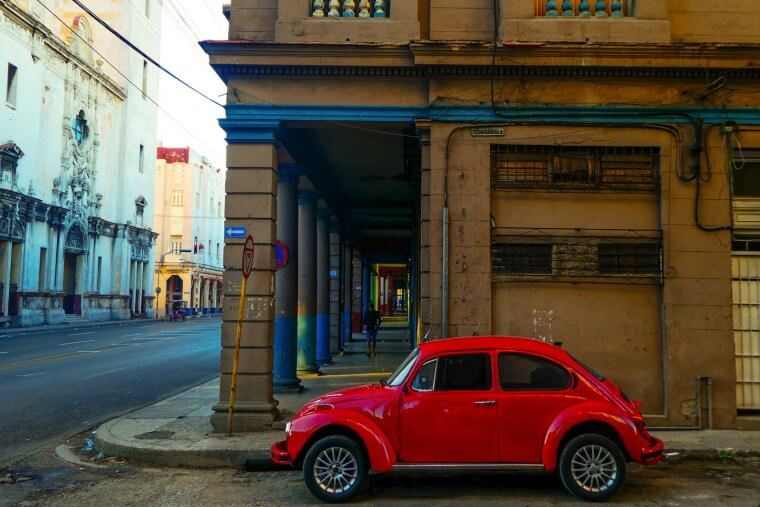
21. Brush up on your Spanish before you go
Very few Cubans speak more than basic English, if at all, and Spanish is a relatively straightforward language, so start practising your Spanish or bring a little Spanish dictionary – it’ll certainly make life easier! Learning Spanish is one of our top tips for travelling in Cuba that can also come in handy all over the world, as Spanish is an official language in 21 countries!
One of our favourite apps for learning languages on the go is Duolingo. Check out other useful travel apps here!
What are your top tips for travelling in Cuba?
Have you been to Cuba before ? Any Cuba travel tips you’d add?

Hi, my name is Natty! As a third culture kid – raised by parents of French, American, Chinese and South African descent, trapsing the world and acting as a global citizen has always felt natural to me. Despite being only 21 years old, and not yet finished with my Economics degree at the University of Manchester, I have managed to make travelling happen whenever and wherever possible.
Did you find this post helpful? I’d love you to share it for me.
Pin and save this blog post for later…
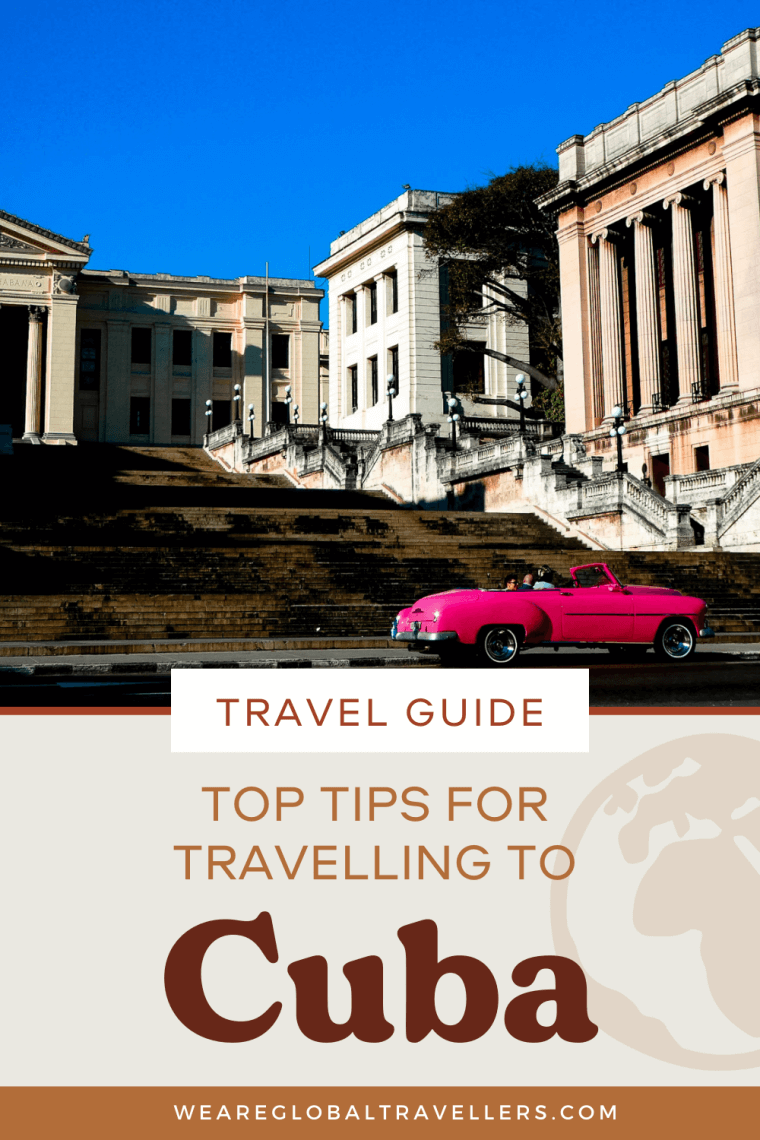
IT’S LOVELY TO MEET YOU
I’M MOLLIE AND I STARTED THIS BLOG BACK IN 2013 WHEN I HEADED OUT ON MY FIRST BACKPACKING ADVENTURE.
I’D LOVE TO SHARE THE JOURNEY WITH YOU, WE’VE GROWN A LOT SINCE THEN!
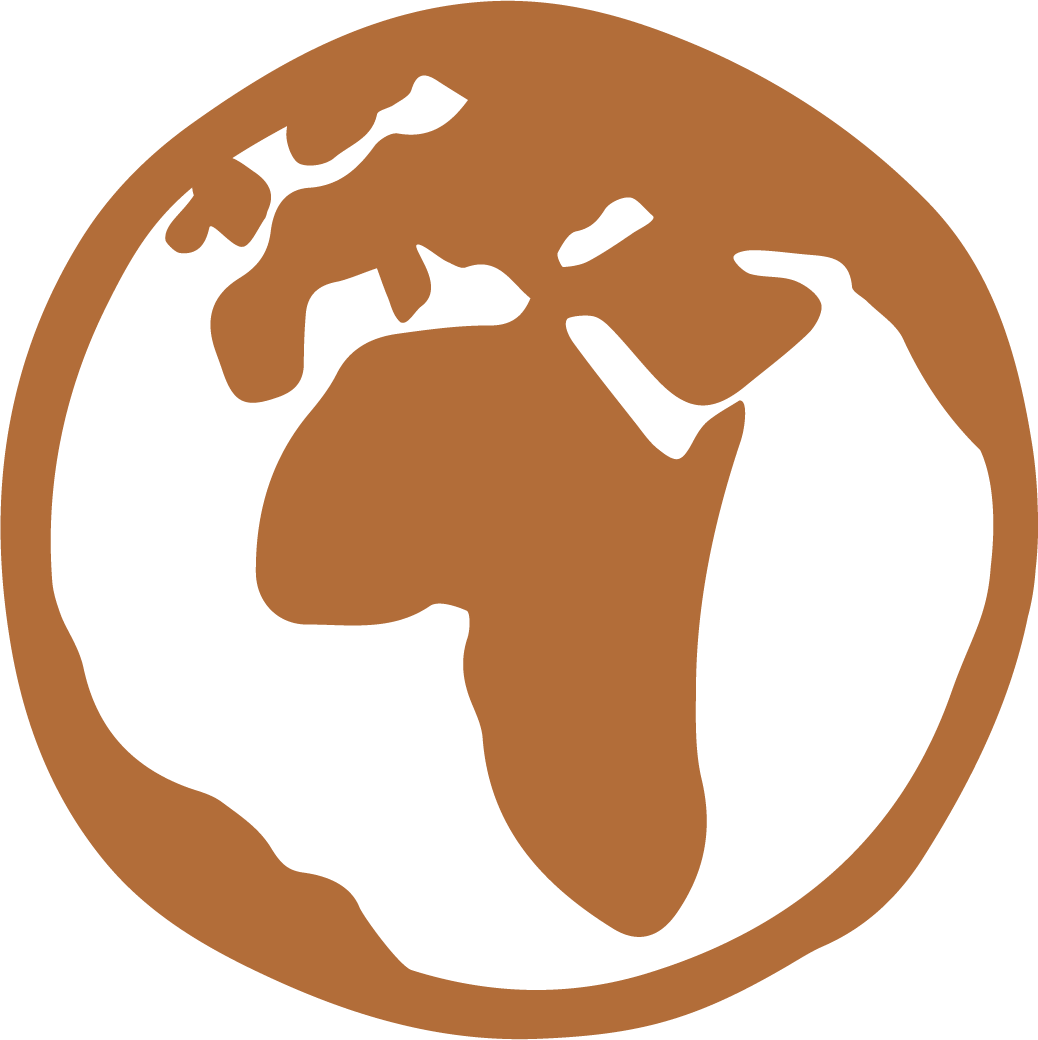
Shop the google map legends
Search by adventure type, active travel, backpacking, budget travel, love and relationships, once in a lifetime, packing tips, solo travel, weekend getaways, where's mollie newsletter, travel shop, search by destination, other posts that you may like....

A weekend guide to Bangor, Wales
White chocolate and cranberry ‘cookie cups’.
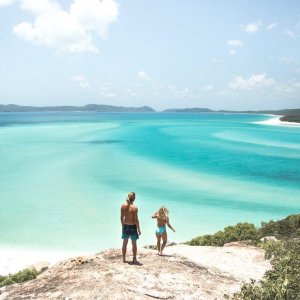
14 best things to do on the East Coast of Australia
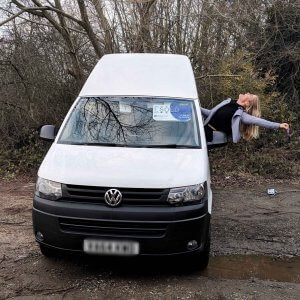
I bought my dream van! #VanLife begins…

The best things to do in Malmö, Sweden

Recipe: Vegan Lentil and Sweet Potato Pie

Recipe: Broccoli, spinach and mint soup
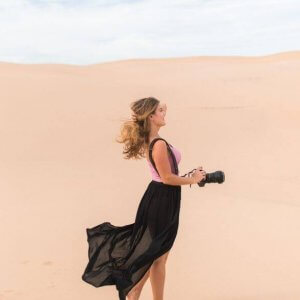
A roadtrip from Sydney to Newcastle: Stockton Sand Dunes and Mount Tomaree
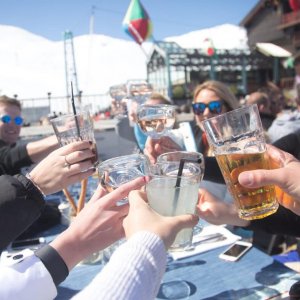
Living the Val D’Isere ski dream in the French Alps
Privacy overview.
Travel Tips for Cuba

Top Tips for Travel to Cuba 🇨🇺
What you need to know before you head to Cuba
Travel to Cuba is relatively easy even though Cuba is different!
Here are some key things you need to know before you get there so that you can enjoy a smooth and stress free trip. A little preparation goes a long way!
Our guides helped me gather some extra travel tips to share with you.
Here are our top tips for any trip to Cuba:
- Ensure you’re fully vaccinated because Cubans are. 💉 100% of the Cuban population is vaccinated ( 5 year olds and upwards ) and Cuba find the idea of refusing a Covid vaccination inexplicable. Keep up to date with entry requirements by checking the FCDO travel advice for Cuba here . It’s good to know that everyone ( and I mean everyone ) who works in tourism has been vaccinated and has received a booster vaccination too.
- Bring hand sanitiser 😷 Cubans are no longer obliged to wear masks in public places but they are extremely health conscious because it’s a tropical country where bugs and bacteria thrive. The best defense against “travellers’ tummy” is to wash your hands frequently and use sanitiser when you don’t have access to soap and water. Cuba isn’t a rich country and you won’t be able to buy any in Cuba.

- Bring EUROS cash in small denominations. 💶€💶 Cuba’s national currency is the CUP ( Cuban Peso ) but its value has dropped during Covid and everyone in Cuba wants EUROS. Best to bring your cash in EUR5,10 or 20 notes. You’ll be able to use it pretty much everywhere and especially in bars and restaurants where proprietors actively prefer payments in a solid currency over payments in CUP. It’ll work out better value for you too! Although you can easily exchange your EUR cash into CUP cash, it makes sense to keep the bulk of your cash in EUR as restaurants will often give you a better rate of exchange than the official one. Currently, the official exchange rate is EUR1:CUP117 while the unofficial rate is EUR1:CUP165. Just saying…😉
- Best don’t bring USD cash! $😩 Euros are currently the most accepted currency in Cuba and can be used anywhere. USD cash can be exchanged anywhere, but an additional 10% tax will be charged at exchange. USD, EUR, GBP, MXP, CAD are exchangeable at the local exchange bureau but the current official rate of exchange bears little relation to the higher rate of exchange on the street. Put simply, if you bring these currencies and exchange your money in the official CADECA exchange offices, your trip to Cuba will be more expensive. Do yourself a favour, take my advice and bring EUR . In small denominations. This is what you’ll use to pay for pretty much everything. If you’re a UK citizen you can use the very efficient, reliable and easy The Currency Club where you can order and pay for EUR online and get them delivered to your home in 24 hours.

- Medication and toiletries 💊🧴 Bring any medication and toiletries you will need during your trip and be generous – bring extra to give to Cubans you’ll meet along the way. Cubans currently struggle to find even the most basic medication so the most useful gifts you can bring at the moment are over-the-counter painkillers and useful meds such as Benadryl ( for allergies ) or hydro-cortisone cream for insect bites and skin rashes ) They will be super grateful for any extra items you can fit in your case. Go to Poundland or Superdrug, spend £20 and make someone’s day (and friends for life) when you get to Cuba! Here is a list of items currently impossible or very hard to buy in Cuba…
- Paracetamol
- Anti-histamines
- Insect repellent ( those pesky mosquitoes )
- Hydro-cortisone cream ( for rashes and insect bites )
- Nappy cream ( Sudocrem, the magic cream which works on any skin condition! Brilliant on sunburn too J )
- Sanitary Towels ( yup, imagine you can’t get sanitary protection 🥺 )
- Razors ( now you know why everyone is sporting a beard in Cuba )
- Moisturisers ( both face and body )
- Shampoo and conditioner
And if you like snacks ( and like the idea of making someone really, really happy) you might want to pack:
- Chocolate 🍫
How to use the internet in Cuba
Connectivity is patchy, that’s the honest truth, but YES! you can still connect to the internet in Cuba. Head over to our blog where we share our expert tips on how to connect to the internet in Cuba.

How safe is Cuba?
Cuba has one of the lowest crime rates in the Western Hemisphere . Violent crime is rare, and petty crimes like pickpocketing are infrequent, especially in tourist areas. Read our Is Cuba Safe? blog to get an idea of what’s like with our top recommendations.
We know you’ll have a good time once you get here, just make sure you take our advice so that you have the best time possible!
What about food?
Cuba has its limitations when it comes to food. So to help you eat yourself happy, we’ve put together a handy food guide with all the information you need – whether you are a meat-eater, vegan, vegetarian or gluten free!
Worried about passport and visa information?
We’ve got your back! We tell you all about everything you need in our Cuba Need To Know section.
Need help planning your perfect Cuba holiday?
Our expert team has over 20 years of experience organising tours and activities in Cuba – the Cuban way! Here are some reasons why our customers trust us:
★ Sustainable and responsible travel experiences ★Travel safely in the hands of an international team of travel professionals ★ Stay in local casas and get closer to Cuban life ★ Bike hire included (Trek hybrid 8.3 DS bikes with front fork suspension) ★ English-speaking tour guides and drivers and mechanics! ★ All bus transfers in private air-conditioned bus ★ Mineral water and local snacks on cycling days ★ 24 hr assistance

The Sustainable, active travel experts in Cuba
For the last 20 years, we have been providing exceptional and meaningful holidays, enriching the lives of active travellers and our community, and exposing them to a unique way of living by sharing real Cuban experiences, in a sustainable way. Get in touch with our expert, friendly team to book a Cuba holiday to remember.
Related stories From Cuba

Made In Havana: 10 of the best up and coming local brands
March 7, 2024, written by Cubania Team
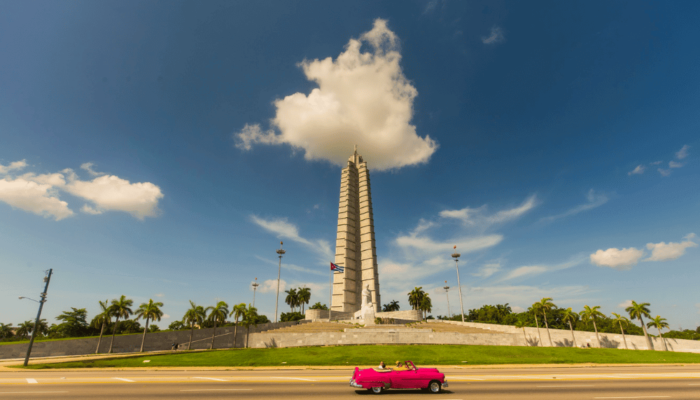
The Best Museums to visit in Havana
April 23, 2024, written by Cubania Team
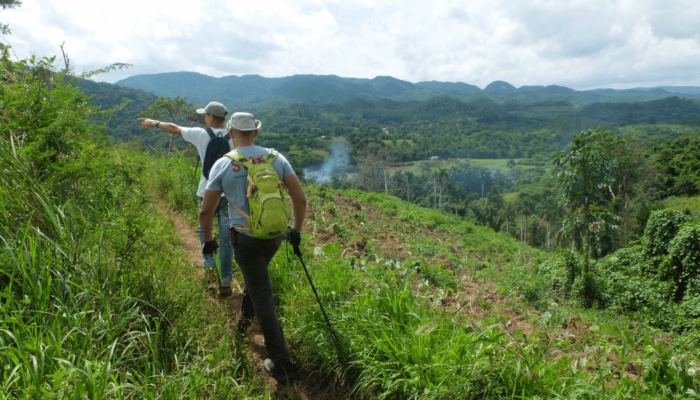
Top walking and hiking spots by our guides
March 21, 2024, written by Cubania Team
Free Destination guide

Cuba is open! Book your trip now!
Free cuba travel guide.
Subscribe to our newsletter to get useful information and up-to-date insights on the island. Get tips on:
✔ Local language ✔ Cycling & Trekking ✔ Money & Costs ✔ Transport ✔ Hotel & Facilities
Business Channel B2C B2B Guides Journalists
Downloaded Destination Guide Bike Cuba Cubania Classic Cycle Cuba Insight Experience Havana Cuban Active Adventure Western Skyline Ride Cuba Completa Hip Havana Salsa Cubana Road Cycling Western & Central Cuba Bikepacking Cuba Kayaking in Cuba Run And Cycle In Cuba Havana Marathon Queer Cuba Havana Cycling Tour Western Cuba Trek Family Active Adventure Central Cuba Bike Ride Cuban Discovery Family Beach and Culture Central Cuba Trek Western And Central Cuba Trek Road Cycling Cuba Vuelta de Cuba
Consent I am happy for Cubania Travel to contact me occasionally via email
Click here to download Haga clic aquí para descargar
View Privacy Policy

The Caribbean’s largest island, Cuba remains mysterious to many American travelers, as it was only after a diplomatic détente introduced in 2014 that permissible travel categories expanded significantly. Leisure travel for Americans remains prohibited, and U.S. citizens and residents must justify their trip under one of 12 reasons allowed by the Department of Treasury’s Office of Foreign Assets Control. It can be confusing and challenging to plan a trip, but those who are persistent will be rewarded with one of the most intriguing, vibrant cultures in the region, where Spanish and African influences continue to exert themselves in food, music, art, and architecture. Beyond Havana, the capital, are 14 provinces to explore, many with beautiful scenery and endemic fauna not found elsewhere on the planet.
- Copy Link copied

Trinidad is a town in central Cuba known for its colonial-style buildings and cobblestone streets.
Photo by rphstock/Shutterstock
When’s the best time to go to Cuba?
As with other Caribbean destinations, Cuba is hot and humid year-round, but especially so in summer, and hurricane season spans June to November. September and October are typically the months most prone to hurricane action and recent hurricanes that have made landfall have been severe. December and January and early summer are peak tourism months, and you’ll pay the price accordingly. If budget is an issue, late winter is Cuba’s shoulder season and offers cooler temperatures and slightly better prices than other times of the year.
How to get around Cuba
Direct commercial flights are now available from several U.S. cities, including New York City and Miami, among others. JetBlue, American, and Delta all fly to Cuba, and service multiple destinations beyond Havana, including the cities of Cienfuegos, Trinidad, and Holguín. Once you’re on the ground, it’s best to get around by taxi or bicycle taxi (bicitaxi) in Havana; outside the capital, a car rental is the most reliable, albeit expensive, option. Maps, signage, and road conditions all leave something to be desired.
Can’t miss things to do in Cuba
Cuba’s capital, Havana, is a UNESCO World Heritage Site, and never fails to charm visitors with its colonial architecture, its atmospheric waterfront, and, of course, its people. While there, be sure to stop by the capital’s famous ice cream emporium, Coppelia, wander around Habana Vieja, the city’s historic heart, and take in live music at a venue like Casa de la Música. Cienfuegos is another UNESCO site, and many other towns and cities throughout the country offer opportunities for exploration of Cuba’s distant and more recent history at museums, cultural centers, and historical sites. Those interested in revolutionary history will want to visit Santiago, where Fidel Castro’s revolution was launched, and where he is buried.
Food and drink to try in Cuba
Cuba doesn’t exactly have a global reputation for exceptional cuisine, a fact that can be attributed to decades of hardship caused by the U.S. embargo. Travelers staying in hotels will likely find their options to be more expansive, while those who stay in a casa particular (a sort of Cuban-style B&B) may be treated to Cuban home cooking. Traditional dishes include moros y cristianos (“Moors and Christians,” or black beans and rice), sweet or fried plantains ( maduros or tostones ), and pork or chicken. Bucanero and Cristal are local beers, and who can come to Cuba without trying Havana Club, the national rum? Teetotalers might want to stick to guarapo , a fresh juice pressed from sugar cane.
Culture in Cuba
Politics aside, the Cuban Revolution was definitely a boon to Cuban culture, with the government actively supporting and promoting the visual and performing arts, as well as literature and music. Museums abound, and a growing number of independent art galleries dot Havana. Visitors to the country are likely to notice that art in Cuba isn’t just for the more moneyed class; everyone here, it seems, appreciates the arts and find these integrated into their daily lives in some way.
For Families
Cuba is a remarkable destination for family travelers, not the least reason being that Cuban culture is incredibly kid-friendly. In Havana, families will find plenty to keep them busy, including several puppet theaters, a cinema that’s specifically for kids, and other experiences that are unique to Cuba: Try riding in coco-taxis, coconut-shaped taxis powered by motorbikes. Outside the capital are all-inclusive resorts in Varadero, where families will enjoy pools, on-site activities, and kids’ clubs, and numerous other cities and towns where adventures in culture, history, and nature await.
Local travel tips for Cuba
Locals know that prices are almost always in Cuban convertible pesos (CUC), not Cuban pesos (CUP). CUC, or the convertible, is the form of currency that most travelers to Cuba will use, while CUP is the currency used more often by locals. If in doubt about the currency quoted, ask! Otherwise, you’ll find yourself burning through your vacation budget more quickly than expected. Also, be aware that an automatic 10% tariff will be imposed upon your exchange of USD, so your buck doesn’t go as far in Cuba as you might think.
Local Resources
- Here is Havana
- LaHabana.com
Guide Editor
Julie Schwietert Collazo has been a bilingual freelance writer, editor, and translator for the past 10 years and loves (almost) every minute of it. She does, however, tell people that if she could have any other job, it would be a gig as a Mexico City evangelist. The Mexican capital is her former home and the first place she always wants to go when she gets on a plane. Read more at collazoprojects.com and Cuaderno Inedito .


Ultimate Guide to Travel to Cuba (2024 Update)
Cuba is well known for its white sand beaches, delicious rum, and world-famous cigars… but you might be surprised learn just how much Cuba has to offer travelers. From incredible hiking destinations and wildlife preserves to fascinating historical sites and modern art galleries, Cuba is so much more than most visitors expect.
Unfortunately, there is a lot of confusion about who can travel to Cuba (hint: yes, Americans can travel to Cuba ! ) and how to travel to Cuba. Thankfully, Cuba travel is easy for just about anyone.
In this ultimate guide to travel to Cuba, we’re covering a ll the details about how to travel to Cuba, the best things to do in Cuba, and why you need to add Cuba to your travel bucket list .
Plus, keep reading for all the inside tips we’re sharing about what to pack for your trip, and what to leave at home.
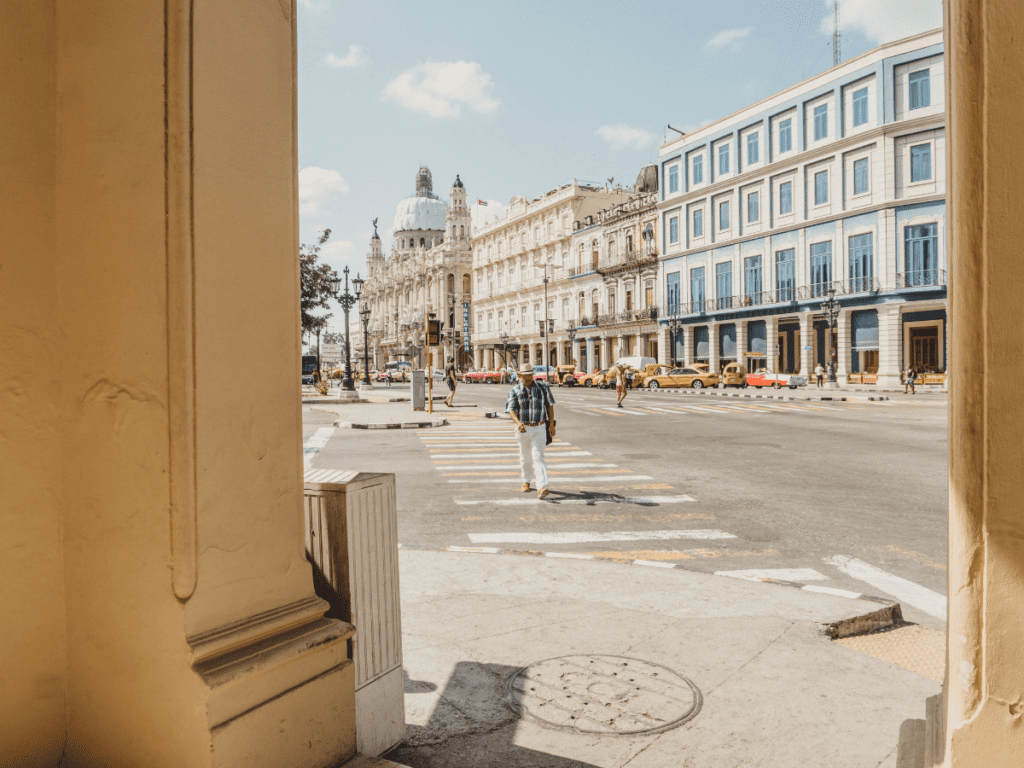
This post contains affiliate links that may reward me monetarily or otherwise when you use them to make qualifying purchases – at no cost to you. As an Amazon Associate, I earn from qualifying purchases. For more information, please read our disclosure policy .
Cuba at a Glance
Who can travel to cuba.
Everyone can travel to Cuba! – even U.S. citizens or citizens of other countries traveling through the United States. U.S. citizens are required by the United States government to only spend money at private businesses (rather than government-run establishments) while there – which is quite easy to do.
Read More: Ultimate Guide to Travel to Cuba from the United States
Cuba uses the Cuban peso , valued at 24 pesos to $1 USD . However, since 2021 Cuba has been experiencing high inflation, and the official exchange rate is much lower than the one you’ll find if you exchange your money with a moneychanger.
Read More: Currency in Cuba: Ultimate Guide to Changing and Using the Cuban Peso
Spanish is the only language spoken in Cuba, with English occasionally spoken in the tourism industry . Download Google Translate before your trip to help. Check out our guide to the apps you’ll need for travel in Cuba for more recommendations.
Cuba is known for being an extremely safe country , much safer than most other places in Latin America or the Caribbean.
Take precautions that would generally when traveling – don’t be excessively flashy with jewelry, hold on to your stuff well in crowded areas, etc. You can find more Tips for Visiting Cuba like these from a fellow traveler here.
Electricity
Some areas of Cuba use 110V electricity while others use 220V electricity , and you’ll find a mix of plug types in different places around the island. We recommend bringing along a universal travel adapter and electrical converter so you can use your devices while there.
Internet in Cuba isn’t everywhere yet, but it is generally easy to access , although slower than you may be used to. We wrote a complete guide to using the internet in Cuba with all the details.
We recommend using a VPN (Virtual Private Network) when using the internet in Cuba. Check out our complete guide to using a VPN in Cuba for more details.
Required Insurance for Travelers
Cuba requires that all travelers show proof of travel insurance coverage upon arrival. We recommend Visitors Coverage for American and Canadian citizens and World Nomads for those of other nationalities.
Read More : Ultimate Guide to Cuba’s Travel Insurance Requirements
Our Most Popular Cuba Guides
- How to Legally Travel to Cuba from the United States (It’s Easy!)
- Ultimate Guide to Havana, Cuba
- Ultimate Guide to Varadero Beach, Cuba
- How to Get the Tourist Visa to Cuba
- Cuba’s Required Travel Insurance: What You Need and How to Get It
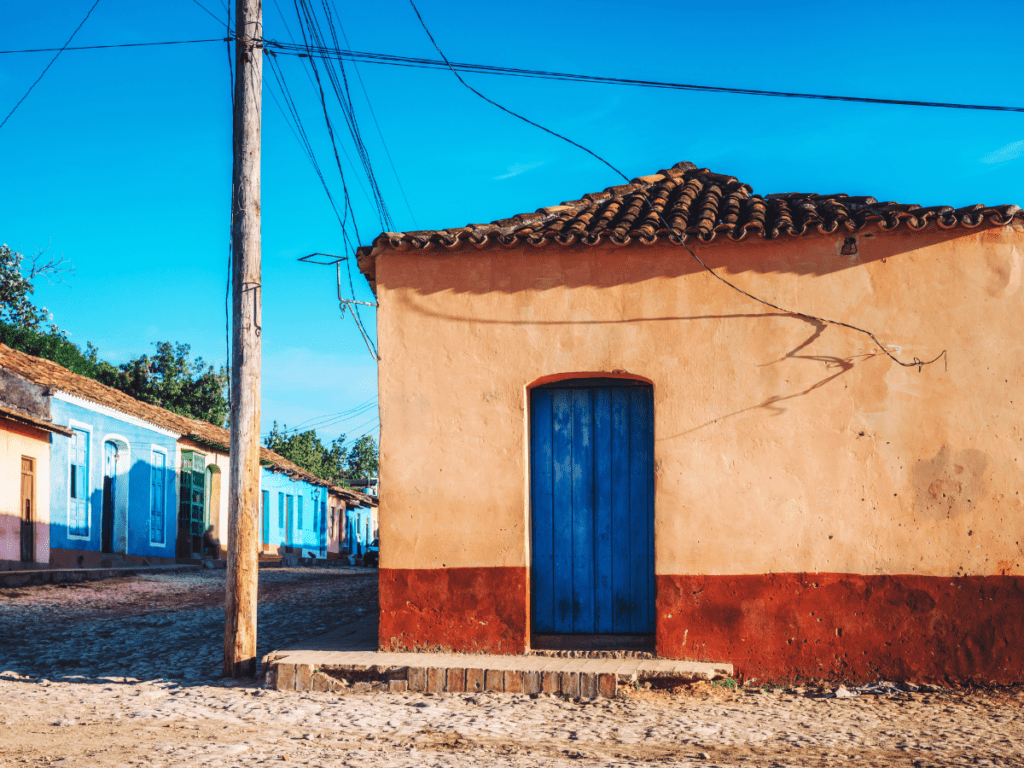
Weather in Cuba
A tropical country, Cuba has two seasons: the wet season and the dry season . The heat will generally dip slightly in the winter months (November through April) , but not much.
While the dry season generally attracts more tourists, the weather is perfect for a visit. May is a good time to visit as well, with the weather still nice and fewer tourists.
Dry Season: November – April
Wet Season: May – October
Don’t forget, Cuba occasionally experiences hurricanes . Peak hurricane season is from mid-August through mid-October.
Peak Tourist Season
Peak tourist season in Cuba lasts from early December through the end of March. Peak tourist season generally starts with a huge spike around the holiday season , when many Cubans living abroad come home to visit family.
Visiting around Christmas and New Year is when I’ve seen the greatest price increase in the price of flights and accommodations across the island – try to avoid these weeks if you can.
Best Things to Do in Cuba
Visit havana.
The craziest and most beautiful city in the world in our most humble opinion, Havana is like no other place on the planet.
Many say it’s stuck in the 1950s, but they couldn’t be more wrong – Havana holds on to its history beautifully while moving forward in a wholly modern way that will leave you enchanted.
Some of the best things to do in the city include exploring Old Havana , taking in the view over the city at the Cristo de la Habana , and ending the night with a drink and a show at the Fábrica de Arte Cubano .
Planning A Trip to Havana?
Check out our travel guides for insider information:
- Ultimate Travel Guide to Havana, Cuba
- Where to Stay in Havana
- The Best Airbnbs and Casa Particular Rentals in Old Havana
- The Best Airbnbs and Casa Particular Rentals in Vedado
- The Best Cafes in Havana and The Best Brunch in Havana
Visit Cuba’s Beaches
Cuba is known for having some of the world’s most beautiful beaches. Not only that, but many of them are as close to virgin, untouched beaches as you can still find in the Caribbean, which makes for an unmatched experience.
Check out our guide to the Top 10 Best Cuban Beaches to help you choose which to add to your itinerary.
The Beaches of Holguin
The province of Holguin is home to some of Cuba’s best beaches – Guardalavaca, Playa Pesquero, and Playa Esmeralda. Check out our ultimate guide to Holguin, Cuba for more details.
Varadero is the best-known beach in Cuba due to its proximity to Havana – it’s the perfect getaway from Havana for those looking to spend time in both the city and at the beach. If you’re picturing crystal clear waters and white sand , you’re thinking of Varadero.
While Varadero has a built-up infrastructure so you’ll have everything you’d want at your fingertips, there are also areas of Varadero where you can still get a slice of the beach all to yourself.
Read More: Ultimate Guide to Varadero, Cuba
Cayo Coco and Cayo Guillermo
This incredible pair of ‘cayos’ aka ‘keys’ located on the north shore of Cuba are served by their own international airport and have about a dozen large international hotel chains between them.
They’re some of the most underrated islands in the Caribbean .
If you’re looking for an all-inclusive beach experience, I recommend checking out these two keys and some of the incredible hotels they have to offer. The beaches here are truly pristine – some of the best beaches in Cuba .
Playa Ancón – Trinidad, Cuba
Playa Ancon is known as one of the most beautiful beaches on the southern part of the island, and is close to Trinidad, Cuba , an absolute colonial gem of a city that will take your breath away.
If you’re looking to get outside of Havana and Varadero track, which most travelers visit, we definitely recommend considering Trinidad and Playa Ancon!
Ride in A Classic American Car
The cars in Cuba are absolutely enchanting. While they’ve been kept on the road mostly out of necessity, it makes for a car-lover’s dream to see city streets packed with them.
A ride in a vintage convertible along Havana’s famous Malecón sea wall is a must while in Cuba.
Visit A Tobacco Farm in Viñales
Get up close and personal with one of Cuba’s most famous exports in Viñales , at the heart of the best tobacco-growing region in the country.
Here you can travel by horseback to beautiful tobacco farms where you’ll learn about how tobacco is grown, dried, and formed into world-famous cigars.
Viñales is also one of the most beautiful places in Cuba – this stunning valley is a UNESCO World Heritage Center . It’s an unforgettable way to see a stunning area of the country while this excursion!
What to Pack for Cuba
Check out our Ultimate Cuba Packing List to help you pack for your trip – we’re sharing exactly what to bring to Cuba and what we never travel without.
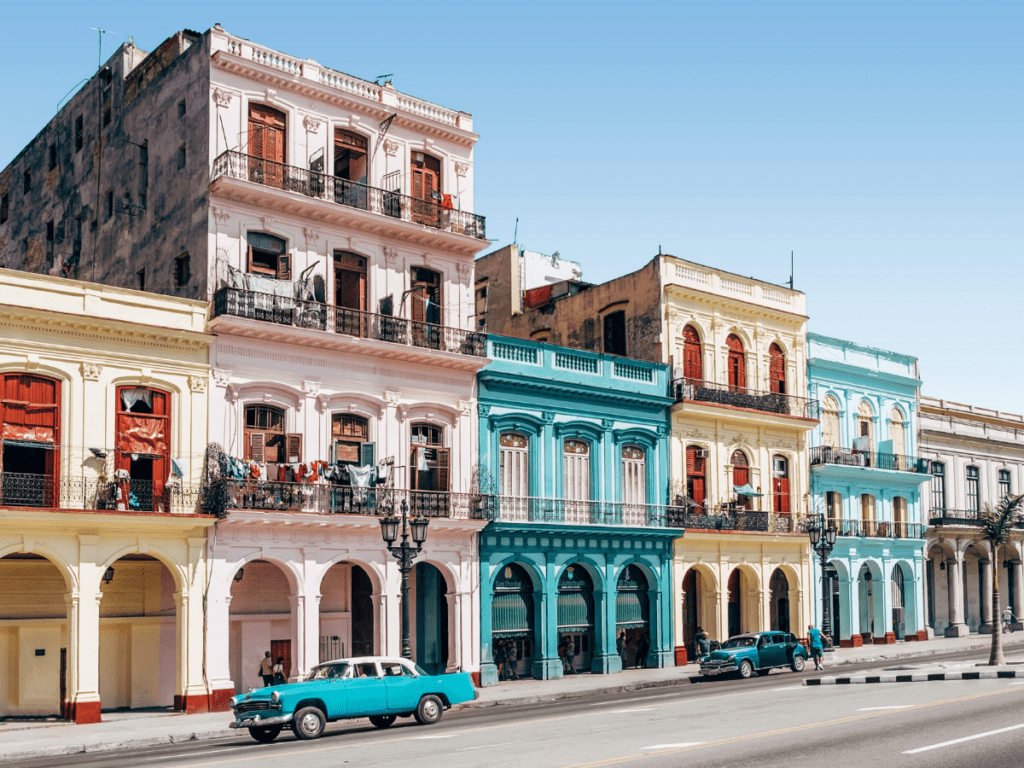
Learn About the Cuban Revolution
Cuba is so much more than the Cuban Revolution! The evidence of the revolution is everywhere, certainly, but there is so much more you’ll see and learn here as you meet the people, try the food, and see the art here in Cuba.
Make sure to visit these sites if you’re interested in learning more about the Cuban Revolution:
- Plaza de la Revolución in Havana
- Comandancia de la Plata in the Sierra Maestra mountains , the mountain base where Fidel and his band of revolutionaries launched their attacks
- Museo de la Revolución , a former presidential palace converted into the Museum of the Revolution in Havana. You’ll find American tanks captured in the attack on the Bay of Pigs behind the museum.
Learning more about the Revolution can be absolutely fascinating for visitors, and a great way to understand more of what you’re seeing and experiencing.
Make sure to check out this free walking tour in Havana focused on the Revolution as a fantastic way to learn more about what you’ll see in Cuba!
Want to learn more?
We made a list of a few books to read and movies to watch to inspire your travel and help you learn more about Cuba, past and present. Check them out before you go to learn more about the Cuban Revolution and much more.
- Books to Read Before You Travel to Cuba
- Movies to Watch Before You Travel to Cuba
Top Activities in Cuba
This list doesn’t even scratch the surface of what Cuba has to offer.
Make sure to check out our complete guide to the best travel experiences and activities in Cuba – totally travel-restriction compliant for travelers from the United States!
Where To Stay in Cuba
Casa particularles.
Casas Particulares – or, guest houses – are a fantastic option for staying in Cuba. You can find an amazing selection of rentals of all kinds, from luxury beach houses to staying with a family in a spare bedroom or renting a simple city apartment.
Not only do rentals usually get you a lot more for your money, but you’re supporting small business in Cuba and you’ll get a much richer cultural experience.
We’ve always had the best luck searching with, ironically, Hotels.com .
Despite their name, Hotels.com actually has a great selection of guest houses, private apartments, and Airbnbs for rent – with the best selection for Cuba!
Casa Particular Guides:
- Best Casas Particulares in Old Havana
- Best Casas Particulares in Vedado, Havana
- Best Casas Particulares in Viñales, Cuba
- Best Casas Particulares in Holguin, Cuba
Airbnb is one of the most popular platforms for finding rentals, but plenty of others exist as well and many people rent their listings across multiple platforms.
While we always recommend staying in a casa particular over a hotel, there are more and more amazing options in Cuba these days.
There are several new luxury hotels in Havana and in Cuba’s beach towns, but I recommend the boutique hotels like this one which can be just as luxurious and offer a more personalized stay.
All-Inclusive Resorts
There are many all inclusive resorts in Cuba, especially from companies like Iberostar and Melia , and they’re especially lovely ones located in Varadero and the Cayos – the Keys – on the northern coast of Cuba.
Cuba Accommodation Guides
- Where to Stay in Viñales, Cuba
- Where to Stay in Holguin, Cuba
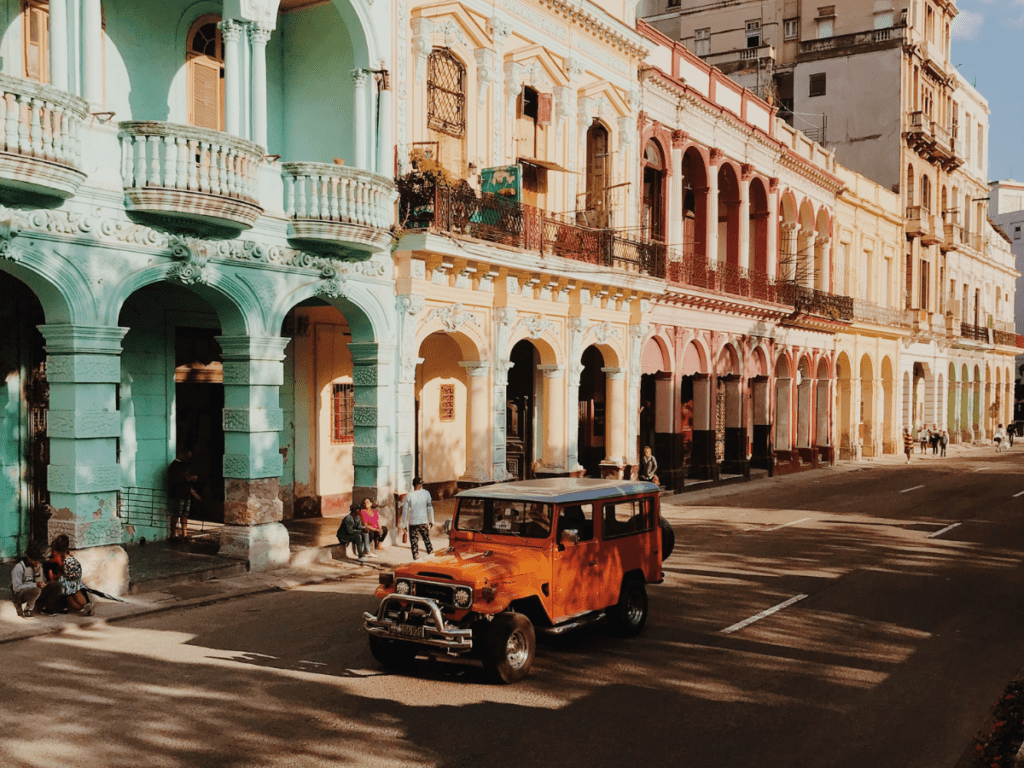
Cuba can be a tough place to pack for – you’ll probably be combining time in the city, on the beach, or in the countryside.
Plus, there are a lot of things you just WON’T be able to find in Cuba no matter how hard you look, meaning you need to plan ahead!
We created an ultimate packing list for Cuba – so make sure to click through to this list to see all of our recommendations for packing (for men and women), plus important travel essentials!
Cuba Travel Essentials
- CASH – if you’re a U.S. citizen, you won’t have access to debit or credit cards while in Cuba . Check out our guide to traveling with cash in Cuba for more details.
- SteriPen – purify water from any source so you won’t get sick!
- Water Bottle (with water filter!)
- S-Biner locks for backpacks and purses while out and about
- Luggage locks
- Comfortable and lightweight basics – I love Los Angeles Apparel clothes for travel, especially to Cuba. These high-quality basics are perfect for layering, and mixing and matching for traveling light (PLUS they’re ethically produced in the United States).
- Go Toobs are the BEST for bringing toiletries.
- Make a mini first-aid kit with a few bandaids, aspirin, triple antibiotic, and alka seltzer just in case!
- Reef-safe sunscreen
- Light clothing that will keep you cool in the sun
- Comfortable shoes – get ready for a lot of cobblestones and uneven sidewalks
- Feminine Hygiene Products- I have NEVER been able to find tampons in Cuba – and the period products I have had to purchase there are incomparably bad. Absolutely come prepared, ladies!
- A electrical plug adapter and converter
- A tablet (we love the Amazon Fire !) pre-download some audiobooks and any TV shows or movies you’ll want to watch while you’re in Cuba… internet speeds in Cuba will make downloads slower than you’re used to or impossible.
- A spare memory card for your camera – also something that can be extremely challenging to find in Cuba!
- NordVPN or another Virtual Private Network service . Not a physical product, but something you shouldn’t travel without! Check out our guide to using a VPN in Cuba , and our guide to using a VPN for international travel .

Carley Rojas Avila
Carley Rojas Avila is a bilingual travel writer, editor, content marketer, and the founder of the digital travel publications Home to Havana and Explorers Away. She is a serial expat and traveler, having visited 40+ countries and counting. Carley has written for publications like Travel + Leisure, MSN, Associated Press, Weather Channel, Wealth of Geeks, and more. Find her front row at a Bad Bunny concert, befriending street cats, and taste-testing every pizza in Havana.
Cuba Tours & Vacations

Behind the hum of vintage cars, pastel hues of 16th-century buildings and wafts of cigar smoke, the real Cuba shines bright.
A country caught in a cultural time warp, Cuba is a bright snapshot of the mid-20th century; a true feast for the senses. Watch as Cadillacs roll down the coastal boulevards, walk through traditional tobacco plantations in Vinales and see cigar production in full swing, laze on the shores of the Caribbean on some of the world’s whitest sands, and feel the sultry and spicy vibes of salsa as you dance the night away in Havana. With all of this on offer in one of the world’s best climates, what’s stopping you from checking out Cuba’s kaleidoscope of color and charisma?
Our Cuba trips
Let's create an exclusive trip for your group.
Cuba tour reviews
Filter by rating
Cycle Cuba: East
Cycle Cuba: West
The art of Cuban casa hopping
10 things you’ll only know if you’ve travelled in Cuba
The top 7 destinations for travel in March 2024
A teen’s eye view of Intrepid family tours
Why you should say yes when your friend asks you to travel
How to avoid scams and Havana bad time in Cuba
Which style of Latin dance suits you?
I went to Cuba for the cars and cigars, but it’s the people that’ll stay with me
Cuba at a glance
Capital city.
Havana (population 2.1 million)
11.3 million
(GMT-05:00) Bogota, Lima, Quito, Rio Branco
CALLING CODE
Electricity.
Type A (North American/Japanese 2-pin) Type B (American 3-pin)
Learn more about Cuba
Culture and customs.
With Spanish , African , and Creole influences, modern Cuba is home to so many cultural components – some of which don’t feel super ‘modern’ at all!
You won’t be surprised that Cubans love music and dancing – with everything from Afro-Cuban rhythms to classic melodies filling the air in clubs, bars, restaurants, and on street corners. The modern arts are also alive here, with ballet, contemporary dance, and film rising in popularity – so much so, Havana is now home to internationally recognized film, literature, and music festivals.
Living in a Communist country means Cubans sometimes go without the luxury items that many Westerners take for granted, with certain foods and consumer goods not available. Despite this, events like birthdays, holidays, and marriages are celebrated with gusto, with special meals, music, and dance featuring. This love of life is also evident in the street parties, festivals, and fiestas that are celebrated throughout the year. Coffee, cigars, and rum flow freely, and people dance to the sound of trumpets and guitars in city streets.
Life in the cities and life in rural areas can be quite different, but the pace of living is consistently Cuban – you’re on local time now, so go with the flow. Experience Cuban culture on our 8 day Beautiful Cuba trip.
History and government
Ancient history.
Before the arrival of the Spanish in 1492, Cuba was home to Mesoamerican cultures, including the indigenous Guanajatabey and Taino people. The Guanajatabey were hunter-gatherers and fishers, and Taino communities also harvested yuca, cotton, and tobacco. Spanish colonialist Bartolome de las Casas estimated that Taino populations in Cuba had reached 350,000 by the end of the 15th century.
By then, Christopher Columbus had landed in Cuba and claimed the land for Spain, naming it Isla Juana. In 1511, Diego Velazquez de Cuellar founded Baracoa, the first Spanish settlement in Cuba, and three years later what’s now known as Havana was built.
20th century
In 1902, after periods under Spanish, British, and United States rule and involvement in the Spanish–American war, Cuba got its independence. Despite the economy booming, leaders at this time ruled through corruption and control. This was until revolutionary Fidel Castro led a 9000-strong guerrilla army into Havana in 1959, forcing military dictator Fulgencio Batista to flee. Castro became the leader and his brother, Raul, his deputy. What followed was an attempt by the United States to overthrow Castro’s communist rule at the Bay of Pigs, and tension and trade embargoes following the 1962 Cuban Missile Crisis.
Standing alongside Castro as an equally prominent political figure, Che Guevara (although Argentinean) holds a very important place in Cuban history. A revolutionary, author, doctor, and military leader, Guevara played a pivotal role in the guerrilla campaign leading up to the Cuban Revolution and the defense of the Bay of Pigs, as well as in diplomatic relations, up until his death in 1967. It’s impossible not to notice the reverence for Guevara when visiting Cuba, with street art, statues, and museums dedicated to the man Cubans simply call ‘El Che’ found all over the country.
In April 2011 Fidel Castro was succeeded as the First Secretary of the Communist Party of Cuba by his brother Raul Castro. Cuba’s political relationship with other countries, including its close neighbors, is ever-evolving, with the US recently beginning to ease restrictions on trade, tourism, and other industries. But a snapshot of 50 years of isolation remains in the cars, architecture, and culture that is a contemporary Cuban street. Learn about Cuba's fascinating past on our 15 day Best of Cuba adventure.
Eating and drinking
Cuba may not have culinary fame compared to some of its neighbors, but that doesn’t mean you’ll be missing out on some great food during your time here. Cuba typically doesn’t have access to a wide range of ingredients, so your dining experience may not be as varied as you’d expect from some other nearby destinations. Regardless, there are some Central American favorites that are definitely worth trying. Try out the local cuisine on our 8 day Cuba Highlights tour.
What to eat in Cuba
Pastelitos These small pastries can be either sweet or savory. Cream cheese, guava, and beef are the most popular fillings and make for a cheap, tasty meal on the run. Think empanadas, Cuban style.
Cuban sandwich Otherwise known as a mixto, this sandwich is a simple snack that has made its way north into Florida and has become one of the quintessential images of Cuban food beyond its borders. Ham, pork, cheese, mustard, and sometimes salami layered between bread and grilled – what’s not to like?
Ropa vieja Not only is this one of the national dishes of Cuba, but it’s also found all over the Caribbean, in Spain, and even the Philippines! It may literally translate to ‘old clothes’, but that’s definitely not what it tastes like – slow-cooked pulled beef with vegetables, usually served with maduros (fried plantains), black beans, and rice.
Fritura de maiz These deep-fried cheese and cornmeal fritters are popular street food snacks in Cuba. A great choice for vegetarians; throw a couple of these back and you’ll be feeling the Cuban spirit.
Moros y cristianos
Rice and beans is ot just rice and beans. Black beans and white rice are added to a base of peppers, garlic, and onion and simmered with herbs, creating a flavorful addition to any meal and served up at virtually every Cuban restaurant you'll come across.
If you're a little bit peckish and are on the go, seek out some tostones. These twice-fried plantain chips are very popular in a lot of Latin America countries and are an easy (and often cheap) snack.
Although flan is known all around Central and South America as an essential dessert, Cuban flan has a slightly different spin. It's made with evaporated and sweetened condensed milk, giving it a thicker and creamier caramel custard finish than fresh milk varities. Get ready for a seriously delicious sugar high.
Coppelia ice cream Line up with locals to savor a sweet scoop from Coppelia ice cream parlor. This Cuban institution serves tried and true flavors like chocolate and vanilla as well as exotic favorites like mango and coconut.
What to drink in Cuba
Rum The tipple of choice in Cuba is rum, obviously. Savour some Havana Club straight up, have it mixed in a minty mojito, or sip on a Cuba Libre – rum, cola, and lime.
Coffee Cuban coffee is of legendary quality, so be sure to get your caffeine hit with a small but rich cup of liquid gold. Drink it like the locals do, as a cafecito or Cafe Cubano. This type of espresso-style coffee is usually sweetened with raw cane sugar and stirred in with the first drips of espresso to get the best result.
Geography and environment
This island nation sitting in the Caribbean Sea is home to a diverse range of environments: rolling hills to tobacco plantations, beaches, and coral reefs to tropical rainforests. With more than 20% of the island covered with natural parks, there's incredible biodiversity, making it a great place for eco-adventures, hiking, snorkeling, and diving.
Large cities like Havana evoke a time gone by. Grand buildings dating back to the 1950s exude a fading beauty, which makes for great photographs but can also make daily life quite difficult. Due to a lack of building materials, new housing, and infrastructure are rare, making living conditions quite cramped for Cuban city dwellers. Rural life offers more space and a quieter pace, but reduced access to services. Regardless of where you holiday in Cuba, the people are generally kind and hospitable in both the big cities and small towns. Wander the magnificent landscapes, both natural and manmade, on our 8 day One Week in Cuba adventure.
Cuba may not be known for its shopping, but look closely and you’ll find lots of unique souvenirs to take home as a reminder of your holiday. Before heading home, check with your local customs officials to ensure that you are able to import some items back into your home country. Australia and New Zealand, for example, have strict quarantine laws. The United States also has restrictions on the amount of tobacco and alcohol that can be brought back from Cuba.
What to buy
Art Cuba has a keen appreciation of the fine arts, so it’s not hard to find unique artworks by up-and-coming local artists being sold at galleries and markets. It also makes for a meaningful memento of your time away.
Cigars The cliche is unsurprisingly true – cigars are everywhere in Cuba. Be sure to buy cigars from authorized sellers, as fakes are common. Purchasing straight from the factory is usually best.
Coffee Cuban coffee is top quality, so stock up before you leave to enjoy a taste of Cuba in the comfort of your own home. Do check, however, if your country of origin allows plant-based materials to pass through quarantine.
Music With such a rich musical heritage, Cuba is a great place to pick up a hand-crafted instrument or, if traveling light, a CD or a local artist’s info to add to your playlist.
Do some serious souvenir shopping on our 8 day Premium Cuba tour.
Festivals and events
Havana international jazz festival.
Local and international artists head to Havana every January to become a part of the happening jazz scene. From the impressive Teatro Nacional de Cuba to the city streets, the sweet sounds of jazz fill the air of Havana for the duration of the festival.
Habanos Cigar Festival
In February, cigar connoisseurs gather to celebrate their love of the best cigar in the world – the Habano. With tastings, visits to plantations and factories, master classes, and cigar-rolling contests on offer, this festival will intrigue curious travelers and delight cigar enthusiasts.
Santiago de Cuba Carnival
Watch this historic city come alive in July with street parades full of vibrant costumes, drums, and dancing. This epic public celebrations date back to at least the 17th century and are held all around the country, but Santiago de Cuba hosts the biggest, brightest, and most traditional of them all.
Similar destinations
Thinking about a trip to Cuba but still browsing other destinations? Or, maybe you've already traveled to Central America and you're looking for somewhere similar? Check out tours to neighboring locations:
Further reading
For inspiring stories to prepare you for your holiday in Cuba, check out these books:
- Our Man in Havana – Graham Greene
- Before Night Falls – Reinaldo Arenas
- Broken Paradise – Cecilia Samartin
- Take Me with You – Carlos Frias
- Adios, Havana – Andrew J Rodriguez
- Blessed by Thunder: Memoir of a Cuban Girlhood – Flor Fernandez Barrios
- Conversations with Cuba – C Peter Ripley
- Havana Fever – Leonardo Padura
- The Mambo Kings Play Songs of Love – Oscar Hijuelos
Cuba travel FAQs
Do i need a covid-19 vaccine to join an intrepid trip.
Trips from 1 January 2023 onwards
From 1 January 2023, Intrepid will no longer require travelers to provide proof of vaccination against COVID-19 (excluding all Polar trips and select adventure cruises).
However, we continue to strongly recommend that all Intrepid travelers and leaders get vaccinated to protect themselves and others.
Specific proof of testing or vaccination may still be required by your destination or airline. Please ensure you check travel and entry requirements carefully.
When is the best time to visit Cuba?
Cuba's subtropical climate is ideal for exploration, with most places catching the cool trade winds that blow in from the coast, providing pleasant year-round temperatures. June, July and August are usually the hottest months – the dry season runs from November to April and the wet season from May to October. Even in the rainy season, downpours are short and shouldn't impede travel plans. Tropical storms and hurricanes are more prevalent in September and October but rarely cause problems for travelers.
Do I need a visa to travel to Cuba?
Tourists of most nationalities require a 'Tourist Card' which is similar to a tourist visa. These can be obtained through travel agents in your home country, or directly from Cuban embassies and consulates. Depending on the airline you are traveling with to Cuba, you may also be able to purchase the tourist card at the airport from the airline on the day of your departure – please check with your airline for more information.
If you are a US citizen, American permanent resident, or hold any type of American Visa and are considering traveling to Cuba, please refer to the US Department of State Bureau of Consular Affairs website – travel.state.gov – for the latest advice.
We recommend traveling to Cuba via Canada, Europe, and South or Central America. Travelers who have been to Cuba are ineligible to participate in the ESTA Visa Wavier Program and must apply for a tourist visa to enter or transit via the United States.
Remember to check the entry requirements for any destinations you will travel or transit through both to and from Cuba.
The page is for general information only and may be subject to change. It is your responsibility to obtain relevant visa and travel information required for entry, departure and travel to each country or region you visit on your trip. You should confirm these with the relevant embassies and/or consulates.
Last updated: 14/11/2023
Is tipping customary in Cuba?
As most Cubans live modest lifestyles, leaving a tip for good service is a great idea and welcomed.
There is almost always free entertainment in bars and restaurants; the musicians and singers are usually not paid by the venue, so we encourage you to tip when you have enjoyed the performance. Tour leaders, restaurant workers, hotel porters, cleaning staff and taxi drivers will appreciate a small sum – but be sure to tip in Cuban pesos as foreign currency isn’t easily exchanged in Cuba.
It’s important to carry around small denominations of currency to leave tips during your holiday, so you can tip an amount you feel comfortable with.
What is the internet access like in Cuba?
Internet access isn't widespread throughout Cuba, but availability is improving. The internet can sometimes be accessed from government departments and larger hotels, and main squares in many cities now have wi-fi accessibility. You will need to purchase an internet card from certain hotels and outlets to gain access in any location, including in public areas.
Please note that although connectivity is improving, the connection may still be slow, some websites may be censored, and the cost is typically quite high.
Can I use my cell phone while in Cuba?
Your cell phone may or may not work while in Cuba, depending on what type of phone you have. Before leaving your home country, ensure roaming is activated with your provider, but be aware that your phone may not get reception due to Cuba having the lowest cell phone network penetration in Latin America.
If you intend to activate global roaming while in Cuba, be sure to check with your service provider to find out about any fees you may incur when using this option, as sometimes this can be expensive.
What are the toilets like in Cuba?
Public toilets are rare in Cuba, but western-style flushable toilets are available in hotels, bars, and restaurants. Bringing your own toilet paper and hand soap or hand sanitizer is recommended as often these are not provided. Due to import restrictions, toilet seats can be considered a luxury and may be missing from some facilities.
What will it cost for a...?
Cuba's unit of currency is the peso (CUP). Here's what you can expect to pay for a:
- Can of soft drink or bottle of water = 1-2 CUP
- Cup of coffee = 1.50 CUP
- Cocktail = 2-5 CUP
- Meal in a nice restaurant = 120+ CUP
- One hour of wi-fi = 25 CUP
Can I drink the water in Cuba?
It's not advisable to drink water from the tap in Cuba. For environmental reasons, try to avoid buying bottled water. Fill a reusable bottle or canteen with filtered water if you can – your group leader will provide larger and less disposable water containers for refills on private transport days when they have the resources available. It's also best to avoid ice in drinks and to peel fruit and vegetables rather than eating washed or unwashed produce.
Are credit cards widely accepted in Cuba?
Some credit cards are accepted in Cuba (Visa and Mastercard are usually more widely accepted), although some cards linked to US banking institutions won't be accepted. Debit cards (even Visa debit) generally have problems working. We recommend you bring multiple cards from different banks to be sure you have access to funds. Ensure you also have enough cash and other forms of payment, as credit card facilities may not always be available.
What is ATM access like in Cuba?
ATMs are accessible in large cities like Havana and Santiago de Cuba but are rare and almost non-existent in other parts of Cuba. Ensure you have other payment options available in case you cannot access an ATM while traveling.

What is the weather like in Cuba?
Cuba enjoys Caribbean vibes all year round, and sits below the Tropic of Cancer, so you’ll enjoy a tropical climate with north-easterly trade winds that blow year-round.
May to October is usually considered the wet season, with higher maximum temperatures each day (around 90°F) and more sunlight each day, averaging 10 hours. September and October is hurricane season in the region, and this time of year is usually hot and overcast, with a higher chance of rainfall.
November to April is usually the drier season in Cuba, with maximum temperatures sitting around 79°F and an average of 8 hours of sunlight each day. The winter months are clearer, slightly more humid, and more comfortable than summer.
What public holidays are celebrated in Cuba ?
- 1 Jan: Liberation Day
- 2 Jan: Victory of the Armed Forces
- 1 May: Labour Day (International Workers' Day/May Day)
- 25–27 Jul: National Revolutionary Festival
- 10 Oct: Independence Day
- 25 Dec: Christmas Day
- 31 Dec: Year End Celebration
Other dates to look out for:
- 28 Jan: Anniversary of Jose Marti’s birth
- 19 Apr: Bay of Pigs Victory
- 8 Oct: Anniversary of Che Guevara’s death
- 28 Oct: Anniversary of Camila Cienfuegos’s death
- 7 Dec: Anniversary of Antonio Maceo’s death
Please note, Cuba public holidays may vary.
Is Cuba safe for LGBTQIA+ travelers?
Cuba has made some significant steps in recent years to ensure LGBTQIA+ rights in the country. Homosexuality is legal and accepted in Cuba, and there are some anti-discrimination laws in place for employment, service provisions, and gender identity. However, same-sex marriage recognition is still pending, and stigma still remains in some parts of society, especially in rural areas.
The Cuban National Center for Sex Education (CENESEX) works to support the LGBTQIA+ community in Cuba and hosts rallies to educate and advocate.
For more detailed and up-to-date advice, we recommend visiting Equaldex or ILGA before you travel.
If you are traveling solo on an Intrepid group tour, you will share accommodation with a passenger of the same gender as per your passport information. If you don’t identify with the gender assigned on your passport, please let us know at the time of booking and we’ll arrange the rooming configuration accordingly. A single supplement is available on some tours for travelers who do not wish to share a room.
Last edited: 14/11/2023
Is Cuba accessible for travellers with disabilities?
Intrepid is committed to making travel widely accessible, regardless of ability or disability. That’s why we do our best to help as many people see the world as possible, regardless of any physical or mental limitations they might have. We’re always happy to talk to travelers with disabilities and see if we can help guide them toward the most suitable itinerary for their needs and, where possible, make reasonable adjustments to our itineraries.
As Cuba has not had the same infrastructure development as other countries, you may find some mobility challenges when traveling. Havana’s streets are often crowded, and sidewalks can at times be rugged or even nonexistent. This is the same with other cities and towns around the country. Also, a lot of public transportation isn’t geared toward travelers who use a wheelchair, so private travel may be the only option to get around.
If you do live with a visual, hearing, or other impairment, let your booking agent or group leader know early on so they’re aware and suitable arrangements can be made. As a general rule, knowing some common words in the local language, carrying a written itinerary with you, and taking to the streets in a group, rather than solo, can help make your travel experience the best it can be.
Do I need to purchase travel insurance before traveling?
Absolutely. All passengers traveling with Intrepid are required to purchase travel insurance before the start of their trip. Your travel insurance details will be recorded by your leader on the first day of the trip. Due to the varying nature, availability and cost of health care around the world, travel insurance is very much an essential and necessary part of every journey.
For more information on insurance, please go to: Travel Insurance
How do I stay safe and healthy while traveling?
From Australia?
Go to: Smart Traveller
From Canada?
Go to: Canada Travel Information
From the UK?
Go to: UK Foreign Travel Advice
From New Zealand?
Go to: Safe Travel
From the US?
Go to: US Department of State
The World Health Organisation also provides useful health information.
Does my trip support The Intrepid Foundation?
Yes, all Intrepid trips support the Intrepid Foundation. Trips to this country directly support our global Intrepid Foundation partners, Eden Reforestation Projects and World Bicycle Relief. Intrepid will double the impact by dollar-matching all post-trip donations made to The Intrepid Foundation.
Eden Reforestation Projects
Eden Reforestation Projects are helping to mitigate climate change by restoring forests worldwide; they also hire locally and create job opportunities within vulnerable communities. Donations from our trips support restoration across planting sites in 10 countries around the globe. Find out more or make a donation World Bicycle Relief
World Bicycle Relief provides people in low-income communities with bicycles to mobilize school kids, health workers, and farmers in far-out areas – giving them access to vital education, healthcare, and income. Donations help provide Buffalo Bicycles – specifically designed to withstand the rugged terrain and harsh environment of rural regions – to those who need them most. Find out more or make a donation
Update April 12, 2024
Information for u.s. citizens in the middle east.
- Travel Advisories |
- Contact Us |
- MyTravelGov |
Find U.S. Embassies & Consulates
Travel.state.gov, congressional liaison, special issuance agency, u.s. passports, international travel, intercountry adoption, international parental child abduction, records and authentications, popular links, travel advisories, mytravelgov, stay connected, legal resources, legal information, info for u.s. law enforcement, replace or certify documents.
Share this page:
Cuba Travel Advisory
Travel advisory january 5, 2024, cuba - level 2: exercise increased caution.
Reissued with updates to crime information.
Exercise increased caution in Cuba due to crime .
Country Summary: Petty crime is a threat for tourists in Cuba. Also, violent crime, including armed robbery and homicide, sometimes occurs in Cuba.
Travel outside of the Havana area for U.S. Embassy employees requires a special notification process which may affect the Embassy’s ability to provide emergency assistance to U.S. citizens in Cuba.
Read the country information page for additional information on travel to Cuba.
If you decide to travel to Cuba:
- Be aware of your surroundings.
- Do not physically resist any robbery attempt.
- Do not display signs of wealth, such as wearing expensive watches or jewelry.
- Enroll in the Smart Traveler Enrollment Program (STEP) to receive Alerts and make it easier to locate you in an emergency.
U.S. citizens should always exercise caution when traveling abroad:
- Follow the Department of State on Facebook and Twitter .
- Review the Country Security Report for Cuba.
- Prepare a contingency plan for emergency situations. Review the Traveler’s Checklist .
Travel Advisory Levels
Assistance for u.s. citizens, search for travel advisories, external link.
You are about to leave travel.state.gov for an external website that is not maintained by the U.S. Department of State.
Links to external websites are provided as a convenience and should not be construed as an endorsement by the U.S. Department of State of the views or products contained therein. If you wish to remain on travel.state.gov, click the "cancel" message.
You are about to visit:

Cuba Arrival and Departure Procedures in 2022
February, 2022
Contributor: Sarah Arizaga
Part one of this article covered all the prep work I did for my trip to Cuba in late January 2022. This is what I experienced traveling to and from Jose Marti Airport in Havana.
Check-in Process
The hardest part of this journey was getting everything packed and ready to go. Check in was a breeze, although American Airlines doesn’t allow online check in for Cuba so I made sure I arrived two hours in advance.
A note about luggage. I’m not used to packing to full capacity so I was confused by the Cuba luggage restrictions. This trip I was taking advantage of Cuba customs fee waiver for medical, food, and hygiene products by bringing donations and requests. Basically, being a mule (coffee and vitamins were the most popular requests). I brought maximum luggage which is: 1 carry on, 1 personal item, 2 check in items which are allowed to be up to 70lbs each, although they charge insane excess bag fees for anything over 50lbs. Total cost of luggage $95.
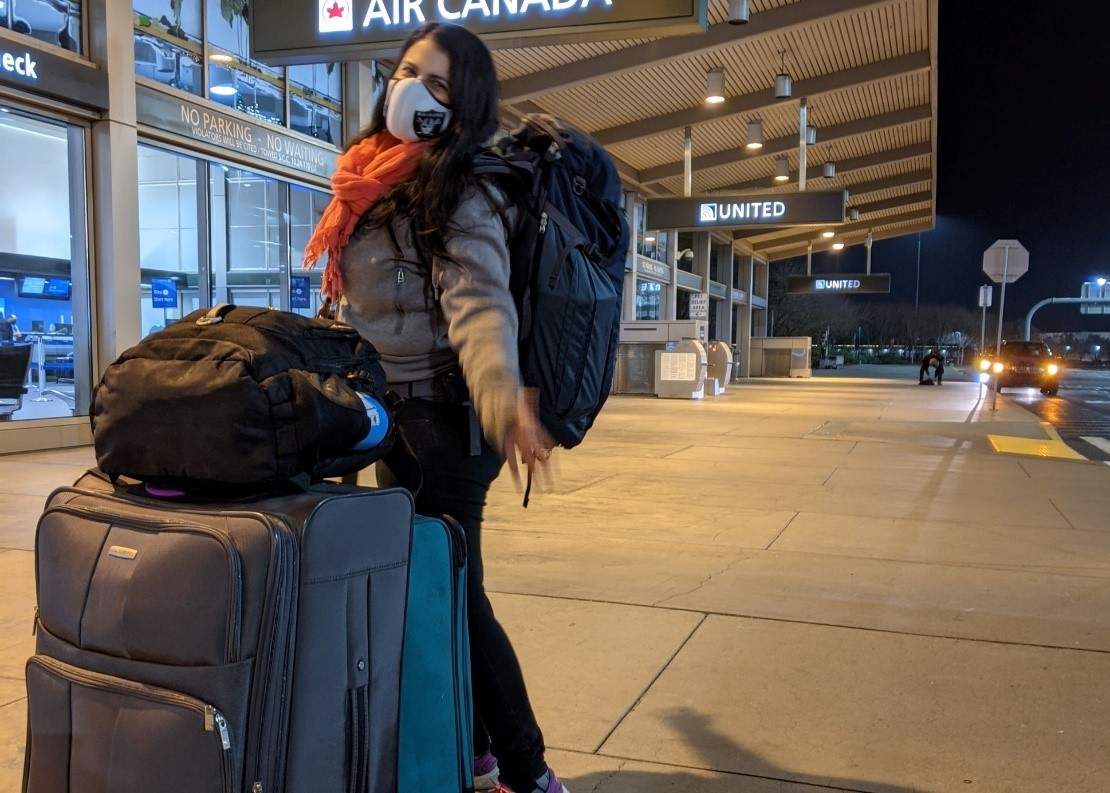
At check-in in SMF I was asked to show my:
Vaccination Certificate - no longer required as of April 6, 2022 PCR Results - no longer required as of April 6, 2022 Passport Cuba QR Code
I had a very short layover but it doesn’t take much time. There is a Cuba Travel Services stand in the boarding area where they checked my visa and stamped by boarding pass “Cuba Ready”. If you need to buy a visa, that’s where you’ll do it, it takes less than 5 minutes. Boarding my flight to Havana they checked my passport and stamped boarding pass (this also serves as proof of medical insurance). Normally at some point during the check-in process I am asked to verbally state my category of general license, oddly, this time no one asked. American Airlines used its big dog for this flight, the 9-seats across plane and it was full.
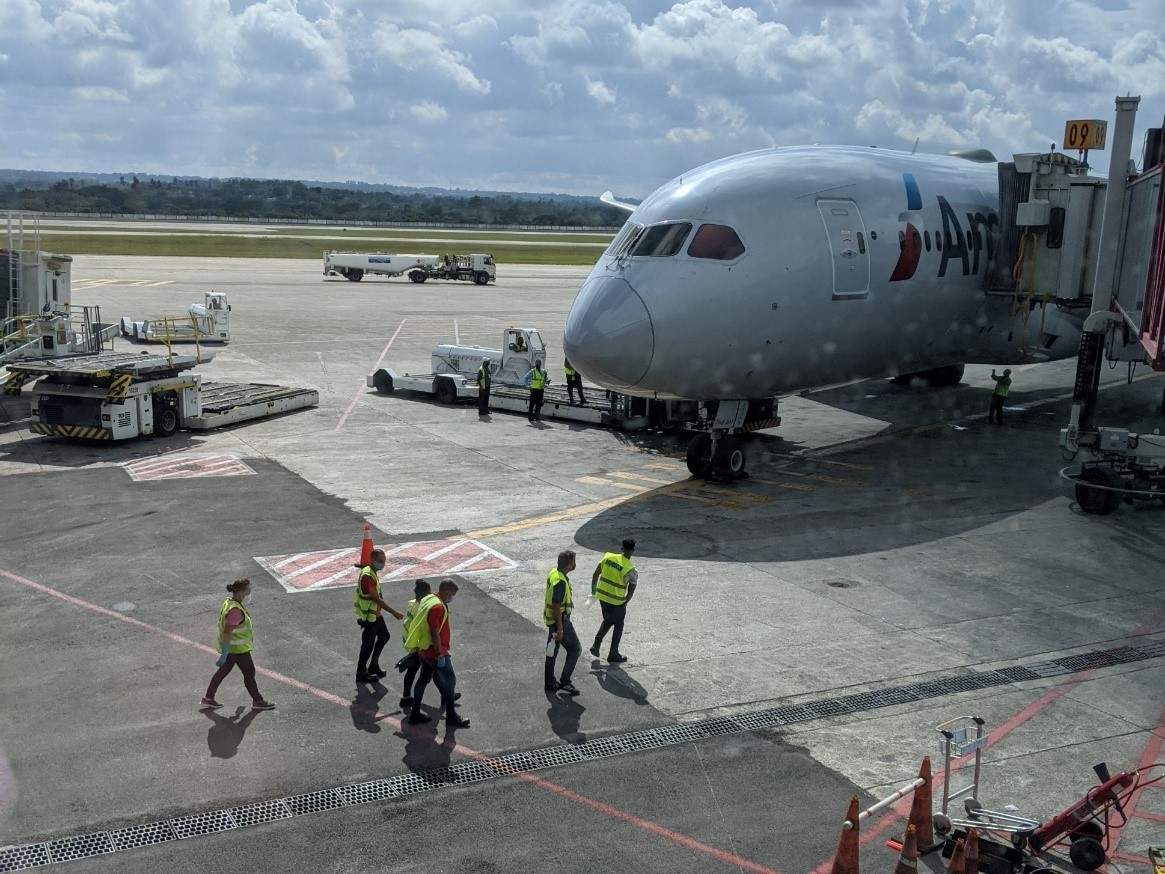
Arriving at Jose Marti Airport
The good thing about flying Jet Blue or American is that the flight arrives at the modern terminal – Terminal 3 . This is convenient for picking up my Tourist SIM because the Etecsa office is right outside. In that same complex is the Ecotur office you’d visit in case you didn’t find your Cuban Adventures airport greeter. If I’d have flown Southwest, I’d arrive in Terminal 2, a taxi ride from Terminal 3 so I’d have either asked the driver to make an extra stop to pick up my SIM or go to an Etecsa office in town.
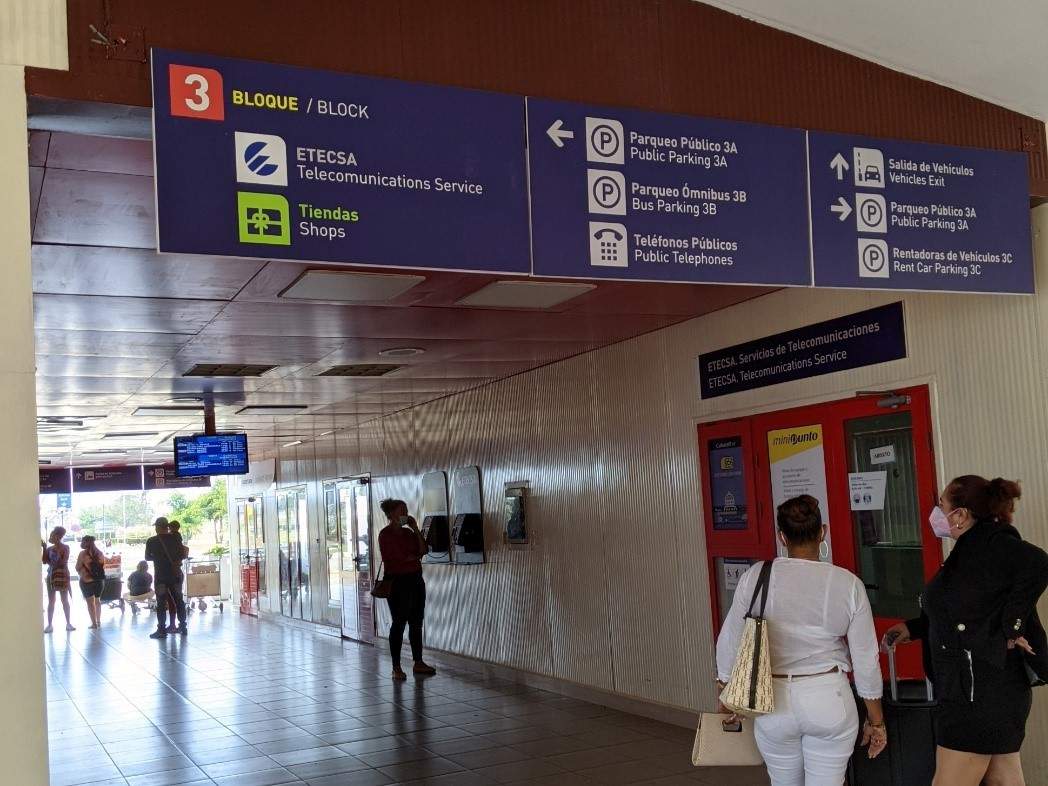
I treated myself to the Airport VIP service so I didn’t have to deal with the baggage claim, I paid $25 in cash. There was a line of VIP escorts offering the service right when I walked off the jet bridge. My VIP escort Manuela* guided me to immigration where my QR code and passport were checked and my visa stamped. I was asked about the countries I recently visited, and then photographed sans all hat, glasses and anything else on my head. Sometimes I am also asked why I’m visiting; this is not the time to say Support for the Cuban People (that’s a US thing). I’d tell them tourism, sightseeing, going to the beach, etc.
Next stop, security x-ray (shoes stay on, no belts, scarves, or jackets). Much to my surprise they now have a body scanner! Yikes.
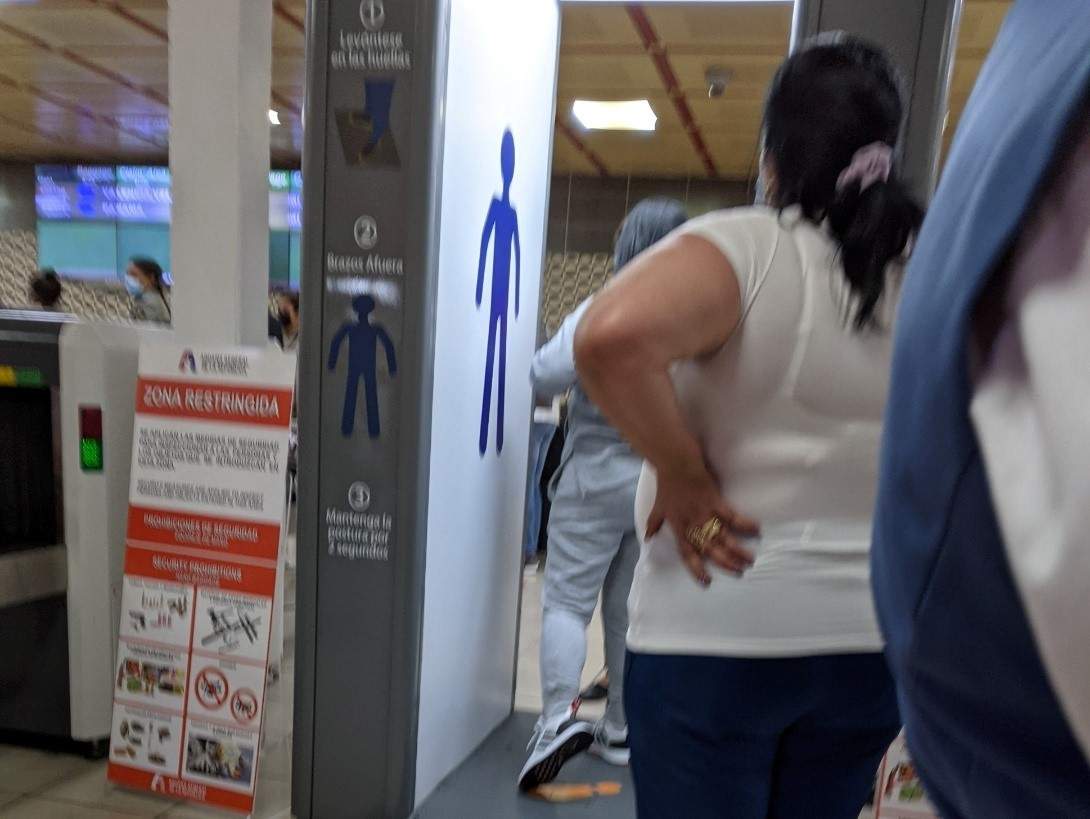
Then Manuela led me to the VIP lounge where I was offered drinks (even beer and rum!) and snacks. Time to sit back and relax and watch bad TV while Manuela looked for my luggage. It took about an hour, but I was comfortable and I’ve waited nearly 3 hours before so I was happy.
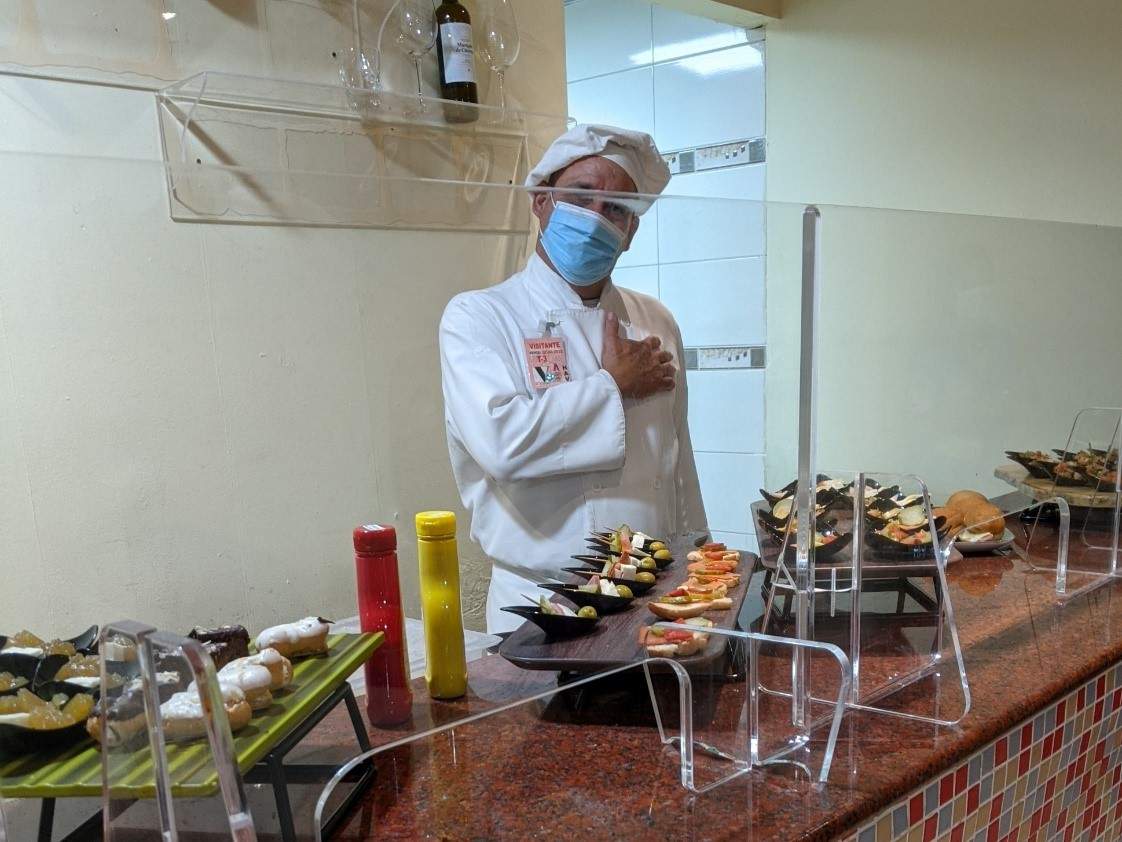
Everyone is supposed to get a half hour free wifi in the Jose Marti Airport (both terminals) but it wasn’t working at the time. There is a smoking room in the lounge for those that need it (leave your marijuana at home).
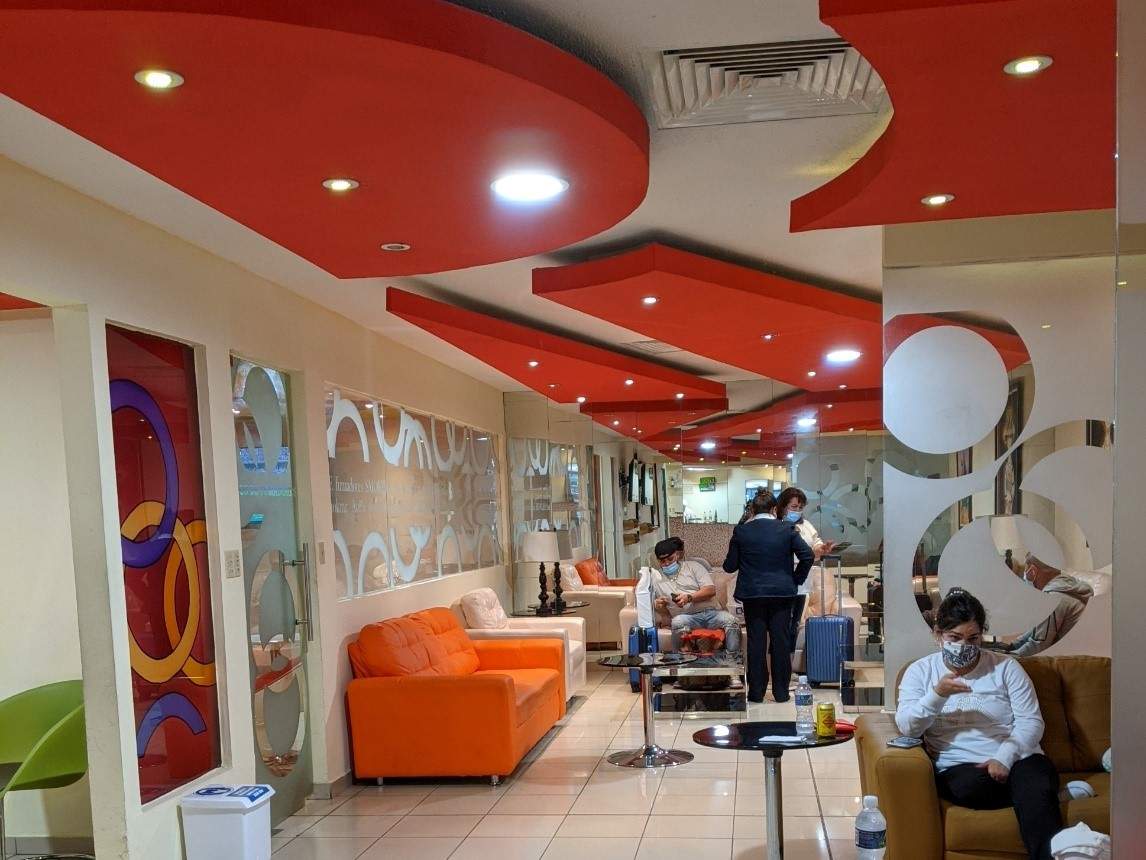
Once Manuela found my luggage, she loaded it on to a cart and guided through customs where I showed my QR code again to exit the airport. Normally when I’m bringing a lot of stuff my luggage gets flagged for inspection, and I have to explain that everything is a gift. I think Manuela worked a bit of magic. I tipped her a $5.
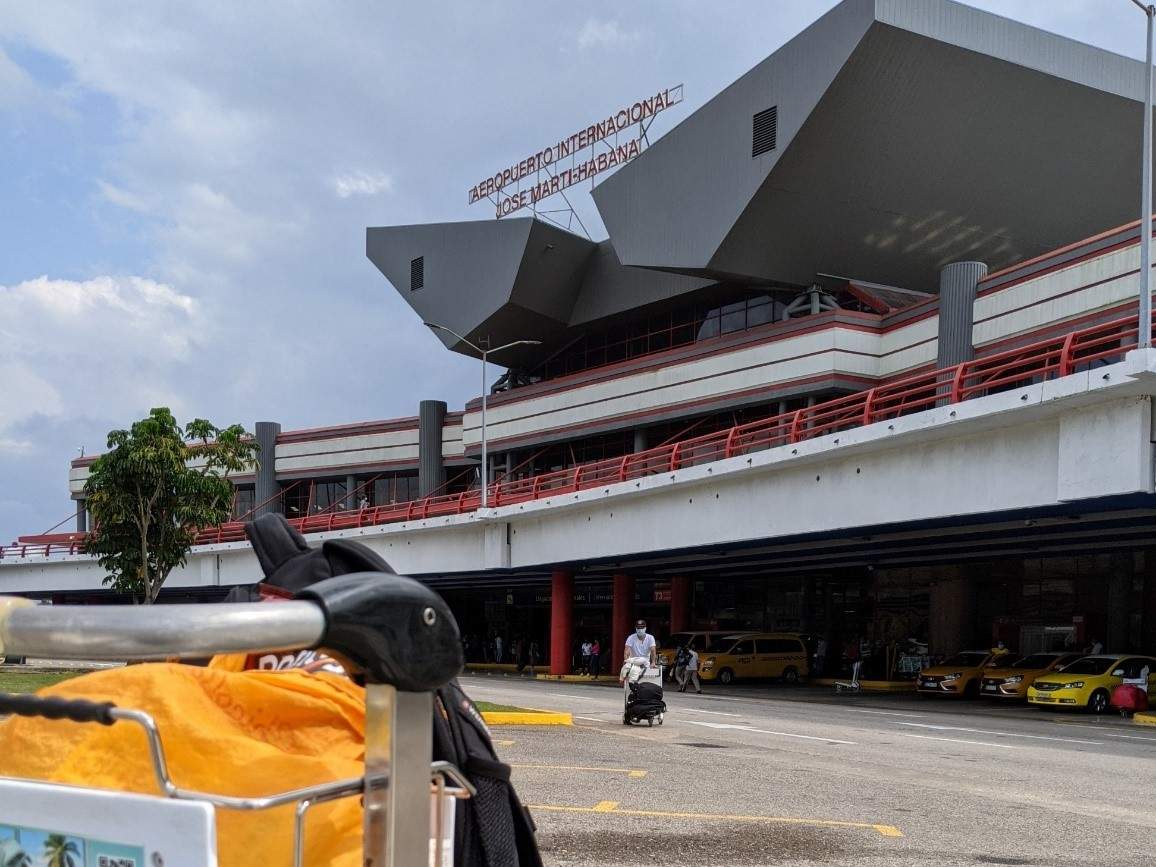
Getting to Havana
Outside the airport there were plenty of cabs , both yellow taxis and classic cars, all of which should charge the same price. If you don’t have airport pickup, there are lots of people asking if you need a ride. Some are the drivers, and some are just spokespeople for the drivers and will lead you to the driver when you accept the offer. The first time I came this made me a bit nervous, but now I know it’s just how it works. I paid $25 for the 30-minute drive to Centro Habana, same price to all tourist neighborhoods.
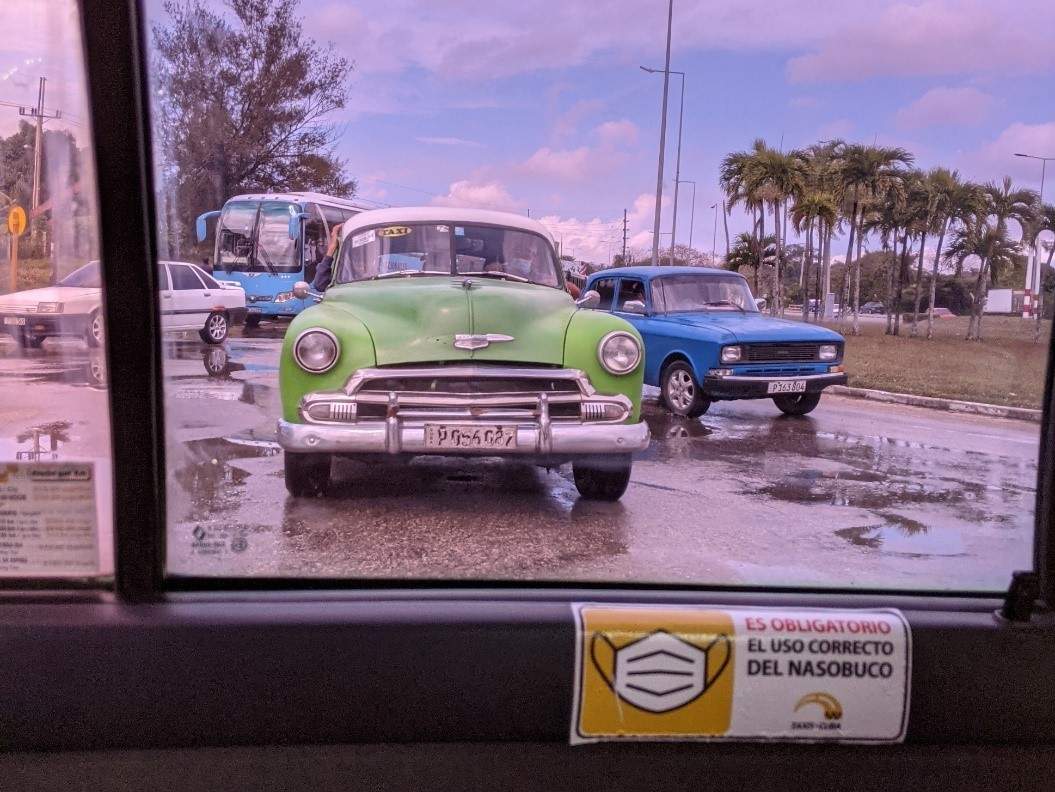
I arrived in the middle of the coldest period in Havana history where Cubans don’t leave the house unless absolutely necessary, which means the streets were even more deserted than usual. In all fairness, it was pretty darn cold. Who knew it could get down to 40-something degrees in Cuba? Havana was changed but still wonderful, read about my experience.
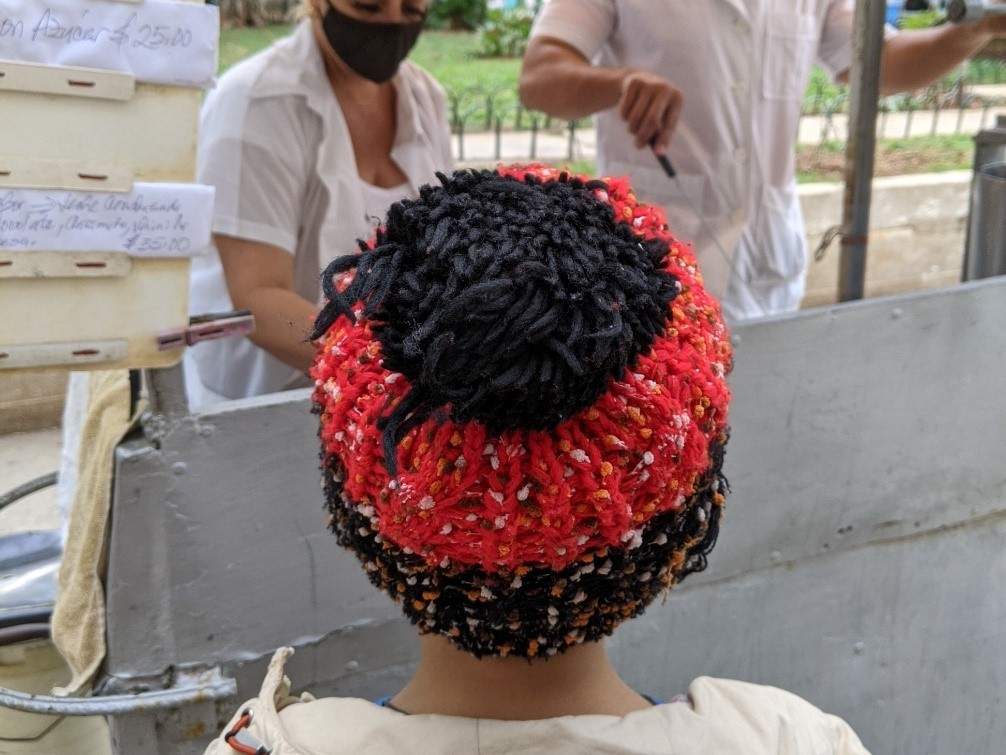
Leaving Cuba
To get back to the US, residents must have either the Antigen test or a doctor’s note that confirms recovery from Covid within the past 90 days.
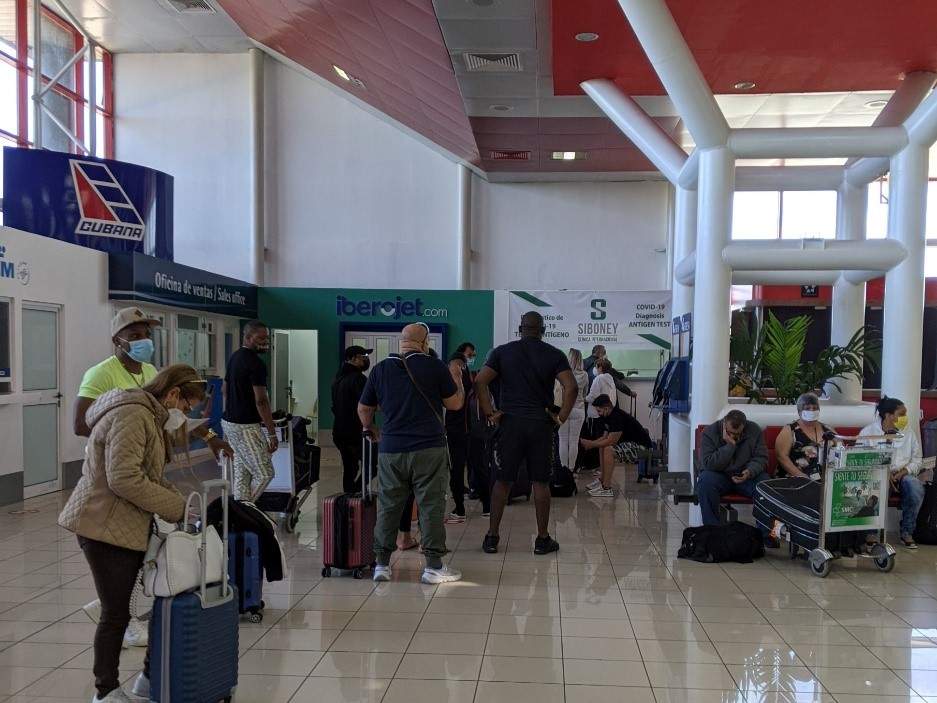
Because my video antigen test experiment had failed, I would have taken the rapid test at the Siboney Clinic kiosk in the airport (available at both terminals) and I would have been able to report back exactly how long I waited, how much, and payment method. But because I was hobbling on sprained ankle by then, I didn’t want to be on my feet any longer than necessary so I went the doctors note route. I can only say that the testing line wasn’t too long, the process seemed to go smoothly, and I have heard it costs $30 and by some miracle, they accept US credit cards. I’d give myself an extra hour to do the antigen test at the airport (so, arrive at least 3 hours before flight). If you’re on one of our tours, the guide will help arrange the test.
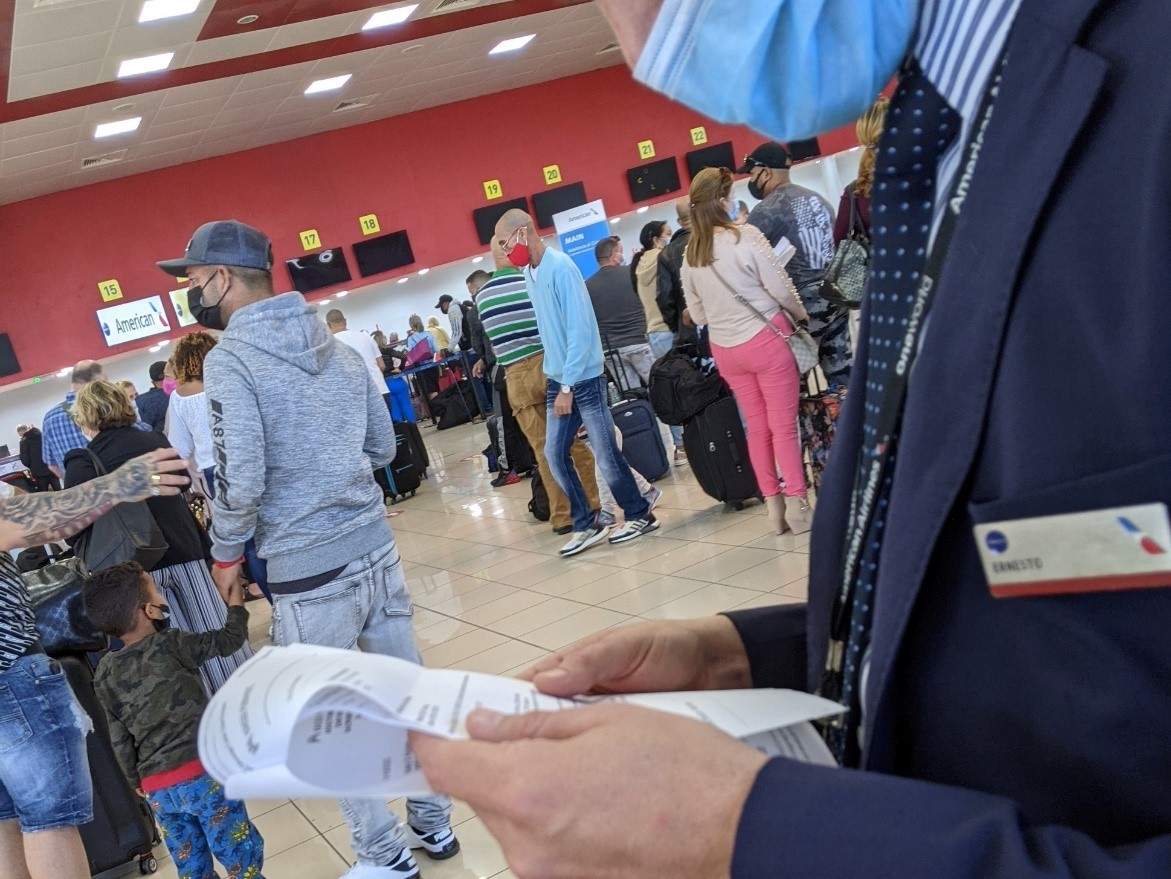
Instead, I handed over my doctors note, and a just-in-case printout of the CDC rules. The airline agent seemed taken by surprise and went over the paperwork very carefully (I had to explain that an E-Signature is a signature), but it worked!
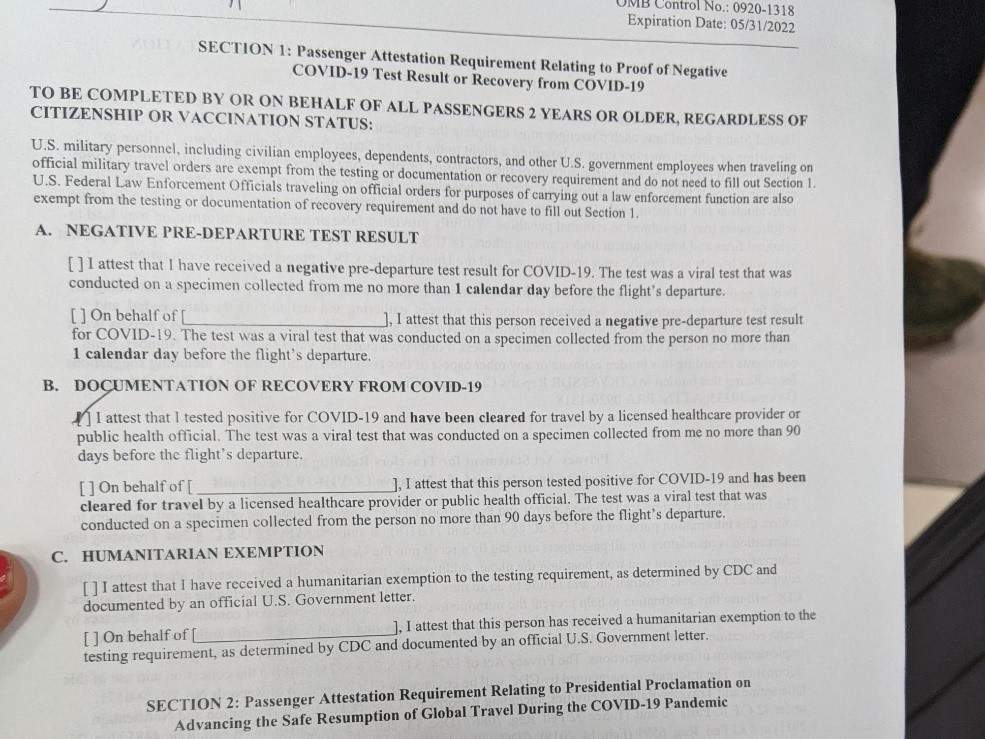
Then it was just a matter of going back through immigration (they take your visa so make sure you don’t lose it), security (this time no shoes, my water always makes it through) and on to my flight back to Miami.
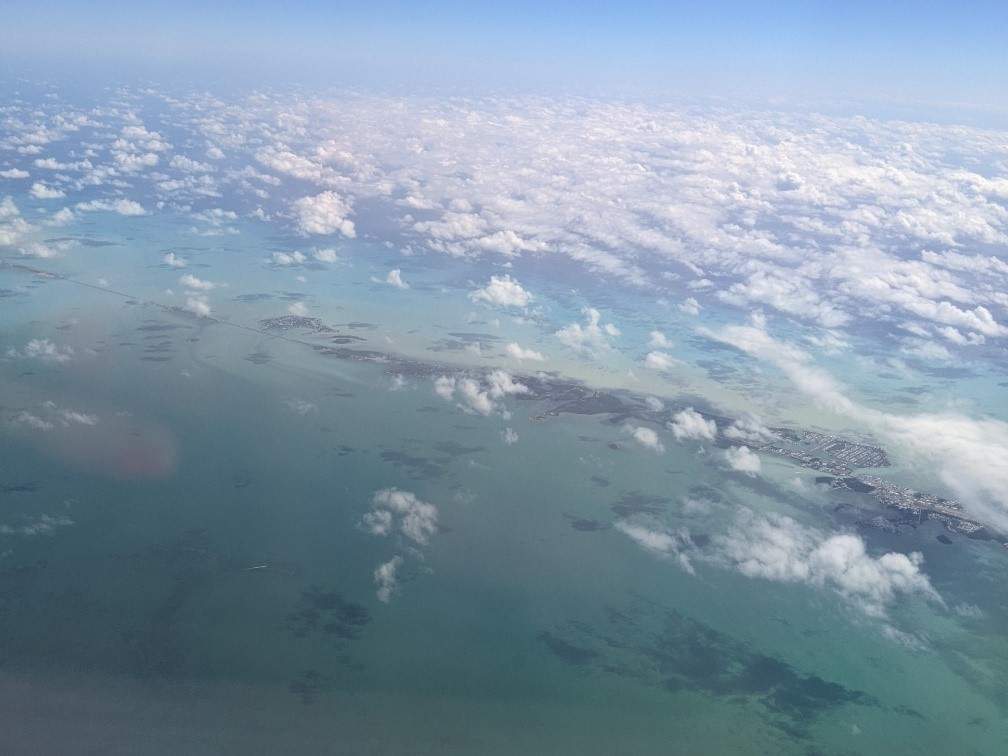
Back in the U.S.
This was my 17th trip to Cuba, and I’d say about 6 times I’ve been asked more than the perfunctory “Why were you in Cuba?” question, to which the answer is always “Support for the Cuban People” . This lady wanted to know how I supported the Cuban people, where I stayed, what I did all day, and of course, whether I brought back alcohol or tobacco. I answered her questions easily: bringing donations and supporting private businesses, stayed in a casa particular, interacted with locals, no alcohol or tobacco. Satisfied, she waived me through.
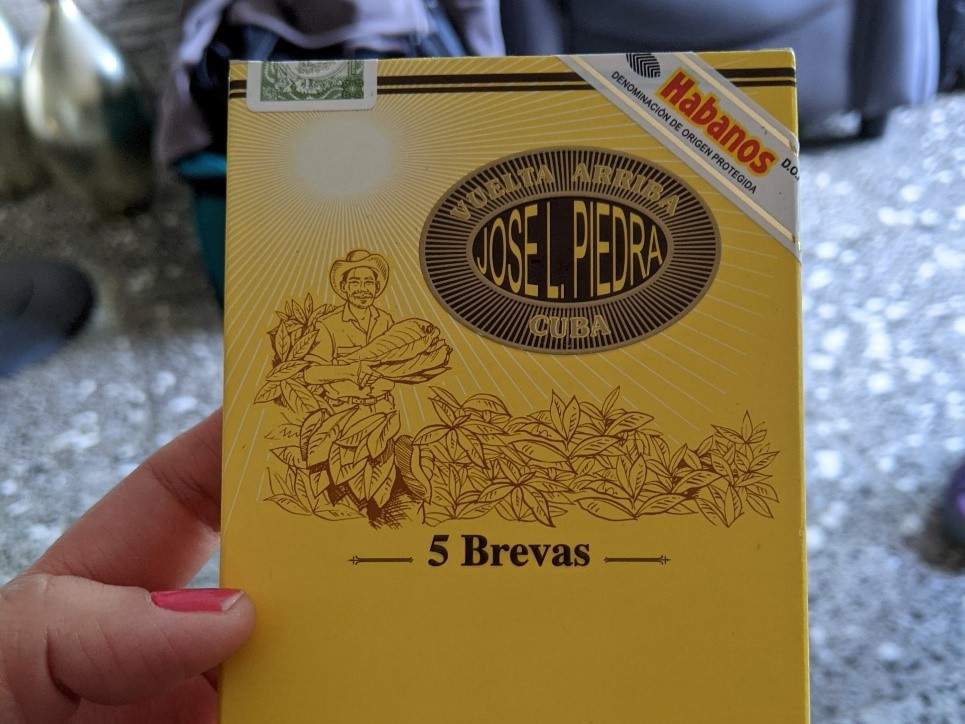
The Trump Era prohibition on bringing back alcohol and tobacco is a real bummer because I had to turn down a gift from a friend who had very kindly bought cigars for me to take back for my father-in-law and husband. But, as with all processes run by humans, the enforcement of this rule is arbitrary, because I saw a woman with duty-free bag of rum who had clearly made it through immigration. The whole process to re-enter US will vary, but for most people, coming back from Cuba is not much different than coming back from Mexico or the UK.
Home sweet home and eager to go back to Cuba! If you have any questions drop them in the comments section!
Be the first to comment!
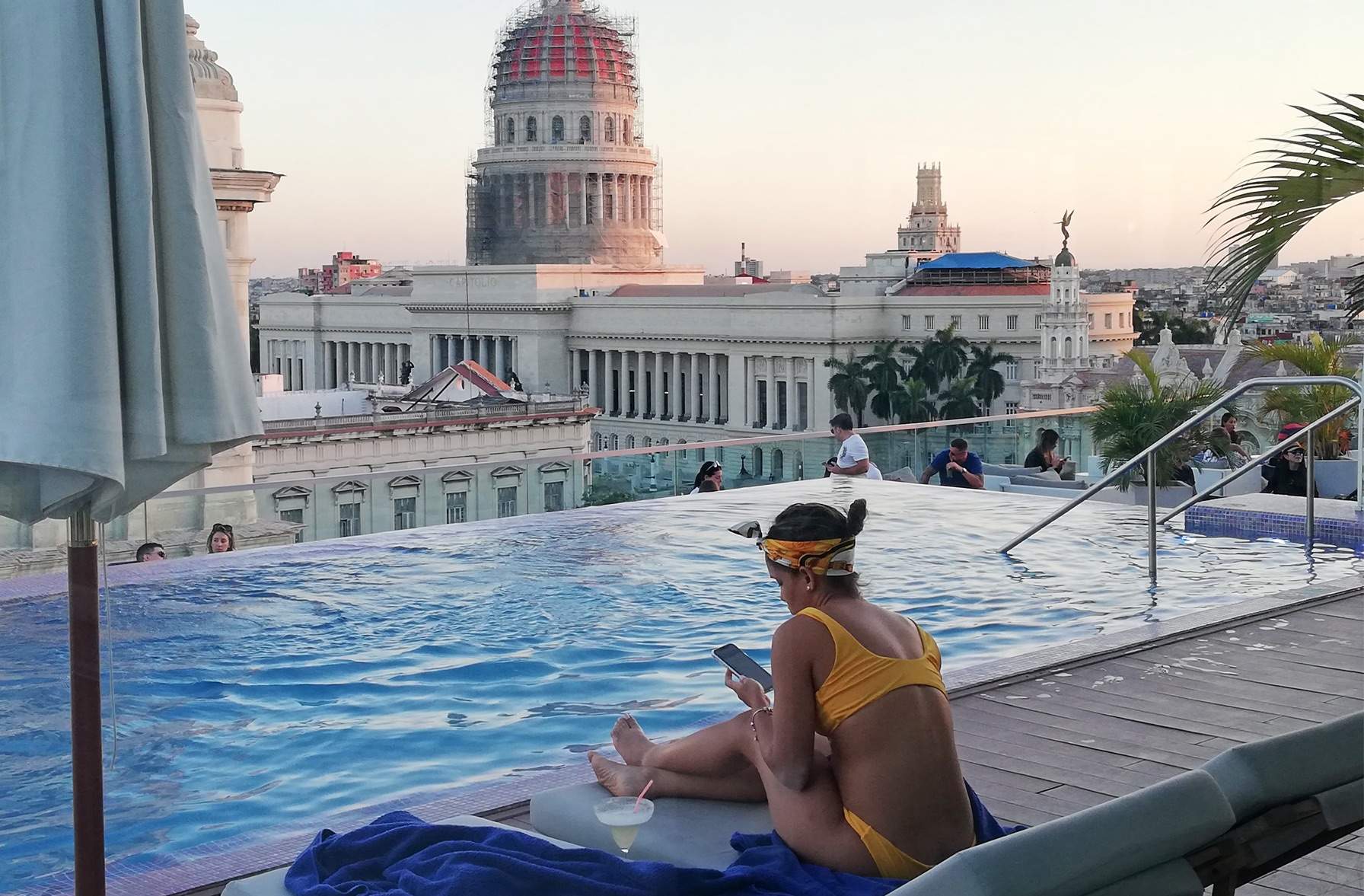
An in-depth explanation of what Trump has changed to the Cuba travel rules and regulations in June 2019 and why.
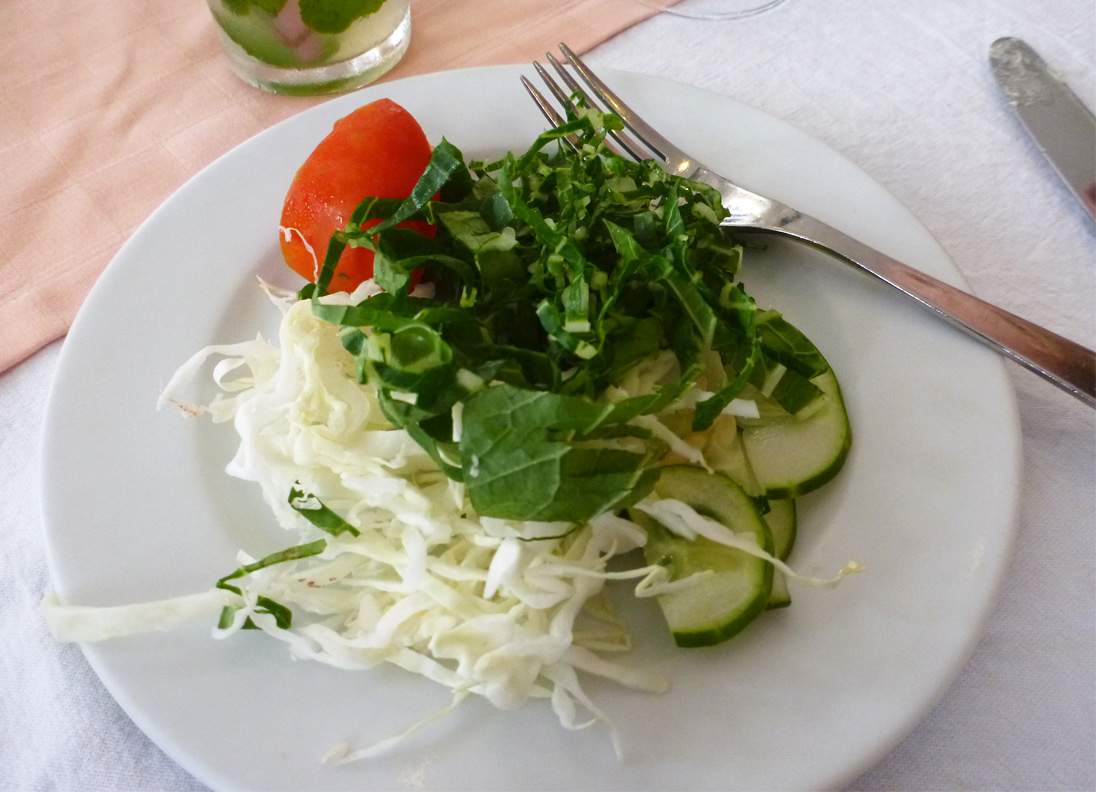
Going Vegan or Vegetarian in Cuba? Here is a restaurant guide for finding the best plant-based food in Cuba.

Sarah gives her tips on where to eat in Havana when you just can't deal with Cuban traditional food anymore.
- North America Tours
Cuba Tours and Trips 2024/2025
Cuba is an island that is full of life, history, and culture. It’s history with both Spain and Africa makes Cuba not only a culturally diverse place, but also a unique meeting of the eastern and western worlds. Looking for a good sandwich? How about a Cuban?...
- Cuba Travel Guide
- Best Time to Visit Cuba
68 Trips in Cuba with 226 Reviews

- Starts Havana, Cuba
- Ends Havana, Cuba
Cuba Getaway: Vibrant Culture, Great Beaches & More
- Free cancellation
- Trip customizable
- Tour Type Independent Tour
- Activities City sightseeing & Beach City sightseeing , Beach , Natural landmarks sightseeing & Cultural, religious and historic sites 'data-more-tripid='15573'>+2 more
- Accommodation Resort, Hotel & Home-stay
- Transport Bus, Private Vehicle, Train & Rickshaw
- Age Range 1-79 yrs
- Operated in English, Spanish
- View More Jan 1, 2019 Jan 2, 2019 Jan 3, 2019

Beautiful Cuba
- Best price guaranteed
- No booking fees
- Tour Type Small Group Tour
- Activities Cultural, religious and historic sites & Local culture
- Accommodation Guest House
- Transport Private Vehicle & Bus
- Age Range 15-99 yrs
- Operated in English
- Brochure Price: US$ 1,705
- Special Deal (15%): - US$ 256
- Total Price from: US$ 1,449
- May 18 Only 8 seats left
- May 25 Only 8 seats left

Round Trip: Best Of Local Cuba
- Tour Type Private Tour
- Activities City sightseeing & Beach City sightseeing , Beach & Cultural, religious and historic sites 'data-more-tripid='16831'>+1 more
- Accommodation Hotel & Home-stay
- Transport Bus, Rickshaw & Taxi

Best of Cuba
- Accommodation Guest House, Hostel & Hotel
- Transport Private Vehicle, Flight, Taxi, Bus & Boat
- Brochure Price: US$ 2,285
- Special Deal (15%): - US$ 343
- Total Price from: US$ 1,942
- May 12 Only 7 seats left
- Jun 23 10+ seats left

8 Day Original Cuba Tour
- Activities Walking tours & Local culture Walking tours , Local culture , National parks , Snorkeling , Party and nightlife , Art and architecture , Museum and gallery visits & Cultural, religious and historic sites 'data-more-tripid='38435'>+6 more
- Accommodation Guest House & Resort
- Transport Bus, Private Vehicle & Taxi
- Age Range 2-80 yrs
- Operated in English, German, Spanish

Locally Cuba
- Activities City sightseeing & Natural landmarks sightseeing City sightseeing , Natural landmarks sightseeing , Beach , Art and architecture , Farm and plantation visits , Rickshaw, cycle or local transport tours & Honeymoon 'data-more-tripid='16167'>+5 more
- Accommodation Resort & Home-stay

Cuban Rhythms: Beachfronts & Havana Vibes
- Activities Wildlife & Cultural, religious and historic sites Wildlife , Cultural, religious and historic sites , Explorer & Safari 'data-more-tripid='4611'>+2 more
- Transport Private Vehicle
- Age Range 18-39 yrs
- Brochure Price: US$ 949
- Special Deal (25%): - US$ 238
- Total Price from: US$ 711
- May 02 Only 4 seats left
- Jun 27 10+ seats left

9 Days: This Cuban Life
- Activities Local culture & Walking tours Local culture , Walking tours , Cooking classes , Museum and gallery visits , Cultural, religious and historic sites & Natural landmarks sightseeing 'data-more-tripid='41562'>+4 more
- Accommodation Guest House & Hotel

Cuba Getaway - Havana & beyond in 5 days
- Activities Sightseeing Tours

A Taste of Cuba
- Activities Cultural, religious and historic sites & Natural landmarks sightseeing Cultural, religious and historic sites , Natural landmarks sightseeing & Local culture 'data-more-tripid='7553'>+1 more
- Accommodation Hotel
- Transport Private Vehicle, Train & Taxi
- Age Range 16-95 yrs
- Oct 05 Only 8 seats left
- Nov 02 Only 8 seats left

Cycling Cuba
- Activities Bicycle tours
- Transport Taxi
- Oct 12 Only 8 seats left
- Nov 09 Only 8 seats left

Treasures of Cuba
- Activities Cultural, religious and historic sites & Explorer
- Accommodation Hotel, Resort, Home-stay & Villa
- Transport Private Vehicle & Taxi
- Age Range 12-95 yrs
- Brochure Price: US$ 1,899
- Special Deal (25%): - US$ 475
- Total Price from: US$ 1,424
- May 11 Only 7 seats left
- Jun 15 10+ seats left

Cycle Cuba: West
- Transport Bus & Private Vehicle
- Brochure Price: US$ 1,430
- Special Deal (10%): - US$ 143
- Total Price from: US$ 1,287
- Jul 01 10+ seats left
- Oct 07 Only 4 seats left

Cuba Libre!
- Activities Active and outdoor & Explorer Active and outdoor , Explorer , Cultural, religious and historic sites & Adventure 'data-more-tripid='21843'>+2 more
- Accommodation Hotel, Hut, Villa, Resort, Tent & Guest House
- Transport Bus, 4WD Jeep, Private Vehicle & Taxi
- Brochure Price: US$ 2,420
- Special Deal (14%): - US$ 340
- Total Price from: US$ 2,080
- Oct 05 10+ seats left
- Oct 19 10+ seats left
Traveling to Cuba? Chat with a local travel specialist in Cuba who can help organize your trip.
Cuba Tour Reviews
Cuba - tour highlights and travel tips.

Cuba is an island that is full of life, history, and culture. It’s history with both Spain and Africa makes Cuba not only a culturally diverse place, but also a unique meeting of the eastern and western worlds. Looking for a good sandwich? How about a Cuban?
Tour Highlights
- Go and delight in the Ballet Nacional de Cuba, Cuba’s national ballet.
- Enjoy a game of baseball, football, cricket, or basketball.
- Listen and get your feet moving to mambo, cha-cha-cha, and salsa.
- See some of the classic cars that line the streets of Havana.
- Go and visit the small city of Trinidad.
- Soak up the sun on one of Cuba’s many beaches - a must do when on a trip to Cuba.
- Hike the Sierra Maestra Mountains, and enjoy the rural nature the island has to offer.
Travel Tips
- Bring a guidebook; Cuba has terrible Internet connection.
- Know your money; there are two different types of pesos.
- Don’t engage the hustlers on the street; if you appear disinterested, they’ll leave you alone.
- Don’t talk politics; with Cuba’s checkered history comes discomfort.
- Drink only bottled water.
- Learn Spanish; it will make your life easier during a holiday in Cuba.
- Don’t stay in hotels; go with Casas Particulares (private houses or homestays).
Cuba has seasonal weather so please do check up on the best time to visit Cuba before planning your tour. And if you’re still hunting for more things to do and places to explore in Cuba, do check out our Cuba Travel Guide for more information.
- Cuba budget tours
- Eco tours in Cuba
- Cuba guided tours
- Cuba family tour packages
- Cuba luxury tours
- Cuba private tours
- Cuba self-guided tours
- Cuba small group tours
- Cuba solo trips
- Cuba tailor-made vacation packages
- Cuba tours for senior citizens
- Cuba tours for young adults
- Cuba group tours
- Cuba last minute deals
- Cuba travel deals
Popular Destinations
- Havana Tours
- Varadero Tours
Popular Activities
- Cultural, religious and historic sites tours
- Local culture tours
Upcoming Departures
- Spring 2024/2025
- Summer 2024/2025
- Winter 2024/2025
- August 2024
- September 2024
- October 2024
- November 2024
- December 2024
- January 2025
- February 2025
- August 2025
- September 2025
- October 2025
Best price guaranteed - No booking fees
Sign-in to unlock instant trip discounts. Create wish lists and save up to USD 1,500.
We’re sorry, this site is currently experiencing technical difficulties. Please try again in a few moments. Exception: request blocked
Travel Requirements For Cuba in 2022

Is it possible to travel to Cuba in 2022? What are the entry requirements to Cuba nowadays? If you are seeking an answer to one of these questions, this article is for you. At Espíritu Travel we are in love with the stunning beaches, the vibrant culture and the amazing people of Cuba, so we have put together some very useful information for those who are thinking about traveling to this country in 2022.
All you need to know about Cuba’s COVID-19 entry requirements
Even though COVID-19 has completely changed the way we live and travel, it seems like little by little things are going back to the old normality. It is actually possible to visit Cuba from July 2020. However, Cuba’s entry requirements and restrictions were very strict until November 2021. Rules changed again on 5th January 2022 when it became mandatory to be fully vaccinated against COVID-19 to travel to the country.

This is an up to date list of all the documents that you will need to enter Cuba, including COVID-19 related ones:
- Valid passport. To avoid any issues, make sure your passport will be valid for at least another six months before your departure.
- Cuba Tourist Card. Tourist Cards can be purchased at the airport before checking in for your flight or at the gate at your last point of departure from the US (e.g Miami).
- Travel insurance. Mandatory medical insurance for entry into Cuba is included with the purchase of your flight. Or you can purchase travel insurance which would include the mandatory medical insurance as well as trip cancellation protection.
- COVID-19 Vaccination Certificate . It is mandatory for anyone above 12 years old to be fully vaccinated against COVID-19 to visit Cuba.
- Proof of a negative COVID-19 test (RT-PCR). You will need to get a PCR test performed no later than 72 hours prior to entering Cuba.
- Cuba Health Declaration Card. This declaration must be completed online before your trip.
- Return flight ticket.
Is it safe to travel to Cuba in 2022?
Another question that might pop into your mind is, what is the current situation in Cuba with COVID-19? According to official data, the number of people infected with COVID-19 in Cuba seems to be decreasing. In terms of vaccination, more than 90% of the population has received at least one dose of the vaccine.

Nevertheless, like most countries in the world, the Caribbean island has some safety measures in place to avoid spreading the virus. As right now, face masks (called by locals “nasubuco”) must be worn in all public areas in Cuba , and social distancing of a minimum of 1.5 meters is mandatory. To be extra safe, we also recommend that you bring hand sanitizer and disinfectant wipes to your trip.
In conclusion, the answer to your question is yes! The safety measures and travel requirements to enter the country make Cuba a safe destination to travel to.
If you feel like you need any extra information about how you can safely travel to or around Cuba right now, you can contact Espíritu Travel . We have a team of local experts that will provide you with updated information.
What can I do in Cuba?
From old Havana to colonial Trinidad, Cuba is a treasure full of natural beauty and breath-taking history and architecture. There are plenty of places to visit and things to do on the Caribbean’s largest island . Don’t worry; hotels, restaurants, and attractions are open now in Cuba.
If you don’t know how to start organizing your trip to Cuba to make the most out of it, check out the website of Espíritu Travel to get inspired . We offer customized itineraries that will take you to the most attractive places in Cuba. As specialists in the area, we can also help you design a personalized journey that meets all your needs and preferences.
You can book your trip with us without questioning the negative impact that your journey will have on the country. At Espíritu Travel we strongly believe in sustainable tourism and responsible travel . You can read more about our values here.
Leave a Reply Cancel reply
Your email address will not be published. Required fields are marked *

Our Trips to Inspire
- Long weekend in Havana
- Havana & Viñales
- Havana & Varadero
- Week in Cuba
- Uncovering Cuba
- Explore Cuba
- Scuba Diving in Cuba
- Santiago & Eastern Cuba
- Havana Imagined Photography Workshop
Plan your Trip
- Accommodations in Cuba
- Flight information
- Itinerary disclaimer
- Cuban money
- Passports and visas
- Custom and private trips to Cuba
Additional Information
- Responsible tourism policy
- Travel Insurance
- Terms and conditions
- Privacy policy
- Cancellation policy
Espíritu Travel Offices
32a Stonehouse Lane Keene, NH 03431 +1 800 387 1370 [email protected]
Calle Apodaca #352 Old Havana 10200 [email protected]
Cookies on GOV.UK
We use some essential cookies to make this website work.
We’d like to set additional cookies to understand how you use GOV.UK, remember your settings and improve government services.
We also use cookies set by other sites to help us deliver content from their services.
You have accepted additional cookies. You can change your cookie settings at any time.
You have rejected additional cookies. You can change your cookie settings at any time.
- Passports, travel and living abroad
- Travel abroad
- Foreign travel advice
Warnings and insurance
The Foreign, Commonwealth & Development Office ( FCDO ) provides advice about risks of travel to help British nationals make informed decisions. Find out more about FCDO travel advice .
Before you travel
No travel can be guaranteed safe. Read all the advice in this guide and any specific travel advice that applies to you:
- women travellers
- disabled travellers
- LGBT+ travellers
Follow and contact FCDO travel on Twitter , Facebook and Instagram . You can also sign up to get email notifications when this advice is updated.
Travel insurance
If you choose to travel, research your destinations and get appropriate travel insurance . Insurance should cover your itinerary, planned activities and expenses in an emergency.
Related content
Is this page useful.
- Yes this page is useful
- No this page is not useful
Help us improve GOV.UK
Don’t include personal or financial information like your National Insurance number or credit card details.
To help us improve GOV.UK, we’d like to know more about your visit today. We’ll send you a link to a feedback form. It will take only 2 minutes to fill in. Don’t worry we won’t send you spam or share your email address with anyone.

Beyond the Ban: A Guide to Americans Visiting Cuba in 2024.
If you are a US citizen, you can still visit Cuba in 2024. However, unlike your neighbors traveling from Canada , you will be subject to specific regulations from the US government.
For example, doing “tourism,” like staying at a resort on a Cuban beach , isn’t allowed. Your trip must fall into one of 12 categories of authorized travel to Cuba. You must also comply with certain financial restrictions while on the island.
This article offers our first-hand experience organizing trips from the US to Cuba for over seven years. We will answer all your questions about going to Cuba as an American, including the entry requirements, the 12 categories of authorized travel, People-to-People travel, the Support for the Cuban People license, and much more.
In this guide, we cover all of it.
Can Americans Travel to Cuba in 2024?
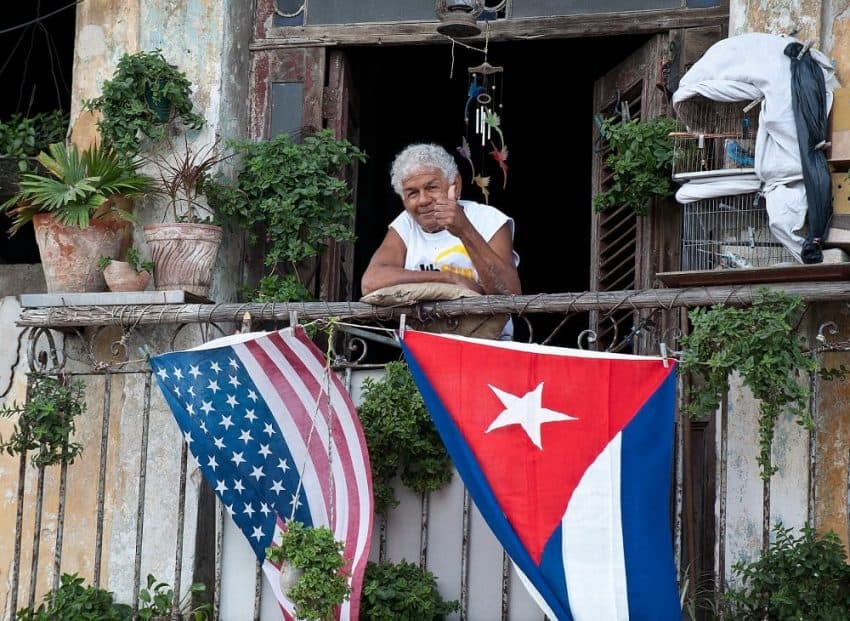
The simple answer is yes. It’s perfectly legal for Americans to travel to Cuba, except for explicit tourism purposes.
Americans can’t go to Cuba for tourism thanks to the Cuban Assets Control Regulations of July 8, 1963, which imposed a trade embargo on the island.
However, you can travel legally to Cuba if you comply with certain Cuban and US government regulations.
Specifically, the Cuban government asks you to bring the following documentation:
- The Cuban Tourist Card (a.k.a Cuban Visa).
- Health travel insurance.
- Customs and health declaration forms.
On the other hand, the US government requires you to:
- Self-certify under one of the 12 travel categories of authorized travel to Cuba
- Avoid spending money at certain restricted businesses.
- Keep your travel receipts and records for five years.
Does that sound like a lot? In the sections below, we explain how to meet these requirements so you can travel legally to Cuba from the US.
The Cuban Tourist Card
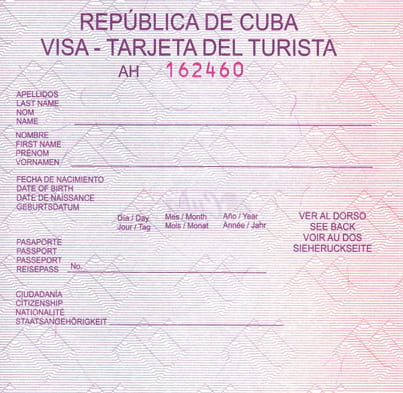
The Cuban Tourist Card is a tourist visa that almost everyone traveling to Cuba for tourism must bring. They come in two colors: pink and green.
In most cases, US citizens must get the pink Cuban Tourist Card because they fly directly from a US airport to Cuba. However, if you plan on leaving from a non-US airport, you will need the green version.
In any case, we suggest you purchase the Cuban Tourist Card through your airline or on EasyTouristCard.com .
Buy it From Your Airline
The cost of the Cuban tourist visa is usually bundled into the ticket price. However, in some cases, you will need to purchase the visa separately. Prices range from 50 to 80 US dollars, depending on the airline.
Please note that only a few US airlines fly to Cuba. Check out Skyscanner to find all available flights from the US to Cuba.
Purchase it on EasyTouristCard.com
If you can’t get the Cuban Tourist Card through your airline, the best alternative is to purchase it online from Easy Tourist Card , a widely trusted provider.
The pink version costs about 100 US dollars, while the green version sells for roughly 35 US dollars.
Mandatory Travel Health Insurance
Travel health insurance is an entry requirement to Cuba.
Your policy must cover emergency medical treatment, hospitalization, and repatriation. The Cuban government won’t allow you to leave the country with outstanding medical bills!
Based on our assessment of the most popular travel health insurance providers for Cuba , we recommend Insubuy .
On Insubuy , coverage for medical emergencies, hospitalization, and repatriation starts at 8 USD per week per person and is pretty comprehensive.
Customs and Health Declaration Forms
Cuba requires all travelers to bring a Sanitary Statement and a Customs Declaration form.
You can complete the documentation at D’Viajeros , the government’s website. It will save you time and annoyance at the Havana Airport !
The 12 Categories of Authorized Travel to Cuba
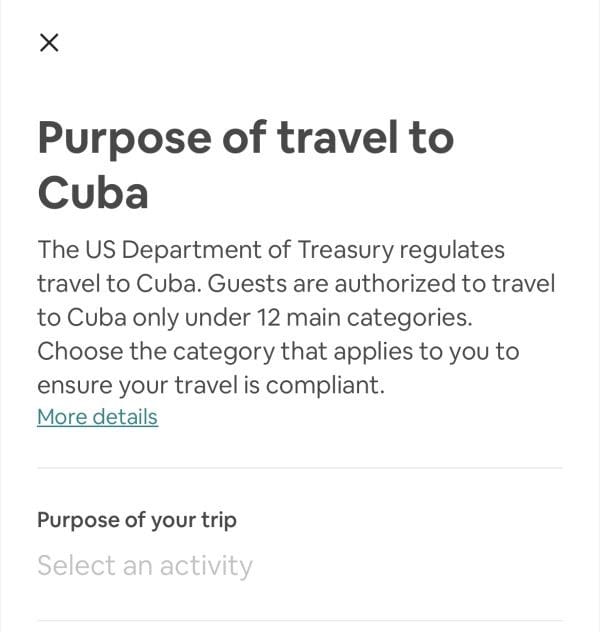
A “category of authorized travel to Cuba” is also known as a “travel license” or “general license.”
Confusingly, even though it’s called a license, it is not a physical or digital document. It’s a self-certification you need to do when travel providers, such as airlines and hotels, ask you about it. In most cases, it’s just about ticking a box.
Obviously, before you tick that box, you should review whether you meet the criteria for traveling to Cuba under your chosen category.
There are 12 categories of authorized travel to Cuba , as defined by the Office of Foreign Assets Control (OFAC):
- Family visits
- Official business for the US government, foreign government, and certain intergovernmental organizations
- Professional research and professional meetings
- Educational activities
- Religious activities
- Public performances, clinics, workshops, athletic and other competitions, and exhibitions
- Support for the Cuban People
- Exportation, importation or transmission of information or informational materials
- Humanitarian projects
- Activities of private foundations or research or educational institutes
- Certain export transactions
In 90% of the cases, a US citizen will travel to Cuba under either the Education Activities or the Support for the Cuban People categories.
Educational Activities (People-to-People Travel)
People-to-people travel falls under the Educational Activities category. This license aims to promote people-to-people contact, support civil society in Cuba, and encourage the Cuban people’s independence from Cuban authorities.
You can travel under this license provided that your trip is:
- Organized by a US travel company (the “sponsoring organization”).
- Escorted by an employee of the sponsoring organization.
People-to-people travel is the best option for Americans who want to go in a group and prefer to avoid the hassle of planning an itinerary in compliance with the US-Cuba travel regulations.
However, not everyone likes the crowds or having a chaperone around. Besides, traveling to Cuba independently is still legal, easy, and safe . For those, there is the Support for the Cuban People category.
The Support for the Cuban People Travel Category
The Support for the Cuban People category intends to promote US travel to Cuba to strengthen civil society on the island. It covers activities that:
- Foster closer connections with the Cuban people,
- Contribute to the development of Cuban civil society, or
- Advocate for the independence of the Cuban people from the government; and
- Involve meaningful engagement and interaction with individuals in Cuba.
American travelers love this category because it’s pretty vague. You have lots of wiggle room and can pretty much do many of the activities you would in any other country.
Here are examples of activities that can “strengthen Cuban society”:
- Visiting museums and historical sites.
- Eating at locally-owned restaurants (paladares).
- Taking Cuban cooking classes.
- Taking salsa dancing lessons.
- Touring a tobacco farm and learning how to roll Cuban cigars.
- Taking a tour through the best of Havana .
- Volunteering with a local organization or non-profit.
How does it sound?
However, we must remind you that you still can’t do tourism in Cuba under the Support for the Cuban People license. In fact, you should spend about 6-8 hours on a schedule of activities actually supporting the Cuban people.
That said, it’s not like an American official will call you daily to verify your schedule, so don’t stress too much about it.
You can also support the Cuban people in less subtle ways by:
- Bringing inexpensive items as gifts for locals . Most essential products you take for granted (toiletries, hygiene products, etc.) are hard to come by in Cuba. Bringing a thoughtful gift will show your appreciation and may meet your hosts’ vital needs.
- Tipping . The base wage for workers in Cuba is the equivalent of a few US dollars a month. Therefore, locals expect and highly appreciate tipping.
Finally, considering that the Internet is limited in Cuba , you should arrange your activities before you land on the island.
Restricted Businesses and Accommodations
The US Treasury Department doesn’t like Americans spending money anywhere in Cuba.
The Treasury keeps a list of businesses to which Americans must refrain from giving money. Most of these businesses are owned by the Cuban military or security services, with which the US still has a frosty relationship. You can see the full, updated list here .
The US government also forbids Americans from staying at specific accommodations listed in the Cuba Prohibited Accommodations List .
To be safe, we recommend renting a room from Cuban Airbnbs , also known as “casas particulares.” These privately owned and highly affordable accommodations can provide you with an authentic Cuban experience.
Check out Skyscanner for the latest listings of “casas particulares” and hotels in Cuba.
Travel Receipts and Records for Five Years
The US government can ask you for your travel records and receipts for up to five years after your Cuba trip.
This sounds spooky, although anecdotally, it doesn’t happen very often. But it’s better to be safe than sorry, so keep your records safe for five years if you’re questioned about your trip.
Bonus Tip for Americans Traveling to Cuba: Stick to Private

Generally, you should purchase most travel services and products from Cuban private businesses.
We know you can’t always stick to this principle because the Cuban government owns most of the travel facilities and services on the island, including hotels, car rental companies , tour agencies, and souvenir shops.
But whenever you can support Cuban entrepreneurs, please do so. You will strengthen the legality of your trip and genuinely help Cuban society.
Besides, if you want to cut your trip to Cuba costs , purchasing from locals will get you more bang for your buck. Not only is it more affordable, but you will likely pay in Cuban currency , the Cuban Peso, which is hugely devalued compared to the US dollar.
This includes:
- Booking tours from local guides .
- Staying in “casas particulares.”
- Eating at “paladares” (check out our food safety guide for Cuba ).
- Riding in private taxis, including “almendrones,” Cuba’s old classic cars .
- Buying souvenirs directly from local sellers.
For more tips and tricks you can pull in your trip to the island, read our 58 travel tips for Cuba .
US Legal Travel to Cuba, Summarized
If you are an American traveling to Cuba, you can break down the process into five relatively simple steps:
- Choose the best travel category to Cuba based on your travel purpose. If you are going in a group, it will likely be Educational Activities (People-to-People travel) or Support for the Cuban People if you travel independently.
- Ensure your itinerary has a full schedule of activities covered by your chosen travel category.
- Avoid booking an accommodation included in the Cuba Prohibited Accommodations List .
- Do not spend money on the specific prohibited businesses in Cuba .
- Keep your records and receipts for five years.
Once you overcome the legal (but easy!) challenges of traveling to Cuba, you will see that the effort was well worth it. If you feel ready but don’t know when, check out our guide to the best time to travel to Cuba .
Have you traveled to Cuba as a US citizen? We want to hear from you. Please share your experience in the comments below!
Essential Travel Logistics For Cuba
Cuban Tourist Card – If your Cuban Tourist Card (a.k.a Cuban Tourist Visa) isn’t bundled into your airline ticket or travel package, buy it only through EasyTouristCard .
Travel Health Insurance – Travel medical insurance is an entry requirement for Cuba, so you can’t skip it. Travelers can get travel health insurance for Cuba via Insubuy . Travel protection benefits such as trip interruption and cancellation, baggage delay insurance, etc., are not required.
Essential Items to Pack – Bring the essential travel necessities that you may not be able to get in Cuba:
- First aid kit
- Hand sanitizer
- Water bottle with filter
- Mosquito repellent
- Pin adapter (for Europeans)
- Travel guide
- Spanish-English phrasebook
- Suggested Reading: The Cubans: Ordinary Lives in Extraordinary Times
Read our complete packing list for Cuba .
Find Accommodations – Find hotels or casas particulares (private accommodations) on Skyscanner , which lists thousands of accommodations available in Cuba.
Book Your Flight – Book cheap flights to Cuba on Skyscanner , our favorite flight search engine to find deals on flights to Cuba.
Share Article:
About the Author
Tour republic.
Tour Republic is a marketplace where you can discover, book, and review the very best experiences Cuba has to offer. We are a team of tourism professionals and journalists who have partnered with Cuban entrepreneurs to provide travel experiences that can transform your trip into a life-changing adventure. We also share our profound love for Cuba through in-depth travel guides, myth-busting articles, and captivating narratives. Whether you want to explore Cuba's wonders or understand its intricacies, our blog posts are your gateway to the heart of this extraordinary country.
Leave a Reply Cancel reply
64 comments.
Assuming we meet all the other qualifications, is there no way for an American to go a beach in Cuba?
Hi Kat, Unfortunately, Americans are not allowed to simply go to the beach. I also don’t see going to the beach as an activity covered by any of the 12 travel categories. Honestly, if you go to the beach, it is unlikely that you will be fined since it’s hard for an US official to know that you did. However, it is not permitted.
Hola, queria saber si mi novia con ciudadania estadounidense y salvadoreña tiene que pedir algun tipo de visado especial ? Yo soy cubano con pasaporte cubano aun vigente.
Hi we booked our tour package from Canada, flight plus stay at the resort. I understand that my husband (Canadian citizenship) won’t have any problems, but for me (US Citizenship, Canadian resident) do I need to book separately a casa particulares to get into the country? And when i get in there, can I stay with my husband at the resort?
Hi juju, According to the regulations, you shouldn’t. First, you need to make sure that the resort is not on the restricted list . Secondly, keep in mind that Americans are not allowed to go to Cuba only for tourism purposes. Therefore, you should have an schedule of activities that fall under any of the 12 general licenses to travel to Cuba, as explained in the article.
The question: “Do you need a password to Cuba?” Should be: Do you need a PASSPORT to Cuba?
Fixed. Thanks a lot!
Thank you for the great information , very helpful . As an European flying from Miami to Havana with a valid ESTA visa could I enter back the USA with on the same Esta visa . Not easy to get as answer on the official us pages . Thanks .
It appears that you will need to apply for a visa to re-enter the United States. Read more here .
I tried to buy the pink visa on easy tourist but almost at the end my country is not on the list. Puerto Rico is part of USA but can’t complete the order. They wrote me but do not get the problem of the country. Where else can I buy online?
Hi, I’m Italian and I would like to travel to Cuba via Miami, but it seems the nationality doesn’t matter because we need to declare a specific category. But what if I just need to go to Cuba from USA with a one-way flight and I will come back home directly from Cuba to Europe?
How did it go? Where you able to do the trip as mentioned?
I am an adult I was born in the US. Lived here my whole life.
My mom and dad were born in cuba, came to America in the 90s, and got their citizenship over 8 years ago.
I believe for my parents to travel to cuba they may need a Cuban passport because I read that cuba does not recognize them as American, just Cuban.
However, I also read that because both of my parents were born there, I am the daughter and I too am a Cuban citizenship under Cuban law
I’ve read that a few times in a few pages and I wanted to know if it was true. And if I would need to get a Cuban passport myself
Please let me know! Thanks .,
Hi Aileen, If you were born in the US, you don’t need a Cuban passport to enter the country.
In your article, when quoting OFAC, the text “during his or her four-day trip” was included. Are visits to Cuba limited to four days?
I am a professional orchestral and choral conductor and composer, and my associate is a full-time jazz pianist and composer. We want to visit Havana to listen to Cuban salsa, jazz, etc, and to engage in one to one conversations with Cuban musicians—and maybe even join in playing, if invited! Six to eight hours per day would hardly be enough for us: we’d start at 17:00 and leave when everybody goes home—and that’s just the evening. Which category would you recommend for us? EXCELLENT website! Thanks so much!
kayak wont quote flights to me as of today siting regulatory issues…. has something changed?
Hi Danial, That’s correct. It appears that Kayak is not quoting flights to Cuba currently. I suggest you use Skyscanner instead.
So to be clear. We still can’t bring back any alcohol or tobacco from Cuba back into the US? I read in this article that there Is now no value restrictions like there used to be.. Can you advise please?
Hi Mark, No, legally, you cannot bring Cuban tobacco or alcohol to the US.
Ummmm damn I guess I’m the only one with this problem. Can felons go? Not on parole and the case is over and done but I know some counties trip and some don’t. So what’s cubas stance on it?
Hi Mike, According to Felony Record Hub , felons can enter Cuba as long as they don’t have an outstanding felony warrant or are not on a no-fly TSA list. Hope it helps!
Hey great information!! Thank you
When you say you have to declare your license(which mine would fall under the 12) during booking, what does that mean? How do you declare it?
Hi Orlando, Usually, travel providers will provide you with a form where you have to select the license you are using traveling to Cuba. You don’t have to get an “actual” license. That’s it 🙂 The only licenses that do require a physical license from OFAC are: – Professional research and professional meetings. – Public performances, clinics, workshops, athletic and other competitions, and exhibitions.
Hello! This is a great article. I am a US citizen considering sailing my boat from the Dominican Republic to Cuba and then on to Belize. Some of our crew (US citizens as well) may fly directly back to the US from Cuba. Is this plan legal and possible? Will the Cuban authorities have a problem with this plan? Will the US authorities have a problem with it once we return?
Hi Christopher,
Did you ever find out if you can go to Cuba by private boat?
Thanks, Sarah
My fiancée from Ukraine suggested we take a winter trip to Cuba. Since she is booking through a Ukrainian travel agency our stay and flight – is it okay to stay as her guest at a prohibited resort and when would I declare my travel intent/licensing? We would otherwise try to use up 6-8 hours per day supporting the local economy.
Hi Gerald, Usually, travel service providers (airlines, travel agencies, booking sites, etc.) ask you to declare your travel category while booking the trip, not after. I’m not sure at what point the Ukrainian travel agency would ask you about it or if they will do it at all. Unfortunately, if you are a US citizen, you shouldn’t stay at a prohibited accommodation in Cuba, regardless of where you are flying from.
my concern is nobody writes how long does it take to get permit to travel there, on one of our government pages it says up to 6 months ??
Hi there, You don’t need to apply for an actual license unless you are traveling under any of these two categories: – Professional research and professional meetings – Public performances, clinics, workshops, athletic and other competitions, and exhibitions.
I just found this concerning my question on banks in Cuba from US government site. Wonder what the alternative/s is to have funds in Cuba?
U.S. credit and debit cards do not work in Cuba. The Cuban Central Bank announced new restrictions on the use or conversion of U.S. dollars beginning June 21, 2021. U.S. dollars in cash cannot be converted to local currency, may not be accepted for payment, and cannot be used to pay fees or taxes at the airport. Travelers should confirm alternative payment options before traveling, as policies concerning the use of U.S. dollars in Cuba are subject to change. The Cuban government requires that travelers declare cash amounts over the equivalent of 5,000 USD.
Great article, but severely lacking in one area, at least for me. You have nothing on banking inside Cuba. I don’t like to carry large sums of money. Do the banks there work for US banks for ATM’s? Are they few (only in banks) or difficult to receive money from such as small limits for withdrawals?? With limited internet there, I’m assuming if someone changes around to different home casa’s then cash is the only way to purchase rooms? ATM again. Thx!
We actually wrote a whole guide to using money in Cuba as a tourist. Check it out here – https://www.tourepublic.com/blog/cuban-currency/
But I think you figured out the answer to your questions: U.S. credit and debit cards do not work in Cuba.
Are you currently operating tours given the political climate in Cuba? Today is November 15, 2021 and there were planned protests etc.
Thank you, Ash
Hi Ashley, At the moment, we are not operating tours in Cuba.
Are the covid restrictions still in place?
Hi MZ, They are, but most will be lifted on November 15th, 2021 (next week!). We will update the article accordingly.
Hey MZ. Just wanted to give you the heads up that we updated our guide to the latest Cuba travel restrictions . Check it out!
I want to travel to Holguin Cuba to visit friends I have dual citizenship USA-Uruguayan. If I leave from Uruguay do I need to do all of these activities? What happens if I don’t book tours i visiting friends what do you recommend
Hi Alicia, Unfortunately, the current US travel restrictions to Cuba apply to all persons subject to US jurisdiction, regardless of where that person is residing. Therefore, if you are a US citizen, you will need to follow the US regulations to travel to Cuba, even if you use an Uruguayan passport. Follow the steps and advice outlined in the article and you should be fine. I believe that Support for the Cuban People is the right category for you -unless you have family in Cuba- but then again, we can’t offer legal advice.
I am a retired dentist and would like to visit hospitals and dental clinics in Cuba. I would like to professional Oral surgery to people of Cuba. Can I get any information?
Hi Peter, I think you should contact the US embassy in Cuba for more information – https://cu.usembassy.gov/ Thanks,
Why don’t you give advise for foreign tourists who fly to miami then onto Cuba. What can we do and what can’t we do as non Americans. I plan to visit Cuba in febuary/march 2022 via miami/fort laudedale.
Hi, I have the same problem as you. I’m Italian and I would like to travel to Cuba via Miami, but it seems your nationality doesn’t matter, we need to declare a specific category. But, if we choose the ‘Support for the Cuban People’ category, when we have to declare all the activity that we have done? And I didn’t understand if they will check every day’s activities or we just need to show them some of the activities done in the week.
Hi Alessia, You won’t need to declare all the activities you will do in Cuba. You only need to choose the Support for the Cuban People category, and that’s it. In Cuba, no one will monitor what you will be doing. Hope it helps.
So essentially it’s the U.S. government enforcing these restrictions and calling it “Support for the Cuban People” when it really means interacting mostly with civilians likely to oppose the Revolution and tell a one-sided narrative about what it’s like to live in Cuba. U.S. travelers are being carefully kept away from actually supporting Cuba as a sovereign nation whose government has made remarkable progress in health and education, putting the U.S. to shame. This explains why the few friends who went to Cuba come back with a story about happening to run into a Puerto Rican who disses the Cuban government. It’s all a set up, and extremely lame on the part of the U.S. Get over it–Fidel defeated your and overthrew your puppet dictator. Stop this ridiculous embargo and these stupid sanctions.
you’re 100% right, Ann. it’s embarrassing
The U.S. will do anything to make Cuba look bad and undo the revolution. I was looking to travel there to actually learn from and support the Cuban people, not support the counter-revolutionaries
Grow up Ann. Stop trying to aggrandize La Revolución. Many of us who actually lived in Cuba under the regime know the truth.
The problem with fanboys and fangirls (like you and Anthony) is the same as the problem with haters: instead of objectively evaluating things, they just say what feels “truthy” to them.
For instance, a “hater” will say that the Cuban government has not accomplished anything in education or healthcare. But a fan has the opposite problem: they oversell it. So to them—to you—Cuba’s 14.4 average years of education and life expectancy of 73 or so “put to shame” the 77 year of life expectancy and 16 or so years of education of the United States. Someone looking at the situation might give the government some credit by pointing out that this is notably better than the average for the Caribbean or Latin America, without feeling the need to exalt the government with incorrect statements.
I might also mention your assumption, and that of Anthony, that staying at someone’s house means interacting with someone who does not support the Cuban government.
I’m noticing Kayak and Expedia aren’t showing any flights from Boston to Cuba – do you have any info on this? Any other suggestions on how to find flights from Boston to Cuba
Hi Michaela, Sadly, I don’t have much information on this. Did you try Google Flights? I played a little with dates for BOS-HAV flights and found one-stop flights with JetBlue in May, but nothing else 🙁
Hello, I understand that we are able to stay at hotels that are not on the restricted list. Except for the first two days (48 hours) of quarantine required after arrival till receiving PCR test results, if we participate in local guides, local shopping visits, local business services during day activities, hire cuban local to spend time with beach activities, but without staying at Casa Particular, do these qualify for Support for Cuban People license?
Hi there, I am a dual national British and American. I have a UK passport and an American passport. I live in the UK, and my partner (British) and I want to go to Cuba in May 2020. We will be using airmiles from British Airways/American Airlines to get there. There is no availability from Cancun…we tried. As I will be going from the US to Cuba, can I still use my British passport and avoid all of the legal hoopla – and restrictions, or do I need to go on my American passport (since we will be leaving from the US) and comply fully. Don’t want to get turned away at the airport after planning/booking the trip.
Hi John, According to the UK’s government advice on traveling to Cuba , it seems that you will have to comply with the US law if you are traveling to Cuba from the US, regardless of the passport you use. It means that you will have to declare a travel “license” and cannot be for tourism purposes.
This might seem like a dumb question but can I pack my smokes & take them w/me?
I’m wondering if participating and supporting (both economically and artistically) a starting art project would be considered in the “Support for the Cuban people” category. Thank you.
It could be considered as such as long as you have a daily full-time schedule of activities (6-8 hours) to support the private art project. Also, document everything you do while in Cuba. For more specific legal advice, I would suggest you talk to a legal specialist.
I was born in Cuba and would like to take a cruise there. I came to the states in 1961 at the age of 5. I am an American Citizen and was told I need to get a form H-11 from the Cuban Embassy in the U.S. in order to travel to Cuba. I have tried to contact them via email and phone several times, but I’ve not heard from them. Do you have any suggestions?
Best to use an agency rather than try to communicate directly with the Cuban consulate – especially after the US government expelled most of those who work in the visa section.
World Nomads is no longer providing (ar least Canadians) insurance for Cuba. Please suggest another all encompassing insurance provider? Thank you
Hi Dylan, Thanks for the heads up! They for Americans, but haven’t confirmed if their plans are also available for Canadians. Another popular travel insurance provider for Cuba is RoamRight . UPDATE: It seems that they don’t offer insurance for Canadians either. We will do some research and get back with some alternatives. Thank you again!
Can we book a family and friends group to Cuba, intending to do all the required activities?
Yes! You can do it Bee, as long as those activities are covered by the travel license that you declare.
You might also like

Cuban Currency: The Ultimate Guide for Travelers (2024 Update)

Sand Fleas and Mosquitoes in Cuba: The Survival Guide (2024)
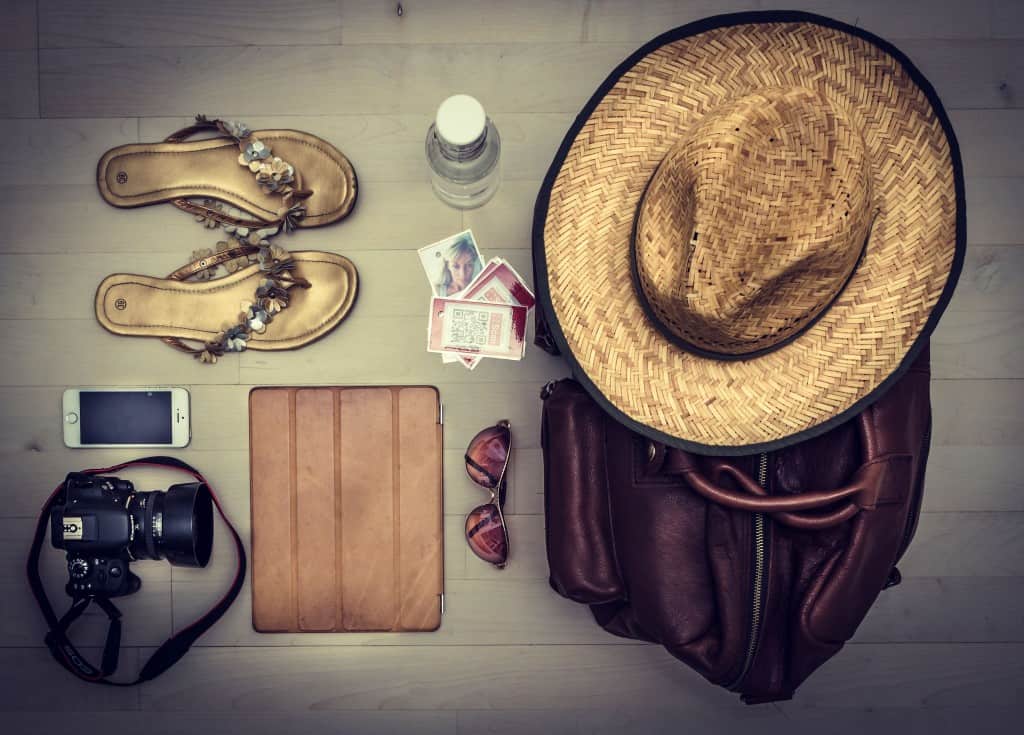
What to Bring to Cuba: The Ultimate Cuba Packing List (2024 Update)
Other stories.
- Skip to main content
- Skip to "About this site"
Language selection
Search travel.gc.ca.
Help us to improve our website. Take our survey !
COVID-19: travel health notice for all travellers
Cuba travel advice
Latest updates: The Need help? section was updated.
Last updated: March 25, 2024 10:25 ET
On this page
Safety and security, entry and exit requirements, laws and culture, natural disasters and climate, cuba - exercise a high degree of caution.
Exercise a high degree of caution in Cuba due to shortages of basic necessities including food, medicine and fuel.
Resort areas - Take normal security precautions
- Cayo Largo del Sur
- Cayo Santa Maria
Guardalavaca
Back to top
Petty crime
Petty crime, such as pickpocketing and purse snatching, occurs.
Theft generally occurs in crowded places such as:
- tourist areas
- public buses
- night clubs
It can also occur in isolated areas.
Theft from hotel rooms, particularly in private accommodations ( casas particulares ), and from cars is common.
- Ensure that your personal belongings, including your passport and other travel documents, are secure at all times
- Don’t pack valuables in your checked luggage
- Avoid showing signs of affluence
- Keep electronic devices out of sight
- Carry valid identification at all times
- Keep a digital and a hard copy of your ID and travel documents
- Avoid carrying large amounts of cash
- Never leave belongings unattended in a vehicle, even in the trunk
Violent crime
Incidents of violent crime are not frequent, but assaults may occur. They mainly occur during a burglary or robbery.
- Stay in accommodations with good security
- Keep your windows and doors locked at all times
- If threatened by robbers, don't resist
Credit card and ATM fraud may occur.
Be cautious when using debit or credit cards:
- pay careful attention when your cards are being handled by others
- use ATMs located in well-lit public areas or inside a bank or business
- avoid using card readers with an irregular or unusual feature
- cover the keypad with one hand when entering your PIN
- check for any unauthorized transactions on your account statements
Some businesses may try to charge exorbitant prices, namely taxis and classic car rentals. Disputes about overcharging may lead to violence.
- Always confirm prices before consuming or taking up a service
- Avoid running a tab
- Avoid leaving your credit card with bar or restaurant staff
- Check your bill to make sure it’s exact
Some hustlers specialize in defrauding tourists. Most of them speak some English or French and go out of their way to appear friendly. They may offer to serve as tour guides or to facilitate the purchase of cigars. Some have used violence in their efforts to steal tourists.
Fraudulent tour agents and taxi drivers also operate throughout the country, including at Havana’s international airport. Thefts of luggage from taxi trunks have occurred.
In bars, sex workers, including minors, may be very persistent and intrusive with tourists who refuse their advances. Foreigners, including Canadians, have been the victim of theft after engaging in sexual relations, and some of them have faced child sex accusations.
- Use reputable tour operators and registered taxis only
- Avoid independent street vendors
- Be wary of strangers who seem too friendly
Overseas fraud
Cuba faces chronic and severe shortages of basic necessities, including:
- bottled water
- public water supply
- hard-currency
Fuel shortages are currently critical and affect a wide range of services. Travelling across the island is extremely challenging. Public transportation services, including taxis, are often disrupted, leaving tourists with few options to travel. Some travellers have been temporarily stranded with a rental car. Intermittent shortages of tap water provided by municipalities happen, including in Havana and in resorts.
Hotels and resorts, that often use generators during power outages, may not be able to maintain their services. Fuel shortages may also affect government services.
Local authorities enforce the rationing of food and medications, which could also affect travellers.
Shortages may lead to disruptions to other essential services. There are often long line-ups at gas stations that have led to altercations.
- Plan accordingly
- Bring some basic necessities with you such as toiletries and medication
- Keep a supply of water, food and fuel on hand
- Make sure you always have access to a complete emergency kit
Power outages
Power outages occur regularly outside of Havana and touristic areas.
Obtaining services during an outage is challenging.
Women’s safety
Women travelling alone may be subject to some forms of sexual harassment
Incidents of sexual assault against Canadian women have occurred, including at beach resorts.
If you’re the victim of a sexual assault, you should report it immediately to the nearest Canadian consulate or embassy and seek medical assistance. You should also report the incident to Cuban authorities and ensure that local police provide you with a Comprobante de Denuncia. This document confirms that a report has been filed.
A criminal investigation will likely not be possible if no formal complaint is made to Cuban authorities before you depart the country.
Police officers may speak only Spanish.
Advice for women travellers
Spiked food and drinks
Snacks, beverages, gum and cigarettes may contain drugs that could put you at risk of sexual assault and robbery.
- Be wary of accepting these items from new acquaintances
- Never leave food or drinks unattended or in the care of strangers
Telecommunications
The telecommunications network in Cuba is poor. Connections are unreliable and may be intermittent.
Some Canadian cell phones may not work, even in large cities. Internet access is limited across the island.
Local authorities control telecommunications. They may block access to mobile phone and Internet in case of civil unrest or before demonstrations.
- Don’t rely on your mobile phone for emergencies, especially outside major cities
- Subscribe to and install a VPN service before leaving Canada
- Avoid travelling alone
- Inform a family member or friend of your itinerary
Online transactions
Online banking or shopping may be challenging in Cuba, if at all possible. Most Cuban websites are unsecure. Many are inaccessible.
Some travellers, who bought their travel package online on a travel website in Canada, found out on arrival in Cuba that their hotel received no reservation or payment.
- Avoid online shopping
- Check with the hotel if they accept online reservations and payments if you plan to book online
Demonstrations
Demonstrations sometimes occur, even if taking part in them may be illegal. Local authorities will break up political demonstrations or gatherings not sanctioned by the government. They may also block access to the Internet, including social media, without notice.
Even peaceful demonstrations can turn violent at any time. They can also lead to disruptions to traffic, public transportation.
- Don’t participate in demonstrations
- Avoid areas where demonstrations and large gatherings are taking place
- Follow the instructions of local authorities
- Monitor local media for information on ongoing demonstrations
Mass gatherings (large-scale events)
Water activities
Rescue services may not be consistent with international standards. Tidal changes can cause powerful currents, and riptides are common. Not all beaches have lifeguards or warning flags to warn of hazardous conditions.
- Never swim alone or after hours
- Don’t swim outside marked areas
- Monitor weather warnings
- Avoid visiting beaches or coastal areas during periods of severe weather warnings
- Don’t dive into unknown water, as hidden rocks or shallow depths can cause serious injury or death
- Consult residents and tour operators for information on possible hazards and safe swimming areas
Tour operators and diving centres may not adhere to international standards.
If you undertake adventure sports, such as diving:
- choose a reputable company that has insurance
- ensure that your travel insurance covers the recreational activities you choose
- don’t use the equipment if you have any doubts about its safety
Recreational boating
If you are planning to go boating:
- know the navigation rules
- make sure life jackets are available for all passengers
- follow safe practices for all water activities such as jet-skiing, water-skiing or fishing
- don’t overload your boat capacity
- carry a VHF marine radio that will generate your position in case of emergency
- be prepared for emergencies
Water safety abroad
Road safety
Road safety standards are poor throughout the country. Accidents causing fatalities are common.
Road conditions
Road conditions are poor throughout the island, with the exception of the Central Highway, which runs west to east across the country. Driving may be dangerous due to:
- poorly maintained roads
- lack of signage
- Inadequate lighting
- roaming livestock
- horse-drawn carts
- pedestrians
- slow-moving traffic
Most Cuban cars are old and in poor condition. They often lack standard safety equipment. Some cars and most bicycles don’t have functioning lights.
Driving habits
Some drivers don’t respect traffic laws. Many of them, driving an electric vehicle for which licence and registration are not required, are inexperienced and unqualified. Drinking and driving is also common.
If you choose to drive in Cuba:
- do so defensively at all times
- avoid travelling at night
- travel in groups when possible
- never pick up hitchhikers, who have been known to assault drivers
Public transportation
City buses are scarce, overcrowded and poorly maintained. Bus service is not reliable.
Incidents of pickpocketing are frequent.
Tour companies offer good bus service between airports and the all-inclusive resorts. Buses used for organized day trips from hotels are usually in good condition.
Official taxis are generally reliable.
Old-model private vehicles offered as taxis are not equipped with standard safety features. They have no insurance coverage for passengers in case of an accident.
- Use only registered taxis
- Avoid flagging a taxi down on the street
- Never share a taxi with strangers
- Agree on a fare before departure, as taxis are not equipped with meters
The rail network is comprehensive, connecting most of the island, but it’s unreliable and slow. Train service is limited to Cuban nationals only.
Health incidents
The Government of Canada continues to investigate the potential causes of unexplained health incidents reported by some Canadian diplomatic staff and dependents posted to Havana.
There is no evidence that Canadian travellers to Cuba are at risk.
We do not make assessments on the compliance of foreign domestic airlines with international safety standards.
Information about foreign domestic airlines
Every country or territory decides who can enter or exit through its borders. The Government of Canada cannot intervene on your behalf if you do not meet your destination’s entry or exit requirements.
We have obtained the information on this page from the Cuban authorities. It can, however, change at any time.
Verify this information with the Foreign Representatives in Canada .
Entry requirements vary depending on the type of passport you use for travel.
Before you travel, check with your transportation company about passport requirements. Its rules on passport validity may be more stringent than the country’s entry rules.
Regular Canadian passport
Your passport must be valid for the expected duration of your stay in Cuba.
Passport for official travel
Different entry rules may apply.
Official travel
Passport with “X” gender identifier
While the Government of Canada issues passports with an “X” gender identifier, it cannot guarantee your entry or transit through other countries. You might face entry restrictions in countries that do not recognize the “X” gender identifier. Before you leave, check with the closest foreign representative for your destination.
Other travel documents
Different entry rules may apply when travelling with a temporary passport or an emergency travel document. Before you leave, check with the closest foreign representative for your destination.
Useful links
- Foreign Representatives in Canada
- Canadian passports
Tourist visa: required Family visa: required Business visa: required
Tourist card
Canadian tourists travelling to Cuba need a visa, known as tourist card. The tourist card allows you to stay in Cuba for up to 90 days. The tourist card is generally included in holiday packages provided by tour operators or airlines providing direct flights from Canada. If you go to Cuba on your own or transit via another country, you are responsible for obtaining the tourist card from a Cuban government office in Canada. You may also buy it at some airports in Canada and in the United States.
Length of stay
As a Canadian tourist, you may stay in Cuba for up to 6 months.
However, you must obtain an extension of stay if you intend to stay longer than the initial 90-day period allowed by the standard tourist card.
D’Viajeros traveller information portal – Government of Cuba
Arrival form
You must provide information on your arrival in Cuba via an online form within 72 hours before entering the country.
Once done, you will receive a QR code by email.
You must show an electronic or printed version of the QR code to authorities upon arrival.
Health insurance
You must show proof of valid health insurance to enter Cuba.
All health insurance policies are recognized in Cuba, except those issued by U.S. insurance companies. However, the Cuban immigration authorities will decide which proof of health insurance is acceptable.
Proof of health insurance may be:
- an insurance policy
- an insurance certificate
- a Canadian provincial health insurance card
If you don’t have proof of health insurance or if the proof you present doesn’t satisfy the Cuban immigration authorities, you may have to obtain health insurance from a Cuban insurance company upon arrival. This insurance may have limited coverage. Local authorities may refuse your entry to the country.
Canadian provincial health care coverage provides very limited coverage outside Canada. It won’t pay for medical bills up-front. It does not include air evacuation, and neither does Cuban health insurance.
Cuban authorities won’t let you leave the country with outstanding medical bills, which are payable by credit card only. You will need to remain in Cuba until all debts are paid.
- Make sure you purchase the best health insurance you can afford
- Ensure the insurance includes medical evacuation and hospital stays
More on Travel insurance
Other entry requirements
Customs officials will ask you to show them:
- a return or onward ticket
- proof of sufficient funds to cover your stay
- proof that you have a place to stay if arriving with “air only” tickets
Dual citizenship
If you’re both a Canadian and Cuban citizen, you must:
- present your valid Cuban passport to the immigration authorities to enter Cuba
- have a valid Canadian passport to return to Canada
If you were born in Cuba, you should contact a Cuban government office in Canada before you leave to ensure compliance with Cuban regulations, regardless of your current citizenship. Failure to do so may result in your being refused entry into Cuba or being detained upon entry.
Canadian permanent residents
You will not be able to leave Cuba if you are a Canadian permanent resident and are without a valid permanent resident card. If your card is lost or stolen, you must contact the Canadian Embassy in Havana to obtain a travel document that will allow you to leave the country. This procedure can take up to 10 working days. Once the document is ready, you'll need to make an appointment with the immigration section of the Canadian Embassy in Havana to collect it before returning to Canada.
Permanent resident travel document: How to apply
Health screening
You may be subjected to a medical screening or interrogation by public health authorities when you enter or exit Cuba, or when reporting for domestic flights.
You may be subject to a mandatory quarantine for medical observation for up to 7 days if local authorities believe that:
- you have come in contact with a suspected carrier of one of these viruses
- you’re arriving from a country with a known epidemic
Children and travel
- Travelling with children
Yellow fever
Learn about potential entry requirements related to yellow fever (vaccines section).
Relevant Travel Health Notices
- Global Measles Notice - 13 March, 2024
- Zika virus: Advice for travellers - 31 August, 2023
- COVID-19 and International Travel - 13 March, 2024
This section contains information on possible health risks and restrictions regularly found or ongoing in the destination. Follow this advice to lower your risk of becoming ill while travelling. Not all risks are listed below.
Consult a health care professional or visit a travel health clinic preferably 6 weeks before you travel to get personalized health advice and recommendations.
Routine vaccines
Be sure that your routine vaccinations , as per your province or territory , are up-to-date before travelling, regardless of your destination.
Some of these vaccinations include measles-mumps-rubella (MMR), diphtheria, tetanus, pertussis, polio, varicella (chickenpox), influenza and others.
Pre-travel vaccines and medications
You may be at risk for preventable diseases while travelling in this destination. Talk to a travel health professional about which medications or vaccines may be right for you, based on your destination and itinerary.
Yellow fever is a disease caused by a flavivirus from the bite of an infected mosquito.
Travellers get vaccinated either because it is required to enter a country or because it is recommended for their protection.
- There is no risk of yellow fever in this country.
Country Entry Requirement*
- Proof of vaccination is required if you are coming from or have transited through an airport of a country where yellow fever occurs.
Recommendation
- Vaccination is not recommended.
- Discuss travel plans, activities, and destinations with a health care professional.
- Contact a designated Yellow Fever Vaccination Centre well in advance of your trip to arrange for vaccination.
About Yellow Fever
Yellow Fever Vaccination Centres in Canada * It is important to note that country entry requirements may not reflect your risk of yellow fever at your destination. It is recommended that you contact the nearest diplomatic or consular office of the destination(s) you will be visiting to verify any additional entry requirements.
There is a risk of hepatitis A in this destination. It is a disease of the liver. People can get hepatitis A if they ingest contaminated food or water, eat foods prepared by an infectious person, or if they have close physical contact (such as oral-anal sex) with an infectious person, although casual contact among people does not spread the virus.
Practise safe food and water precautions and wash your hands often. Vaccination is recommended for all travellers to areas where hepatitis A is present.
Measles is a highly contagious viral disease. It can spread quickly from person to person by direct contact and through droplets in the air.
Anyone who is not protected against measles is at risk of being infected with it when travelling internationally.
Regardless of where you are going, talk to a health care professional before travelling to make sure you are fully protected against measles.
Hepatitis B is a risk in every destination. It is a viral liver disease that is easily transmitted from one person to another through exposure to blood and body fluids containing the hepatitis B virus. Travellers who may be exposed to blood or other bodily fluids (e.g., through sexual contact, medical treatment, sharing needles, tattooing, acupuncture or occupational exposure) are at higher risk of getting hepatitis B.
Hepatitis B vaccination is recommended for all travellers. Prevent hepatitis B infection by practicing safe sex, only using new and sterile drug equipment, and only getting tattoos and piercings in settings that follow public health regulations and standards.
The best way to protect yourself from seasonal influenza (flu) is to get vaccinated every year. Get the flu shot at least 2 weeks before travelling.
The flu occurs worldwide.
- In the Northern Hemisphere, the flu season usually runs from November to April.
- In the Southern Hemisphere, the flu season usually runs between April and October.
- In the tropics, there is flu activity year round.
The flu vaccine available in one hemisphere may only offer partial protection against the flu in the other hemisphere.
The flu virus spreads from person to person when they cough or sneeze or by touching objects and surfaces that have been contaminated with the virus. Clean your hands often and wear a mask if you have a fever or respiratory symptoms.
In this destination, rabies is carried by dogs and some wildlife, including bats. Rabies is a deadly disease that spreads to humans primarily through bites or scratches from an infected animal. While travelling, take precautions , including keeping your distance from animals (including free-roaming dogs), and closely supervising children.
If you are bitten or scratched by an animal while travelling, immediately wash the wound with soap and clean water and see a health care professional. Rabies treatment is often available in this destination.
Before travel, discuss rabies vaccination with a health care professional. It may be recommended for travellers who are at high risk of exposure (e.g., occupational risk such as veterinarians and wildlife workers, children, adventure travellers and spelunkers, and others in close contact with animals).
Coronavirus disease (COVID-19) is an infectious viral disease. It can spread from person to person by direct contact and through droplets in the air.
It is recommended that all eligible travellers complete a COVID-19 vaccine series along with any additional recommended doses in Canada before travelling. Evidence shows that vaccines are very effective at preventing severe illness, hospitalization and death from COVID-19. While vaccination provides better protection against serious illness, you may still be at risk of infection from the virus that causes COVID-19. Anyone who has not completed a vaccine series is at increased risk of being infected with the virus that causes COVID-19 and is at greater risk for severe disease when travelling internationally.
Before travelling, verify your destination’s COVID-19 vaccination entry/exit requirements. Regardless of where you are going, talk to a health care professional before travelling to make sure you are adequately protected against COVID-19.
Safe food and water precautions
Many illnesses can be caused by eating food or drinking beverages contaminated by bacteria, parasites, toxins, or viruses, or by swimming or bathing in contaminated water.
- Learn more about food and water precautions to take to avoid getting sick by visiting our eat and drink safely abroad page. Remember: Boil it, cook it, peel it, or leave it!
- Avoid getting water into your eyes, mouth or nose when swimming or participating in activities in freshwater (streams, canals, lakes), particularly after flooding or heavy rain. Water may look clean but could still be polluted or contaminated.
- Avoid inhaling or swallowing water while bathing, showering, or swimming in pools or hot tubs.
Travellers' diarrhea is the most common illness affecting travellers. It is spread from eating or drinking contaminated food or water.
Risk of developing travellers' diarrhea increases when travelling in regions with poor standards of hygiene and sanitation. Practise safe food and water precautions.
The most important treatment for travellers' diarrhea is rehydration (drinking lots of fluids). Carry oral rehydration salts when travelling.
Typhoid is a bacterial infection spread by contaminated food or water. Risk is higher among children, travellers going to rural areas, travellers visiting friends and relatives or those travelling for a long period of time.
Travellers visiting regions with a risk of typhoid, especially those exposed to places with poor sanitation, should speak to a health care professional about vaccination.
Salmonellosis is a common illness among travellers to this country. It can be spread through contaminated food or beverages, such as raw or undercooked poultry and eggs, as well as fruits or vegetables.
Practice safe food and water precautions . This includes only eating food that is properly cooked and still hot when served.
Pregnant women, children under 5 years of age, those over 60 years of age, and those with weakened immune systems are at greater risk of becoming seriously ill.
Most people recover on their own without medical treatment and from proper rehydration (drinking lots of fluids).
- Carry oral rehydration salts when travelling.
Travellers with severe symptoms should consult a health care professional as soon as possible.
Insect bite prevention
Many diseases are spread by the bites of infected insects such as mosquitoes, ticks, fleas or flies. When travelling to areas where infected insects may be present:
- Use insect repellent (bug spray) on exposed skin
- Cover up with light-coloured, loose clothes made of tightly woven materials such as nylon or polyester
- Minimize exposure to insects
- Use mosquito netting when sleeping outdoors or in buildings that are not fully enclosed
To learn more about how you can reduce your risk of infection and disease caused by bites, both at home and abroad, visit our insect bite prevention page.
Find out what types of insects are present where you’re travelling, when they’re most active, and the symptoms of the diseases they spread.
There is a risk of chikungunya in this country. The risk may vary between regions of a country. Chikungunya is a virus spread through the bite of an infected mosquito. Chikungunya can cause a viral disease that typically causes fever and pain in the joints. In some cases, the joint pain can be severe and last for months or years.
Protect yourself from mosquito bites at all times. There is no vaccine available for chikungunya.
- In this country, dengue is a risk to travellers. It is a viral disease spread to humans by mosquito bites.
- Dengue can cause flu-like symptoms. In some cases, it can lead to severe dengue, which can be fatal.
- The level of risk of dengue changes seasonally, and varies from year to year. The level of risk also varies between regions in a country and can depend on the elevation in the region.
- Mosquitoes carrying dengue typically bite during the daytime, particularly around sunrise and sunset.
- Protect yourself from mosquito bites . There is no vaccine or medication that protects against dengue.
Zika virus is a risk in this country.
Zika virus is primarily spread through the bite of an infected mosquito. It can also be sexually transmitted. Zika virus can cause serious birth defects.
During your trip:
- Prevent mosquito bites at all times.
- Use condoms correctly or avoid sexual contact, particularly if you are pregnant.
If you are pregnant or planning a pregnancy, you should discuss the potential risks of travelling to this destination with your health care provider. You may choose to avoid or postpone travel.
For more information, see Zika virus: Pregnant or planning a pregnancy.
Animal precautions
Some infections, such as rabies and influenza, can be shared between humans and animals. Certain types of activities may increase your chance of contact with animals, such as travelling in rural or forested areas, camping, hiking, and visiting wet markets (places where live animals are slaughtered and sold) or caves.
Travellers are cautioned to avoid contact with animals, including dogs, livestock (pigs, cows), monkeys, snakes, rodents, birds, and bats, and to avoid eating undercooked wild game.
Closely supervise children, as they are more likely to come in contact with animals.
Person-to-person infections
Stay home if you’re sick and practise proper cough and sneeze etiquette , which includes coughing or sneezing into a tissue or the bend of your arm, not your hand. Reduce your risk of colds, the flu and other illnesses by:
- washing your hands often
- avoiding or limiting the amount of time spent in closed spaces, crowded places, or at large-scale events (concerts, sporting events, rallies)
- avoiding close physical contact with people who may be showing symptoms of illness
Sexually transmitted infections (STIs) , HIV , and mpox are spread through blood and bodily fluids; use condoms, practise safe sex, and limit your number of sexual partners. Check with your local public health authority pre-travel to determine your eligibility for mpox vaccine.
Medical services and facilities
Good health care is limited in availability.
The health system is government-owned. The Cuban government operates hospitals and clinics throughout the island.
Medical professionals are generally adequately trained. However, facilities are in poor condition. They lack basic drugs, medical supplies and equipment. Hygiene practices may be inadequate.
Medical services are also available at most hotels and international clinics located in resort areas, where doctors and nurses provide initial emergency medical care reserved for foreigners. Health care provided in those clinics is usually better than services offered in public facilities.
Mental health care facilities are extremely limited. There are no hotlines available for this type of care in the country.
Emergency and ambulance services are limited. Response times may be slow, especially outside tourist areas.
Make sure you get travel insurance that includes coverage for medical evacuation and hospital stays.
Travel health and safety
Many prescription medications may not be available in Cuba.
If you take prescription medication, you’re responsible for determining their legality in the country.
- Bring enough of your medication with you
- Always keep your medication in the original container
- Pack your medication in your carry-on luggage
- Carry a paper and an electronic copy of your prescriptions
Cuba faces severe medicine shortages, including antibiotics and common pain killers. In addition of your prescription medication, you should also bring your own basic medicine in sufficient quantities to last beyond the length of your intended stay.
Public health authorities implement insect control measures including periodic fumigation and aerial spraying.
- Consult your doctor before traveling to see if the situation could affect you, especially if you suffer from respiratory ailments
- Stay away from a nearby fumigation process
Death abroad
Standards of mortuary services in Cuba differ from those in Canada. Cultural and religious beliefs are not taken into consideration. Autopsies are mandatory.
There is one funeral home and one morgue in the country which cater to foreigners. Both are located in Havana. Only these facilities have the authorization to issue appropriate documentation to accompany human remains. Timelines for the repatriation of human remains are long and costly.
The capacity for refrigeration is limited, as well as the availability of coffins and urns. Embalming materials and techniques are unlike those in Canada. Embalming may not be an option in some circumstances.
Ensure your insurance includes coverage for the repatriation of human remains.
Death Abroad Factsheet
Keep in Mind...
The decision to travel is the sole responsibility of the traveller. The traveller is also responsible for his or her own personal safety.
Be prepared. Do not expect medical services to be the same as in Canada. Pack a travel health kit , especially if you will be travelling away from major city centres.
You must abide by local laws.
Learn about what you should do and how we can help if you are arrested or detained abroad .
Transfer to a Canadian prison
Canada and Cuba accede the Treaty between the Government of Canada and the Government of the Republic of Cuba on the Serving of Penal Sentences. This enables a Canadian imprisoned in Cuba to request a transfer to a Canadian prison to complete a sentence. The transfer requires the agreement of both Canadian and Cuban authorities. This process can take a long time, and there is no guarantee that the transfer will be approved by either or both sides.
Cuban criminal justice
The criminal justice system in Cuba differs significantly from that in Canada. Charges are not laid until the investigation is complete. If you’re arrested in Cuba, you will likely be detained during the entire period of investigation. You should expect long delays to resolve your case. You will not be allowed to leave the country during this period.
Cuba’s constitution allows the death penalty, but since 2003, the country has effectively had a moratorium on carrying out death sentences.
Investments
Private property rights in Cuba are strictly controlled. Only Cubans and permanent residents can buy a property in Cuba or register a privately owned vehicle. Be wary of strangers or acquaintances offering to purchase these items on your behalf. If you plan on making investments in Cuba, seek legal advice in Canada and Cuba. Do so before making commitments. Related disputes could take time and be costly to resolve.
Penalties for possession, use or trafficking of illegal drugs are severe. Convicted offenders can expect lengthy prison sentences.
- Pack your own luggage and monitor it closely at all times
- Don’t transport other people’s packages, bags or suitcases
Drugs, alcohol and travel
Child sex tourism
It's a serious criminal offence to have sex with minors in Cuba.
Local authorities are actively working to prevent child sex tourism. Tourists, including Canadians, have been convicted of offences related to the corruption of minors aged 16 and under.
Prison sentences for this type of crime range from 7 to 25 years. Release on bail before trial is unlikely.
Child Sex Tourism: It’s a Crime
To get married in Cuba, you must provide several documents including:
- your birth certificate
- a copy of your passport
- your decree absolute certificate if divorced
- a death certificate for your spouse and a marriage certificate if widowed
- an affidavit of your single status if you have never been married before
All documents must be translated into Spanish, certified, authenticated and legalised by the Embassy of Cuba in Canada.
Consult the Embassy of Cuba in Canada if you wish to marry in Cuba, including to a Cuban national.
- Foreign diplomatic missions and consulates in Canada
- Marriage overseas factsheet
Drones are prohibited.
They will be confiscated by the authorities upon entry.
Photography
Professional photographers require a visa to work in Cuba. They may also need a permit to import their equipment.
It’s forbidden to photograph, including with drones:
- military and police installations or personnel
- harbour, rail and airport facilities
Military zones and any other restricted or heavily guarded areas are not always identified.
Identification
Authorities may request to see your ID at any time.
- Keep a photocopy of your passport in case it’s lost or seized
- Keep a digital copy of your ID and travel documents
Dual citizenship is not legally recognized in Cuba.
If local authorities consider you a citizen of Cuba, they may refuse to grant you access to Canadian consular services. This will prevent us from providing you with those services.
Travellers with dual citizenship
International Child Abduction
The Hague Convention on the Civil Aspects of International Child Abduction is an international treaty. It can help parents with the return of children who have been removed to or retained in certain countries in violation of custody rights. It does not apply between Canada and Cuba.
If your child was wrongfully taken to, or is being held in Cuba by an abducting parent:
- act as quickly as you can
- consult a lawyer in Canada and in Cuba to explore all the legal options for the return of your child
- report the situation to the nearest Canadian government office abroad or to the Vulnerable Children’s Consular Unit at Global Affairs Canada by calling the Emergency Watch and Response Centre.
If your child was removed from a country other than Canada, consult a lawyer to determine if The Hague Convention applies.
Be aware that Canadian consular officials cannot interfere in private legal matters or in another country’s judicial affairs.
- International Child Abduction: A Guidebook for Left-Behind Parents
- Canadian embassies and consulates by destination
- Emergency Watch and Response Centre
Imports and exports
Personal effects and medicine.
Tourists are allowed to enter Cuba with personal effects but items entering the country for donations may be subject to import rules. They could be seized and taxed in accordance with local legislation. This includes:
- new or used material goods
- personal care products
- medications
Cuban customs officials have the authority to decide what they deem to be for the tourist's personal use. They may apply steep tariffs for personal baggage exceeding the allowable weight.
You may export:
- up to 20 cigars without documentation
- up to 50 cigars if they are in their original container, closed and sealed with the official hologram
If exceeding these amounts, you must provide a guarantee of origin certificate.
Failure to comply with this regulation will lead to the seizure of the cigars without compensation.
Art objects
Art objects, including artifacts and paintings purchased in Cuba, must be accompanied by an export permit. It’s usually provided by state-owned galleries.
In the absence of such a permit, items must be registered with the Registro Nacional de Bienes Culturales.
Ministry of Culture – Government of Cuba
Electronic devices
Electronic devices with GPS technology may be confiscated upon entry and returned upon departure.
Satellite telephones are forbidden.
Electronic cigarettes and personal vaporizers
You cannot bring electronic cigarettes or personal vaporizers to Cuba.
Customs officials will seize these items upon arrival.
Black market
Street vendors may offer you black-market goods, such as cigars, or ask to change dollars for Cuban currency.
Engaging in black-market transactions is illegal and can lead to difficulties with the Cuban authorities.
Cuban Customs Administration – Government of Cuba
Boat traffic
The U.S. government closely monitors boat traffic in the Straits of Florida. It will seize any vessel not bearing a licence from the Office of Foreign Assets Control (OFAC) if it believes it’s headed for Cuba.
You’re subject to these measures if you dock your Canadian-registered boat in Florida. You’ll be exempted if you are simply en route to Cuba via the U.S.
If travelling by boat to Cuba from the US:
- Make sure to know the regulation related to docking and port controls
- Expect thorough search and interrogations
You should carry an international driving permit.
International Driving Permit
Traffic accidents
Traffic accidents have led to arrest and detentions of Canadians in the past.
Accidents resulting in death or injury are treated as crimes. The onus is on the driver to prove innocence. If you’re found to bear responsibility in a traffic accident resulting in serious injury or death, you may face up to 10 years in prison.
If you’re involved in an accident:
- don’t leave the scene
- don’t move your vehicle
- call the police
While car insurance is mandatory for foreign drivers and foreign-registered vehicles, it's not for Cuban citizens. As a result, most local drivers don't carry a car insurance. You shouldn’t expect compensation for vehicle damage or personal injury from a Cuban driver following a car accident.
Vehicle rentals
Car insurance coverage in Cuba differs from that in Canada.
Rental agencies are government-controlled. If you’re found to be at fault in an accident, the rental agency will nullify your coverage and seek compensation to cover the cost of repairs.
Cuban authorities can prohibit you from leaving the country unless the rental agency receives payment or until all claims associated with an accident are settled.
Contract agreements don’t cover occasional drivers. As a result, the signatory is responsible for all people driving the vehicle.
- Be cautious if you rent a vehicle in Cuba
- Avoid renting a scooter; thieves target them and you may be responsible for the cost of its replacement
- Make sure to obtain a receipt when returning a rental vehicle
The currency of Cuba is the Cuban peso (CUP).
Credit cards issued by U.S. financial institutions or affiliated with U.S. banks are not accepted in Cuba.
Canadian credit cards are increasingly accepted at restaurants and hotels. However, the system is unreliable and bank cards may not work or may stop working without notice.
ATMs are rare and also unreliable. Each withdrawal is limited to 5 000 CUP, when possible.
You may obtain credit card cash advances at banks, hotels or a state-run exchange bureau, but in CUP only.
When travelling to Cuba, you should plan to bring enough currency to cover the duration of your stay. You should also plan for small bank notes to facilitate daily transactions such as, street food, taxis and tips.
You can easily exchange Canadian and American dollars, as well as euros for CUP at:
- the money exchange bureaus in Cuba’s international airports
- major hotels
- official exchange bureaus
It’s illegal to change money on the street or anywhere else other than authorized entities.
You cannot go through Cuban customs with more than 5 000 CUP.
Hurricane season
Hurricanes usually occur from mid-May to the end of November. During this period, even small tropical storms can quickly develop into major hurricanes.
These severe storms can put you at risk and hamper the provision of essential services.
If you decide to travel to a coastal area during the hurricane season:
- know that you expose yourself to serious safety risks
- be prepared to change your travel plans on short notice, including cutting short or cancelling your trip
- stay informed of the latest regional weather forecasts
- carry emergency contact information for your airline or tour operator
- follow the advice and instructions of local authorities
- Tornadoes, cyclones, hurricanes, typhoons and monsoons
- Large-scale emergencies abroad
- Active storm tracking and hurricane watches and warnings - United States’ National Hurricane Center
Rainy season
The rainy season extends from April to October.
Seasonal flooding can hamper overland travel and reduce the delivery of essential services. Roads may become impassable due to mudslides and landslides. Bridges, buildings, and infrastructure may be damaged.
Earthquakes
Cuba is located in an active seismic zone.
Earthquakes may occur. Even minor earthquakes can cause significant damage.
In the event of an earthquake:
- monitor local media to stay informed of the evolving situation
- follow the instructions of local authorities, including evacuation orders
- Earthquakes – What to Do?
- Latest earthquakes - U.S. Geological Survey
Local services
In case of emergency, dial:
- police: 106
- medical assistance: 104
- firefighters: 105
Consular assistance
For emergency consular assistance, call the Embassy of Canada to Cuba, in Havana, and follow the instructions. At any time, you may also contact the Emergency Watch and Response Centre in Ottawa.
The decision to travel is your choice and you are responsible for your personal safety abroad. We take the safety and security of Canadians abroad very seriously and provide credible and timely information in our Travel Advice to enable you to make well-informed decisions regarding your travel abroad.
The content on this page is provided for information only. While we make every effort to give you correct information, it is provided on an "as is" basis without warranty of any kind, expressed or implied. The Government of Canada does not assume responsibility and will not be liable for any damages in connection to the information provided.
If you need consular assistance while abroad, we will make every effort to help you. However, there may be constraints that will limit the ability of the Government of Canada to provide services.
Learn more about consular services .
Risk Levels
take normal security precautions.
Take similar precautions to those you would take in Canada.
Exercise a high degree of caution
There are certain safety and security concerns or the situation could change quickly. Be very cautious at all times, monitor local media and follow the instructions of local authorities.
IMPORTANT: The two levels below are official Government of Canada Travel Advisories and are issued when the safety and security of Canadians travelling or living in the country or region may be at risk.
Avoid non-essential travel
Your safety and security could be at risk. You should think about your need to travel to this country, territory or region based on family or business requirements, knowledge of or familiarity with the region, and other factors. If you are already there, think about whether you really need to be there. If you do not need to be there, you should think about leaving.
Avoid all travel
You should not travel to this country, territory or region. Your personal safety and security are at great risk. If you are already there, you should think about leaving if it is safe to do so.
- Français
- Português

LA HABANA, 28 DE ABRIL DE 2024
ÓRGANO OFICIAL DEL COMITÉ CENTRAL DEL PARTIDO COMUNISTA DE CUBA
ÚLTIMA ACTUALIZACIÓN
En Cuba, máximas autoridades internacionales del turismo
Fueron recibidos a su llegada por Juan Carlos García Granda, titular del Ministerio de Turismo,
Autor: Susana Antón Rodriguez | [email protected]
27 de abril de 2024 08:04:39

Este viernes arribaron a Cuba Zurab Polilikashvili, Secretario General de ONU Turismo y Gustavo Santos, director regional para las Américas, quienes asisten a la Mayor de las Antillas para participar en la 69 reunión de la Comisión Regional de ONU Turismo para las Américas.
Ambos fueron recibidos a su llegada por Juan Carlos García Granda, titular del Ministerio de Turismo, según informó en redes sociales el organismo cubano.
La 69 reunión de la Comisión Regional de ONU Turismo para las Américas tendrá lugar en Varadero el próximo 30 de abril, precedido por el seminario «Potenciando el desarrollo turístico a través de la innovación en el turismo comunitario».
En la cita, según señala ONU Turismo, se presentarán las tendencias de viaje con un enfoque en las Américas, la candidatura de Uruguay para establecer la sede del «Observatorio de Derecho del Turismo para América Latina y el Caribe» en Montevideo; así como los anuncios de la I Conferencia Regional sobre el Empoderamiento de las Mujeres en el Sector Turístico y el Seminario del Derecho del Turismo, entre otros temas.
De acuerdo con el propio organismo internacional, en 2023 el turismo internacional recuperó el 88% de los niveles prepandemia con un número estimado de 1.300 millones de llegadas internacionales, un 34% más que en 2022.
En las Américas, señalan, Centroamérica y el Caribe figuran entre las únicas cuatro subregiones a nivel mundial que excedieron los niveles prepandémicos de visitantes en 2023.

Mostrar respeto a los criterios en sus comentarios.
No ofender, ni usar frases vulgares y/o palabras obscenas., nos reservaremos el derecho de moderar aquellos comentarios que no cumplan con las reglas de uso., responder comentario.

¿Cuánto más debe esperar?

El hermano Obama

Vamos a salir de estas dificultades, como lo hemos hecho siempre, ¡combatiendo! (+ Video)

Código de las Familias

Disponible micrositio especial con toda la cobertura sobre el nuevo Código de las Familias
Este 25 de septiembre, en referendo popular, Cuba votará por un nuevo Código de las Familias
0 COMENTARIOS
Incendio en Supertanqueros

Disponible micrositio especial de Granma con toda la cobertura del incendio en Supertanqueros
No hay cobertura más desafiante, por su sensibilidad, que la de los hechos que implican peligro para la vida, o privan de ella. El 5 de agosto de 2022, al conocer por nuestro corresponsal en Matanzas sobre el incendio originado por una descarga eléctrica en la Base de Supertanqueros, abrimos uno de esos seguimientos informativos en los que nuestros periodistas suelen dejar el alma
7 COMENTARIOS

DIRECTORIO DE PRENSA:
Publicaciones en internet.
Juventud Rebelde | Trabajadores. | Cubadebate | ACN | Prensa Latina | Opciones | CubaSi | Cubahora | Cubaperiodistas | JIT
Bohemia | Cuba Socialista Mujeres | Tricontinental La Jiribilla | Alma Mater | Caimán Barbudo | Juventud Técnica | Pionero
TV Cubana | Radio Cubana | Radio Habana Cuba | Radio Progreso | Radio Rebelde | Radio Reloj | Radio Taino | Radio Musical Nacional
ENLACES DE INTERÉS
Partido Comunista de Cuba | Sitio oficial del Gobierno de la República de Cuba | Ministerio de Relaciones Exteriores | Aduana

GRANMA © 2018 | Fundado el 3 de octubre de 1965 | ISNN 0864-0424 | General Suárez y Territorial, Plaza de la Revolución, La Habana. Cuba | Teléfono: 881-3333
Watch CBS News
Top Cuban official says country open to more U.S. deportations, blames embargo for migrant exodus
By Camilo Montoya-Galvez
April 18, 2024 / 4:22 PM EDT / CBS News
Washington — Cuba's government is willing to accept more deportation flights from the U.S. of Cuban migrants, who have traveled to the southern border in record numbers over the past three years, a top Cuban official told CBS News in an exclusive interview.
After a two-year pause, the U.S. restarted deportation flights to the island last year. Since then, the U.S. has been sending one flight with Cuban deportees to Havana each month.
But in an interview with CBS News this week, Cuba's Deputy Foreign Minister Carlos Fernández de Cossío said Cuban officials are willing to accommodate more than one flight per month.
"We're open to having more" deportation flights, said Fernández de Cossío, who visited Washington this week to meet with Biden administration officials for the latest round of migration talks between the two countries.
Since the 1959 Cuban Revolution, the U.S. and Cuba have had a deeply contentious relationship. The Cold War-era rivals still bitterly disagree on many issues, from Cuba's human rights record and its ties to China and Russia to the decades-long American embargo on Cuban imports and exports.
But Washington and Havana have worked together on immigration, including by signing the 1994 U.S.-Cuba Migration Accords, which officials from both nations are discussing this week. The two countries' work on immigration has intensified in recent years amid the record arrival of hundreds of thousands of Cubans to the U.S.-Mexico border.
Since the start of fiscal year 2021, the U.S. has processed more than 450,000 Cuban migrants at the southern border, according to Customs and Border Protection data. The flow of Cuban migrants to the U.S. border has slowed since last year, when the Biden administration created programs that have allowed some Cubans to fly into the U.S. legally or appear at an official border crossing.
In the interview this week, Fernández de Cossío blamed the exodus from Cuba in recent years on the U.S. embargo and other American policies, including the 1960s Cuban Adjustment Act, which created a special pathway to permanent U.S. residency for certain Cuban migrants. Only Congress can change that law.
Fernández de Cossío said the U.S. is "aiming at destroying the Cuban economy" through its sanctions. He did not concede that economic mismanagement and repressive policies by Havana have also driven Cubans to flee the island, as the U.S. government has argued.
"You can speak about other factors, but if you have a consistent policy by the most powerful economy in the world to try to destroy the livelihood of a whole population, 11 million Cubans, it is logical to expect people, a segment of the population, to want to leave the country," he said.
In 2023, the U.S. Department of Homeland Security assessed that "Cuba's deteriorating economic conditions and political repression continue to increasingly drive Cubans out of their country."
Fernández de Cossío also cited the lack of some legal channels for Cuban citizens to come to the U.S. for illegal crossings along the southern border by Cubans.
He urged the State Department to resume the processing of tourist and short-term visas in Havana. The Biden administration restarted immigrant visa processing in Cuba, but short-term visa seekers in Cuba still have to travel to a third country to have their cases processed.
Fernández de Cossío said U.S. officials informed him they would resume full visa processing in Cuba in the future.
Representatives for the State Department did not respond to requests to comment on Fernández de Cossío's remarks.
Fernández de Cossío expressed some concern about additional U.S. sanctions if former President Donald Trump is elected in November. During Trump's tenure, the U.S. had a more aggressive stance towards Cuba, reversing the Obama administration's attempt to normalize relations with Havana.
"Of course we're concerned if there are additional economic measures [against] Cuba, regardless of who wins the election. The Biden administration has very faithfully applied the policies put in place by the Trump administration and added some," he said. "So we would not [be] surprised they would do it. It would be unfair, and we believe it would be immoral, but we have to acknowledge that would happen and [it] gives us room for concern."

Camilo Montoya-Galvez is the immigration reporter at CBS News. Based in Washington, he covers immigration policy and politics.
More from CBS News

Bernhard Langer, 66, to return to PGA Tour 3 months after tearing Achilles
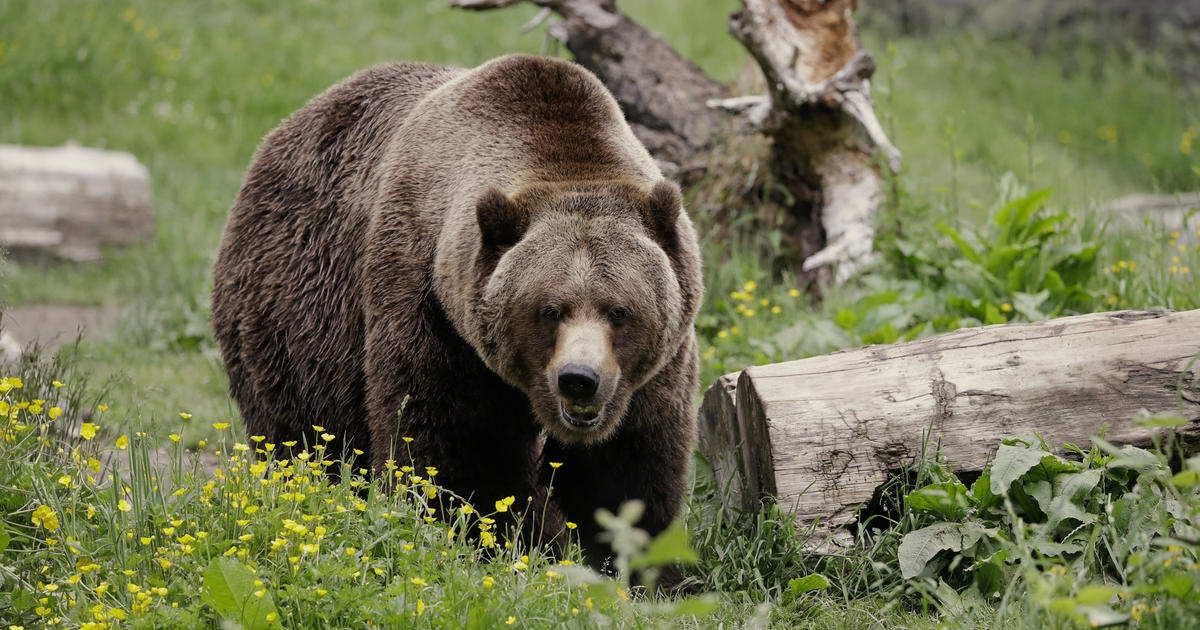
Grizzly bears to be restored to U.S. region where they were wiped out
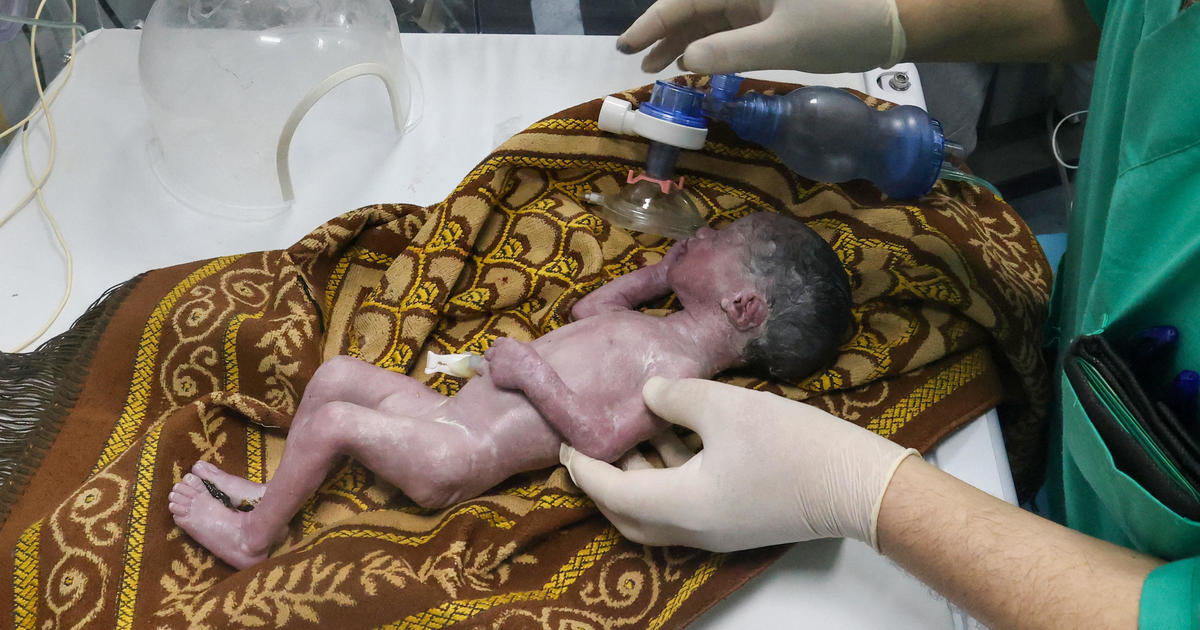
Baby girl saved from dying mother's womb dies just days later in Gaza

Attorneys for American imprisoned by Taliban file urgent petitions with U.N.

IMAGES
VIDEO
COMMENTS
The 12 categories of travel licenses for US citizens. US law states that US citizens can only travel to Cuba on a 'general license' based on one of 12 different approved categories, which include family visits, educational and religious activities, public performances and exhibitions, and the vague sounding 'support for the Cuban people.'Licenses are self-qualifying (there's no long ...
Cuba's official travel and tourist information web site. Everything about vacation in Cuba. Find inspiration and guides for your next trip to Cuba. ... More than you imagined. Plan your holiday to Cuba. See more Cuba Up-Close. Six Essential Tips for Your Trip to Cuba 2022. From alternative accommodation to bypassing the restrictive internet in ...
Getting WiFi in Cuba. If a travel guide says there are only one-hour WiFi cards, it is outdated. Now, you can access WiFi on a one-hour or a five-hour card. WiFi is now cheaper in Cuba—it was $5 USD per hour; now, it's $1 USD per hour. We only needed one 5-hour card per person for the whole week.
Call us in Washington, D.C. at 1-888-407-4747 (toll-free in the United States and Canada) or 1-202-501-4444 (from all other countries) from 8:00 a.m. to 8:00 p.m., Eastern Standard Time, Monday through Friday (except U.S. federal holidays). See the State Department's travel website for the Worldwide Caution and Travel Advisories.
The Biden administration is undoing some of President Donald Trump's restrictions on travel to Cuba — but some fine print is still not out. ... Updated June 2, 2022 at 6:10 p.m. EDT | Published ...
18. Bring mosquito repellent for the sandflies at the beaches. You might not think to bring mozzie repellent for the beach typically, but this is one of our top tips for travelling in Cuba. You'll find sandflies at the beach and protecting yourself against them will stop them ruining a relaxing day in the sun! 19.
Here are our top tips for any trip to Cuba: Ensure you're fully vaccinated because Cubans are. 💉 100% of the Cuban population is vaccinated ( 5 year olds and upwards ) and Cuba find the idea of refusing a Covid vaccination inexplicable. Keep up to date with entry requirements by checking the FCDO travel advice for Cuba here.
Cuba. The Caribbean's largest island, Cuba remains mysterious to many American travelers, as it was only after a diplomatic détente introduced in 2014 that permissible travel categories expanded significantly. Leisure travel for Americans remains prohibited, and U.S. citizens and residents must justify their trip under one of 12 reasons ...
15. Stay in casas particulares (private accommodations). This is a piece of Cuba travel advice you shouldn't ignore! Casas particulares are popular and highly authentic places to stay during your Cuba trip. A casa particular is similar to a bed-and-breakfast. Usually, it costs between 20-50 USD per night, making them much more affordable than resorts on the island.
We're José and Carley Rojas Avila, a Havana native and a serial expat turned travel writer. We're the creators of Home to Havana. We love Cuba and use our insider knowledge to help fellow travelers just like you discover all Cuba has to offer. Our ULTIMATE guide to travel to Cuba helps demystify Cuba travel. Written by locals, we share the ...
Cycle Cuba: West. Jonathan · Traveled March 2024. Intrepid is the tour company you want. Super professional and safe. Great itinerary and super communication. Fantastic value. Talented guides. Our trip leader Rainer Companioni is among the best in the business. Cannot recommend Intrepid highly enough. 5 stars.
Travel Advisory. January 5, 2024. Cuba - Level 2: Exercise Increased Caution. C. Reissued with updates to crime information. Exercise increased caution in Cuba due to crime. Country Summary: Petty crime is a threat for tourists in Cuba. Also, violent crime, including armed robbery and homicide, sometimes occurs in Cuba.
Vaccination Certificate - no longer required as of April 6, 2022 PCR Results - no longer required as of April 6, 2022 Passport Cuba QR Code. In Miami. I had a very short layover but it doesn't take much time. There is a Cuba Travel Services stand in the boarding area where they checked my visa and stamped by boarding pass "Cuba Ready".
A Taste of Cuba. of 19 reviews. Best price guaranteed. No booking fees. " Have just come back from a Taste of Cuba trip. What an amazing time we had, Rayselis the guide was ". Tour Type Small Group Tour. Activities Cultural, religious and historic sites & Natural landmarks sightseeing +1 more.
Cuba - Level 3 - Reconsider Travel. Reconsider travel to Cuba due to COVID-19.Exercise increased caution in Cuba due to demonstrable and sometimes debilitating injuries to members of our diplomatic community resulting in the drawdown of embassy staff. Read the Department of State's COVID-19 page before you plan any international travel. ...
However, Cuba's entry requirements and restrictions were very strict until November 2021. Rules changed again on 5th January 2022 when it became mandatory to be fully vaccinated against COVID-19 to travel to the country. This is an up to date list of all the documents that you will need to enter Cuba, including COVID-19 related ones:
Cuba is an archipelago made up of the largest island of the Antilles called Cuba, Isla de la Juventud (formerly called Isle of Pines), and another 4,195 cays, islets and adjacent islands. It is located in the Caribbean Sea (or Caribbean Sea), near the coast of the United States and Mexico. Its limits are to the north with the Strait of Florida ...
This video gives you all the tips and tricks for visiting Cuba. These are the points we wished we had known about before setting off on our trip to Cuba. Cub...
Warnings and insurance. Still current at: 27 April 2024. Updated: 19 January 2024. Latest update: This travel advice has been rewritten to make it easier to read and understand. The Foreign ...
If you are a US citizen, you can still visit Cuba in 2024. However, unlike your neighbors traveling from Canada, you will be subject to specific regulations from the US government. For example, doing "tourism," like staying at a resort on a Cuban beach, isn't allowed. Your trip must fall into one of 12 categories of authorized travel to Cuba.
Before you travel, check with your transportation company about passport requirements. Its rules on passport validity may be more stringent than the country's entry rules. Regular Canadian passport. Your passport must be valid for the expected duration of your stay in Cuba. Passport for official travel. Different entry rules may apply ...
Este viernes arribaron a Cuba Zurab Polilikashvili, Secretario General de ONU Turismo y Gustavo Santos, director regional para las Américas, quienes asisten a la Mayor de las Antillas para participar en la 69 reunión de la Comisión Regional de ONU Turismo para las Américas. ... un 34% más que en 2022. En las Américas, señalan ...
Top Cuban diplomat weighs in on immigration, Havana Syndrome and more 26:19. Washington — Cuba's government is willing to accept more deportation flights from the U.S. of Cuban migrants, who ...